
a treasure-trove of literature
treasure found hidden with no evidence of ownership
(and our other authors) or get HELP Reading, Downloading and Converting files)
or
SEARCH the entire site with Google Site Search
 |
Project Gutenberg
Australia a treasure-trove of literature treasure found hidden with no evidence of ownership |
BROWSE the site for other works by this author (and our other authors) or get HELP Reading, Downloading and Converting files) or SEARCH the entire site with Google Site Search |
Title: Oh, Shoot! Confessions of an Agitated Sportsman Author: Rex Beach * A Project Gutenberg of Australia eBook * eBook No.: 1800931h.html Language: English Date first posted: October 2018 Most recent update: October 2018 This eBook was produced by: Walter Moore Project Gutenberg of Australia eBooks are created from printed editions which are in the public domain in Australia, unless a copyright notice is included. We do NOT keep any eBooks in compliance with a particular paper edition. Copyright laws are changing all over the world. Be sure to check the copyright laws for your country before downloading or redistributing this file. This eBook is made available at no cost and with almost no restrictions whatsoever. You may copy it, give it away or re-use it under the terms of the Project Gutenberg Australia Licence which may be viewed online.
GO TO Project Gutenberg Australia HOME PAGE


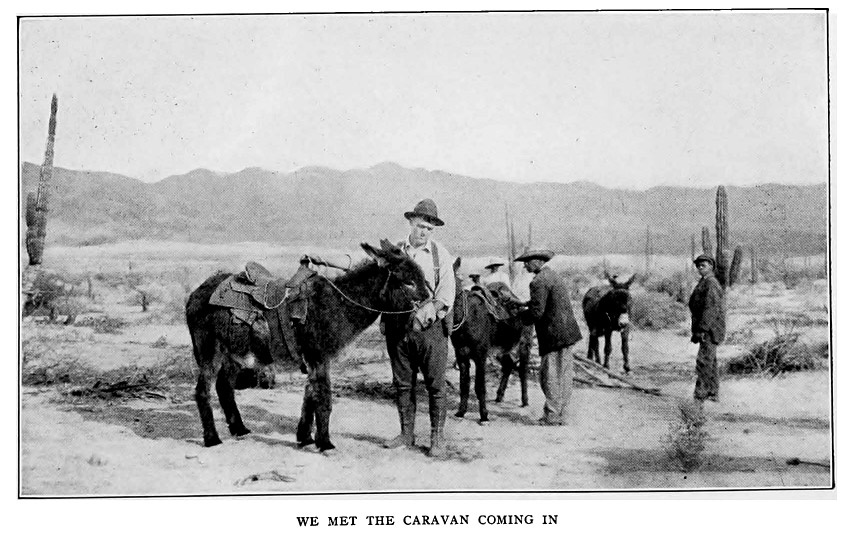

Chapter 1. - Geese
Chapter 2. - The Chronicle of a Chromatic Bear Hunt
Chapter 3. - The San Blas People
Chapter 4. - On the Trail of the Cowardly Cougar
Chapter 5. - Messing Around in Mexico
Most men enjoy hunting, or would if they had a chance, but there is a small, abnormal minority who are hopeless addicts to the chase. To them the fiscal year begins with the opening of the deer season or the start of the duck flight, and ends when “birds and quadrupeds may no longer be legally possessed.” They are the fellows who wrap their own fish rods, join outing associations, and wear buckskin shirts when they disappear into the trackless wastes of Westchester County for the club’s annual potlatch and big-game lying contests.
To this class I belong. I offer what follows not as an excuse, but as a plea in extenuation. It is a feeble effort to paint the optimistic soul of a sportsman, to show how impossible it is to prevent him from having a good time, no matter how his luck breaks, and, in a general way, to answer the question, “Why is a hunter?”
There is no satisfactory answer to that query; hunters are merely born that way. Something in their blood manifests itself in regular accord with the signs of the zodiac. In my case, for instance, when autumn brings the open season, I suffer a complete and baffling change of disposition. I am no longer the splendid, upright citizen whose Christian virtues are a joy to his neighbors and an inspiration to the youth of his community. No. I grow furtive and restless; honest toil irks me. I begin to chase sparrows and point meadow larks and bark at rabbit tracks. I fall ill and manifest alarming symptoms which demand change of climate and surcease from the grinding routine. I sigh and complain. I moan in my sleep and my appetite flags. I allow myself to be discovered dejectedly fondling a favorite fowling piece or staring, with the drooping eyes of a Saint Bernard, at some moth-eaten example of taxidermic atrocity. The only book that stirs my languid soul is that thrilling work, Syllabus of the Fish and Game Regulations.
So adept have I become at simulating the signs of overwork that seldom am I denied a hunting trip to save my tottering health. Mind you, I do not advocate deceit. I abhor hypocrisy in the home, and I merely recount my own method of procedure for the benefit of such fellow huntsmen as are married and may be in need of first aid.
I was suffering the ravages of suppressed desires, common to my kind, when, several autumns ago, a friend told me about a form of wild-goose shooting in vogue on the outer shoals of Pamlico Sound, North Carolina, and utterly stampeded my processes of orderly thought.
“They use rolling blinds on the sand bars,” he told me. “They put down live decoys, a couple hundred yards away, then, when the geese come in, they roll the blind up to them.”
I assured him that his story was interesting but absurd. Having hunted Canada honkers, I knew them to be suspicious birds, skeptical of the plainest circumstantial evidence and possessed of all the distrust of an income-tax examiner.
“You don’t move while they’re looking,” my informant told me. “When they rubber, you hold your breath and, if religiously inclined, you pray. When they lower their heads, you push the blind forward. A goose is a poor judge of distance, and you can roll right up to him if you know how.”
I didn’t believe him; but the next day I was en route to North Carolina, and I have been back there every year since. I have shot from rolling blinds, stake blinds, and batteries. Sometimes I have good luck, again I do not. But nothing destroys my enjoyment, and every trip is a success. Once I am away with a gun on my arm, I become a nomad, a Siwash; I return home only when my sense of guilt becomes unbearable and when the warmth of my wife’s letters approaches zero.
And I have done well down there. At first, I went alone, traveled light, and spent little money. Now I take friends with me; I keep a well-equipped hunting boat there the year round; I stay a long time, and I spend sums vastly larger than I can afford. A brace of ducks used to cost me perhaps ten dollars, in the raw; now they stand me several times that, exclusive of general overhead. It shows what any persistent sportsman may accomplish even with a poor start. Perhaps no habitual hunter pays more for his entertainment than I do, and, figuring losses in business, time wasted, etc., etc., I truthfully can say that I enjoy the sport of kings.
This year there were five of us in the party—Maximilian Foster and Grantland Rice, fellow scribes, and Duke and Duchess, two English setters of breeding that we took along to investigate the quail resources of the country.
Max had made the trip once before; so he needed no urging to go again—only an excuse. We hit upon a good one. He is an abandoned trout fisherman and he ties his own flies. Feathers are expensive and hard to get. Why not lay in a good supply? It was the best we could think of at short notice; so he went home to try it out.
There was every reason why Grant should remain at his desk, but we argued that there might well be problems of trajectory involved in goose shooting which would revolutionize the golf industry if thoughtfully studied. Who could better investigate this promising field than a recognized golf paranoiac like him? We had only to suggest this line of thought; Grant rose hungrily to the bait and darted with it into the uptown Subway. He argued where it would do the most good, and to such effect that he promised to follow us a week later.
Now, a word about Duke and Duchess. In my time I have owned many dogs, for a dog is something I lack the force of character to refuse. Anybody can give me any kind of dog at any time, and I am grateful—to the point of tears. That is how these two came to our house—as gift dogs—and they made me very happy for a while, because I had always wanted a pair of setters. Frankly, however, they abused their welcome, for there has seldom been merely a pair of them. I have presented setter puppies to my relatives and to my friends. I am now preparing a gift list of my business acquaintances and fellow club members, but I am slowly losing ground, and my place grows more and more to resemble a Bide-a-Wee Home.
I had never been able to hunt over this pair, for whenever I was ready for a trip, household duties prevented Duchess from going along, or else I foresaw the necessity of taking with me a large crate in which to ship back her excess profits. This time, however, conditions appeared to be propitious, so Max and I decided to do upland shooting while waiting for Grant to join us, and then wind up our hunt with a gigantic offensive against the ducks and geese. After watching Duke and Duchess point some of my pigeons and retrieve corncobs, Max and I decided they were natural game sleuths and could detect a bird in almost any disguise. If a quail hoped to escape them, it would have to wear hip boots and a beard.
Time was, not long ago, when travel was no great hardship. But all that is changed. Government operation of the railroads worked wonders, even during the brief time we had it. For instance, it restored all the thrill and suspense, all the old exciting uncertainty of travel during the Civil War wood-burning days. No longer does one encounter on the part of employees that un-American servility which made travel so popular with the parasitic rich. Real democracy prevails; train crews are rough, gruff, and unmannerly, and even the lowly porter has learned the sovereign dignity of labor—and maintains it. Nor is there now any difference in the accommodations on the jerkwater feeders and the main lines, all that having yielded to the glorious leveling process. Train schedules are ingeniously arranged for the benefit of innkeepers at junction points, and the last named are maintained for the purpose of allowing one train to escape before another can interfere with it.
Having missed connections wherever practical, and taken the dogs out for a walk in several towns of which we had never heard, Max and I arrived, in due course, at Beaufort, only twelve hours late. We were a bit weak from hunger and considerably bruised from futile attempts to battle our way into the dining car, but otherwise we were little the worse for the journey.
The guides were waiting with the boat, but they bore bad news.
“There’s plenty of geese on the banks,” Ri told us, “but we’ve had summer weather and the tides are so low there’s no shooting.”
Seldom does a hunter make a long trip and encounter weather or game conditions that are anything except unparalleled. I have learned long since to anticipate the announcement that all would have been well had I arrived three weeks earlier or had I postponed my coming for a similar length of time; therefore we ignored Ri’s evil tidings, pointed to Duke and Duchess, and forecast a bad week for any quail that were unwise enough to remain in the county.
Both Ri and Nathan are banks men, born and raised close to the Hatteras surf; they know nothing of quail hunting, so we blueprinted it for them on the way to the dock.
“High-schooled dogs like these are almost human,” we explained. “They are trained to pay no attention to anything except game birds, but, with respect to them, their intelligence is uncanny, their instinct unerring. They will quarter a field on the run, pick up the scent of a covey, wheel and work up wind to a point. When they come to a stand, you know you’ve got quail. You walk up, give them the word to flush; then they retrieve the dead birds and lay them at your feet without marring a feather. It’s beautiful work.”
While we were in the midst of this tribute, Duke, whose leash I had removed, squeezed out through the picket fence of a backyard with the palpitating remains of a white pullet in his mouth. He was proud; he was atremble with the ardor of the chase; the irate owner of the deceased fowl was at his heels, brandishing a hoe.
I settled with the outraged citizen; then I engaged Duke in a tug of war for the corpus delicti. It was a strictly fresh pullet; there was nothing cold storage about it, for it stretched. Meanwhile, Max explained how to break a dog of chicken-stealing.
“Tie the dead bird round his neck where he can’t get at it. That will cure him.”
“But why cure him?” Ri inquired, earnestly. “Seems like you’d ought to encourage a habit of that kind. Them dogs is worth money!”
Duke and Duchess were much interested in the boat. While we unpacked, they explored it from end to end; then Duchess went out on deck, tried to point a school of mullet, and fell overboard. Nathan retrieved her with a boat hook; she came streaming into the cabin, shook herself thoroughly over my open steamer trunk, then, unobserved, climbed into my berth and pulled the covers up around her chin. She has a long, silky, expensive coat, and it dries slowly; but she liked my bed and spent most of a restless night trying to blot herself upon my chest.
I did not sleep well. No one can enjoy unbroken repose so long as a wet dog insists upon sleeping inside the bosom of his pajamas. I arose at dawn with a hollow cough and all the premonitory symptoms of pneumonia, but Duchess appeared to be none the worse for her wetting, and we felt a great relief. It would have been a sad interruption to our outing had either dog fallen ill.
That day, while the boat was being outfitted, Max and I hired an automobile and went out to start a rolling barrage against the quail. The dogs were shivering with excitement when we put them into the first field, but they had nothing on us, for few thrills exceed that of the hunter who, after a year indoors, slips a pair of shells into his gun and says, “Let’s go.”
But within a half hour we knew we had pulled a flivver. Out of the entire state of North Carolina we had selected the one section where big, inch-long cockleburs were too thick for dogs to work. Nothing less than a patent-leather dachshund could have lived in those fields. In no time Duke and Duchess were burred up so solidly they could hardly move. They were bleeding; their spun-silk coats were matted and rolled until their skins were as tight as drum heads; their plumy tails were like baseball bats, and they weighed so much that their knees buckled and they looked as if they were about to jump.
They put up a covey or two, but it became a question either of removing their coats in solid blankets, as a whale is stripped of its blubber, or of patiently freeing them, one burr at a time—an all-day task—so we went back to the car and sought a snipe marsh.
Snipe marshes are wet, and the mud is usually deep, dark, and sticky. One either stands or sits in it, and to get the fullest enjoyment from the sport one should forget his rubber boots. This we had done; hence we were pretty squashy when we got back into the automobile about dark. We slowly froze on the way to town, but before we had hoarsed up too badly to speak, we agreed that it had been a great day.
I picked burrs most of that night. Along toward morning, however, I realized that it was a hopeless task. I had hair all over the cabin; my fingers were bleeding, Duke and Duchess were upon the verge of hysteria, and whenever we looked at each other we showed our teeth and growled. So I decided to clip them. But it is no part of a vacation to shear a pair of fretful canines, size six and seven-eighths, with a pair of dull manicure scissors. Breakfast found those dogs looking as if they had on tights. I was haggard, but grimly determined to enjoy another day in the glorious open if only I could stay awake.
It was no use trying to hunt here, however; so I gave the word to up anchor and hie away out of the cocklebur belt.
So far as I can discover, a boat owner has one privilege, expensive but gratifying; he can, when the spirit moves him, say, “Let us go away from here,” and sometimes the boat goes. I voiced that lordly order, ran Duchess out of my bed, and lay down for a nap. But not to sleep. Ri and Nathan began an intricate and noisy job of steam fitting in the engine room. Now and then the motor joined them, only to miss, cough, and die in their arms. By and by I heard echoes of profanity; so I arose to investigate the nature of the difficulty.
Max was frowning at the engine; Ri was massaging its forehead with a handful of waste; Nathan was spasmodically wrenching hisses out of it with the starting bar. He raised a streaming face to say:
“She never balked on us before,”
Ri agreed:
“She never missed an explosion coming over.”
“Sure you’ve got gas?” I hopefully inquired. This is my first question in cases of engine trouble.
They were sure; so I returned to my bunk and ran Duchess out of my warm place. Had they answered my inquiry in the negative, I could have instantly diagnosed the case, but when an engine has gasoline and still refuses to run, I delve no deeper. I respect its wishes.
Another half hour passed; then I went forward and asked if there was plenty of spark. This is my second question, and it leaves me clean. But there was spark enough, so I effaced myself once for all and again disturbed Duchess just as she had made an igloo of my bedclothes. This time I dozed off, lulled by sounds which indicated that Nathan has begun a major operation of some sort, with the others passing instruments and counting sponges.
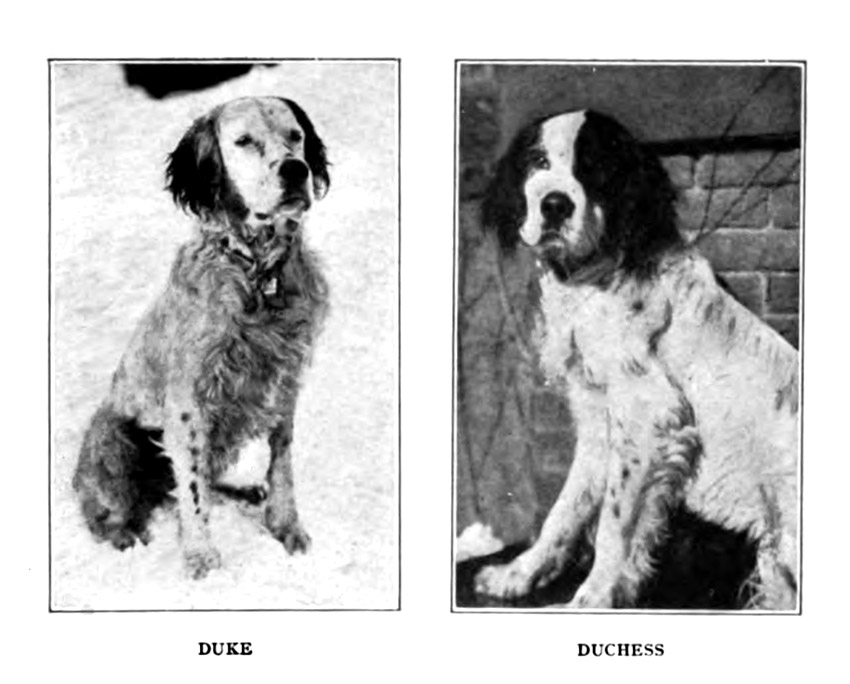

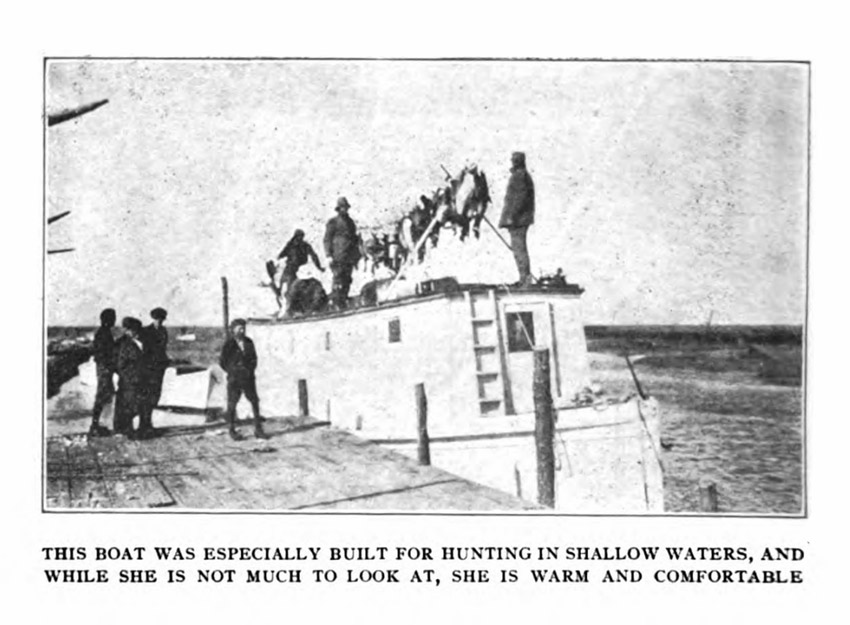

Running footsteps roused me. Max was removing a fire extinguisher from its rack when I opened my eyes. He was calm; nothing to worry about except a small conflagration under the engine-room floor. If we worked fast, we might save a part of the ship, and wasn’t it fortunate that we were still tied up to the dock?
Contrary to expectations, we managed to put out the blaze, after which we found that all our motor needed was a cozy little fire in its living room to take the chill out of the air, for when we turned it over it went to work in the most cheerful spirit.
That afternoon we hunted farther up the sound, but what quail we raised were in impossible thickets and the snipe on the marshes had gone visiting over the week end. As we pulled out at daybreak on the following morning, we ran aground on a falling tide and stuck there.
Some trips seem to have a jinx on them. John W. Jonah appears to keep step right up to the finish. After laboring long and blasphemously in a vain effort to get afloat, the unwelcome suspicion entered our minds that this was such a one.
I had built this boat especially for hunting in these shallow waters, and while she is not much to look at, she is warm and comfortable, and it is Ri’s boast that she is the only fifty-foot craft in existence that can navigate on a heavy frost or a light dew. But that is an exaggeration, as we discovered when, finally, we were forced to go overboard, regardless of the weather, and boost her off by main strength. Then we learned that she had been cunningly designed to draw just enough water so as to thoroughly wet us, regardless of the height of our waders. But the experience benefited our colds; it did them a world of good and practically renewed their youth.
Max and I tested out the game resources of several sections of that shore on the way to Ocracoke, but instead of shipping quail home to our expectant friends, we had hard work to get enough to keep body and soul together, and those few, of course, we could neither taste nor smell—our colds were doing so well. Always there was some good reason why we had shot nothing today but had high hopes for the morrow; Duke and Duchess began to regard the whole expedition as a hoax on them, and spent their time collecting ticks for me to remove during the evening. Nevertheless, the open life was having its effect upon Max and me. We had arrived soft, pallid, gas-bleached, our bones afflicted with city-bred aches and pains; after a week spent on waist-deep sand bars, in damp marshes and draughty fields, we were practically bedridden.
Ocracoke, center of the goose-hunting industry, is a quaint New England village pitched on the outer rim of Pamlico Sound, and it hovers around a tiny circular lagoon. The houses are scattered among wind-twisted cedars or thickets of juniper and sedge, and most of them possess two outstanding adjuncts—a private graveyard and a decoy pen. All male inhabitants above the age of nine are experts on internal-combustion engines, for motor boats are everywhere except in the back yards. Of distinctive landmarks there are four—one lighthouse, one colored man, and two Methodist churches. Ocracoke has tried other negroes, but likes this one, and as for religion, it will probably build another Methodist church when prices get back to normal.
Now, for the benefit of any reader genuinely in quest of information, a word as to the kind of hunting here in vogue and the methods involved. First, understand that this stormy Hatteras region is the Palm Beach of the Canada goose and his little cousin the brant. Ducks winter all along the Atlantic coast, but Pamlico Sound marks, roughly, the goose’s southern limit. Here each wary old gander pilots his family; here he and his mate watch their young folks make social engagements for the following season.
There is no marsh or pond shooting, for the wild fowl frequent the shallow waters of the sound and it is necessary to hunt from rolling blinds, stake blinds, or batteries. The rolling blind I have described—it is used only on cold, drizzly days in the late season when the geese have chilblains and gather on the dry bars to compare frost bites. A stake blind resembles a pulpit raised upon four posts, and is useful mainly in decoying inexperienced Northern hunters. Green sportsmen stool well to stake blinds, for they are comfortable, but a wise gunner shies at them as does a gander. He knows that the real thing is a battery.
This latter device may be described as a sort of coffin, but lacking in the creature comforts of a casket. It is a narrow, water-tight box with a flush deck about two feet wide, to three sides of which are hinged large folding wings of cloth or sacking stretched upon a light wooden framework. It is painted an inconspicuous color; heavy weights sink it so low that its decks are awash. The sportsman lies at full length in it, and his body is thus really beneath the level of the water. When it is surrounded by a couple hundred dancing decoys, the hunter is effectually hidden from all but high-flying birds. To such as fly low, the rig is a snare and a delusion; not unless they flare high enough to get a duck’s-eye view do they see the ace-in-the-hole, and then it is usually too late.
Battery shooting requires some little practice and experience. One must begin by learning to endure patiently the sensations of ossification, for to rest one’s aching frame even briefly by sitting up, or to so much as raise one’s head for a good look about, is a high crime and a misdemeanor. It completely ruins the whole day for the guides, who are comfortably anchored off to leeward in the tender, and affords them the opportunity of saying, later:
“You can’t expect ’em to decoy to a lump. If you’d of kep’ down, you’d of got fifty birds to-day.”
And that is not the only discomfort. All batteries are too small, and some of them leak in the small of the back. If the wind shifts or blows up, they sink before the guides arrive. For years I tried to adapt myself to the existing models, but failed. I fasted until my hips narrowed to an AA last; I wore the hair off the top of my head; my body became rectangular, and still I did not fit. I have had rubber-booted guides stand upon my abdomen and stamp me into my mold, as the barefoot maidens of Italy tread the autumn vintage, but, no matter how well they wedged me in, some part of me, sooner or later, slipped. The damp salt air swelled me, perhaps; anyhow, I bulged until from a distance I looked like a dead porpoise, and the ducks avoided me.
Tiring of this, I had a large box built. I equipped it with a rubber mattress and pillow, and now I shoot in Oriental luxury. But, even under favorable conditions, to correctly time incoming birds, to rise up and “meet them” at precisely the right instant, is a matter of considerable nicety. One must shoot sitting, which is a trick in itself, especially on the back hand, and ducks do not remain stationary when surprised by the apparition of a magnified jack-in-the-box. They are reputed to travel at ninety miles an hour, when hitting on all four, but that is too conservative. Start the goose flesh on a teal’s neck, for instance, and he will leave your vicinity so fast that a load of shot needs short pants and running shoes to overtake him.
I have lain in a double box alongside of experienced field shots and picked up many valuable additions to my vocabulary of epithets. I have seen nice, well-bred, Christian gentlemen grind their teeth, throw their shells overboard, and send for better loads, even smash their guns in profane and impotent rage. That is, I have seen them perform thus when I myself was not stone blind with fury.
We shot for a couple of days, off Ocracoke, while we were waiting for Grant, but the weather was warm and we had little luck; then the bottom fell out of the glass and, in high hopes of a norther, we ran up the banks to our favorite hunting grounds. As we pulled into our anchorage, the bars were black with wild fowl; through our field glasses we could see thousands, tens of thousands, of resting geese; up toward Hatteras Inlet the sky was smudged with smoky streamers which we knew to be wheeling clouds of redheads. Before we had been at rest a half hour, the wind hauled and came whooping out of the north, bearing a cold, driving rain; so we shook hands all around. All that is necessary for good shooting on Pamlico is bad weather. It looked as if we had buried our jinx once for all.
Our party had grown, for we had picked up the hunting rigs at Ocracoke—they were moored astern of us, launches, battery boats, and decoy skiffs streaming out like the tail of a comet. All that day and the next we watched low-flying strings of geese and ragged flocks of ducks beating past us, while we told stories or conducted simple experiments in probability and chance. In the latter I was unsuccessful, as usual, for I simply cannot become accustomed to the high cost of two small pair.
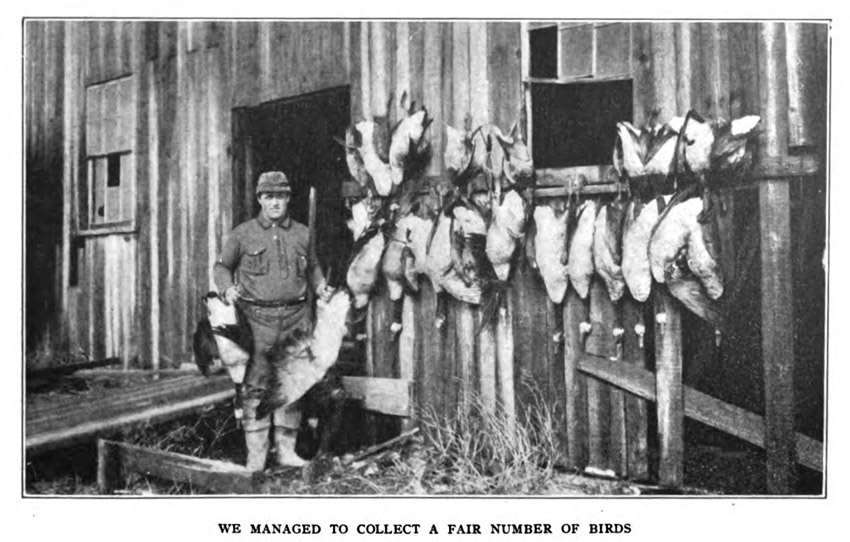
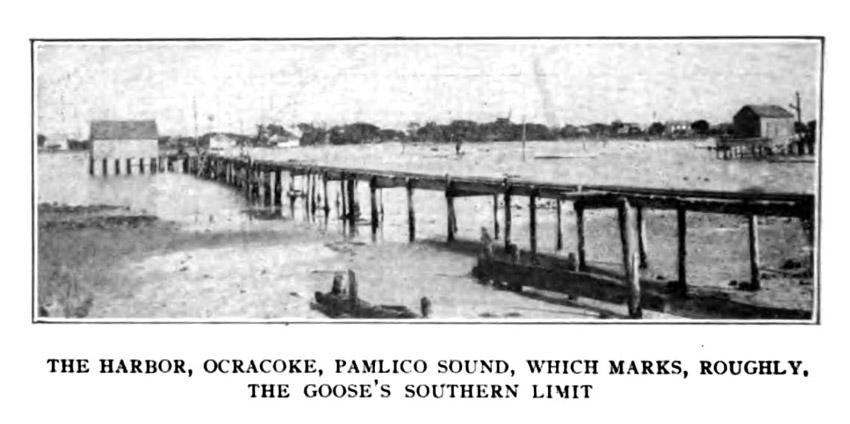
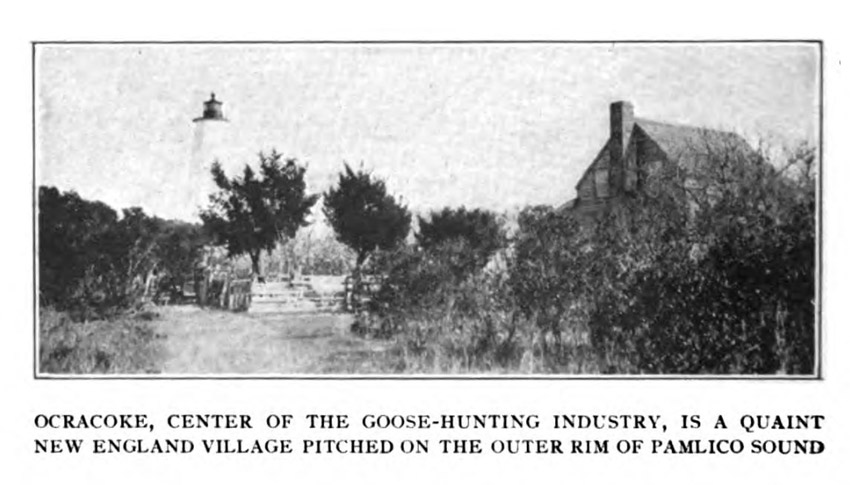
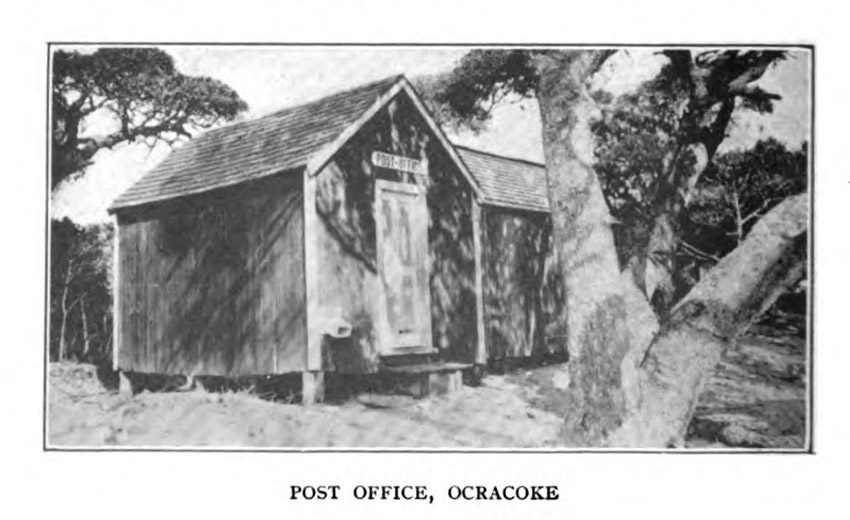
The second morning brought a slight betterment of conditions; so we set out early, Max in search of shelter behind a marshy islet, while I hit for the outer reefs. After several attempts, Ri finally found a spot where a mile of shoals had flattened the sea sufficiently to promise some hope of “getting down.”
While we were placing the battery, Grantland Rice arrived in a small boat from Ocracoke. He was drenched; he had been four days en route from New York, and he was about fed up on rough travel. Through numb, blue lips he chattered, “You’re harder to find than Stanley.”
I directed him to the houseboat and told him where to obtain comfort and warmth— third bureau drawer, left-hand corner, but be sure to cork it up when through—then explained that Max had put down a double box and was waiting for him.
“The weather to kill geese is weather to kill men,” I assured him. “You’re in luck to arrive during a norther like this.”
“Any nursing facilities aboard the boat?” Grant wanted to know.
I assured him with pride that we were equipped to take care of almost anything up to double pneumonia, and that if worse came to worst and his lungs filled up, we could run him over to the mainland, where he could probably get in touch with a hospital by mail.
My battery managed to live, with the lead wash strips turned up, but the gale drove foam and spray over me in such quantities that I was soon numb and wet—the normal state for a battery hunter. Members of the Greely expedition doubtless suffered some discomforts, and the retreat from Serbia must have been trying, but for 100-per-cent-perfect exposure give me a battery in stormy winter weather.
However, I managed to collect a fair number of birds before dusk, when, in answer to my feeble signals, the guides rescued me. They seized me by my brittle ears, raised me stiffly to my heels, then slid me, head first, into the tiny cabin of the launch, as stokers shove cordwood into a boiler. By the time we got back to the boat I could bend my larger joints slightly and I no longer gave off a metallic sound when things fell on me.
The other boys had not fared so well. They had been drowned out, their battery had been sunk without trace, and they had nothing to show for their day’s sport except a clothes line full of steaming garments and a nice pair of congestive chills. Otherwise it had been a great day, and we looked forward to more fun on the morrow.
But how vain our hopes! As usual, the weather was unparalleled. Once again it surprised the oldest inhabitants. That night the wind whipped into the south, drove all the water off the bars, then fell away to a calm, and the temperature became oppressive. The wild fowl reassembled in great rafts where we could not get at them; we lay in our batteries, panting like lizards and moaning for iced lemonade, while the skin on our noses curled up like dried paint. The only birds we got were poor half-witted things, delirious with the heat.
Such conditions could not last—the guides assured us of that—and they didn’t. The next day it rained, and a battery in rainy weather is about as dry as a goldfish globe. Now, a strong man with an iron will may school himself to lie motionless while he slowly perishes from cold, for after the first few agonizing hours there is comparatively little discomfort to death by freezing, but I defy anybody to drown without a struggle.
But why drag out the painful details? We had not interred our jinx. One day a hurricane blew out of the north and piled the angry waters in upon us, the next it shifted, ran the tides out, and left us as dry as a lime burner’s boot; the third it rained or fogged or turned glassy calm. Grizzled old veterans from the Hatteras Life-saving Station rowed out to tell us that such weather was impossible and threatened to ruin their business, but what could you expect under a Democratic administration?
One morning, Ri outlined a desperate plan to me, and I leaped at it. Away inshore, across miles of flats, we could see probably a million geese and twice that many ducks enjoying a shallow footbath where no boat could approach them.
“Let’s leave the launch outside, wade our rig up to their feedin’ ground, and dig it in. It ‘ll take a half day of hard work, but there’s goin’ to be a loose goose flyin’ about three o’clock, and you can shoot till plumb dark. We’ll leave the box down and wade back.”
It sounded difficult, so we tried it, towing the empty battery behind us. The big decoy skiff dragged like an alligator, but we poled, waded, shoved, and tugged until we came to where the bottom was pitted and white with uptorn grass roots. Here we dug a hole deep enough to sink the box—no easy job with a broken-handled shovel—put out our stools, and then the men shoved the empty boat away.

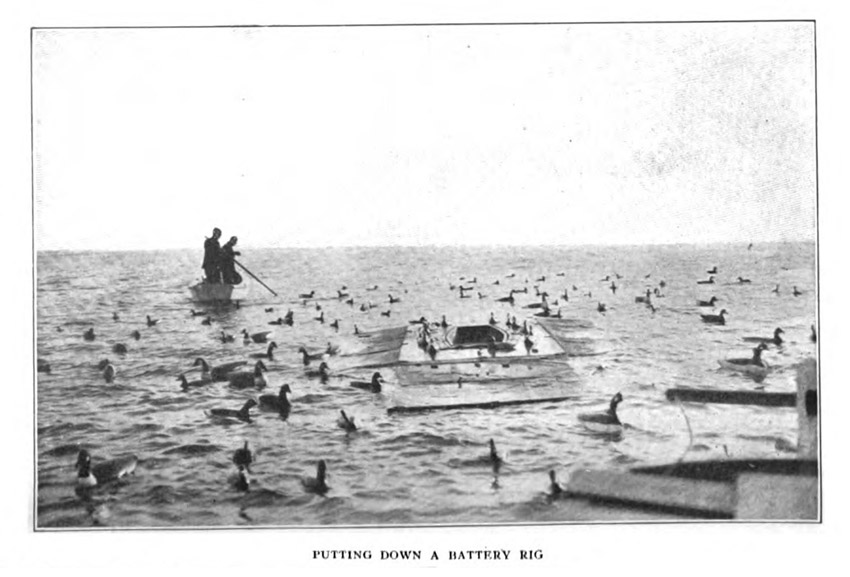
Tons of wild fowl had gone out as we came in, but soon after I lay down they began returning. First there came a pair of sprigs, then a pair of black ducks. The black mallard is my favorite—he is so wary, so wise, and so game. He can look into the neck of a jug, and he fights to the last. When the hen dropped, the drake, as usual, flared vertically. Upward he leaped in that exhibition of furious aerial gymnastics peculiar to his breed; then, at the top of his climb, he seemed to hang motionless for the briefest interval. That is the psychological instant at which to nail a black duck. As he came down, fighting, I was up and overboard after him. The water was shallow, but I splashed like a sternwheeler, and I was wet to the waist before I had retrieved that cripple.
Next I glimpsed a long, low line of waving wings approaching, and flattened myself to the thickness of a flannel cake, thrilling in every nerve. Never did twenty geese head in more prettily. They had started to set their pinions, and I was picking my shots, when one of the decoys, a young gander in the Boy Scout class, cracked under the nervous strain and began to flap madly. He flared the incomers, and I failed to get more than two.
I made haste to gather up the dead birds and lay them on the battery wings; then I moved the shell-shocked gander to the head of the rig. But before I could get him anchored, distant honks warned me, and I ran for cover. Of course, I tripped over decoy lines—everybody does. I did Miss Kellerman’s famous standing, sitting, standing dive, but there was still a dry spot between my shoulder blades when I plunged kicking into the battery. I was too late, however, and the flock went by, out of range, laughing uproariously at me.
Then up from the south came a rain squall, and I stood with my back to it, shivering and talking loudly as tiny glacial streams explored parts of my body that are not accustomed to water. During the rest of the afternoon, cloudbursts followed one another with such regularity that my battery resembled a horse trough, and when I immersed myself in it it overflowed. But between squalls the birds flew. When a bunch of geese pitched in at my head and I downed five, I fell in love with the spot and would have resisted a writ of eviction.
When the guides appeared at dark I had a pile of game that all but filled the tiny skiff which they had thoughtfully brought along. By the time we had loaded it with the dead birds and the crate of live decoys it was gunwale deep, so we set out to wade back to the launch, towing it behind us.
Night had fallen; fog and rain occasionally obscured the gleam of our distant ship’s lantern. Other lights winked at us out of the gloom, and although they were miles away, nevertheless they all looked alike; so, naturally, we got lost. We headed for first one then another twinkling beacon, and altered our course only when the water deepened so that we could proceed no farther without swimming.
I have been successfully lost where you would least expect it, but never before had I been lost at sea with nothing whatever to sit down upon except the ocean, and after an hour or two I voted it the last word in nothing to do. I can think of no poorer way of spending a rainy December night than chasing will-o’-the-wisps round a knee-deep mud flat the size of Texas, with an open channel between you and the shore.
I presume we waded no more than twenty-five miles—although it seemed much farther —before we found the launch and collapsed over her gunwale like three wet shirts. Then, just to show that things are never as bad as possible, the engine balked.
I asked if there was plenty of gas and if the spark was working, and, receiving the usual affirmative answer, I dissolved completely into my rubber boots. Ri was probably quite as miserable as I, but he began to scrub up for the customary operation. He removed the motor’s appendix, or its Fay and Bowen, and ran a straw through it, the while we could see frantic flashes of the houseboat’s headlight.
I felt an aching pity for Max and Grant. What a shock to them it would be to find us in the morning, frozen over the disemboweled remains of our engine, like merrymakers stricken at a feast of toadstools. They were men of fine feelings; it would nearly, if not quite, spoil their whole trip, even though they divided my dead birds between them.
But the machine made a miraculous recovery, and at its first encouraging “put” a great warmth of satisfaction stole through me. After all, it had been a wonderful day.
Human endurance, however, could not out-game that weather. The evening finally came when the boys announced that their time was up, so, after supper, we sent the small boats up to Ocracoke on the inside and fared forth into the dark sound.
As we blindly felt our way out from our anchorage, we ran over a stake net, picked it up and wrapped it around our propeller, and grounded helplessly on the edge of the outer bar. There we stuck. Examination showed a very pretty state of affairs. The net with its hard cotton lead line had wedged in between the propeller and the hull, and disconnected the shaft—a trifling damage and one that could have been repaired easily enough had we possessed a deep-sea diving outfit or a floating dry dock. But, search our baggage as we might, we could find neither. That’s the trouble about leaving home in a hurry, one is apt to forget his dry dock.
Just to show us that he was still on the job, old J. W. Jinx arranged a shift in the wind. It had been calm all day; now a gale came off the sound and held us firmly on the reef. Pamlico began to show her teeth in the gloom, and with every swell we worked higher up on the bar and the boat bumped until our teeth rattled. We were several miles offshore, without any sort of skiff; it began to look as if we had about run out of luck and might have to hunt standing room somewhere in the surf. However, a yacht had made in near by on the day before, and, thanks to our searchlight, we managed to get a rise out of her. She sent a launch off, and it finally towed us back to shelter.
By this time it was midnight and the duties of host rested heavily upon me. I could with difficulty meet the accusing eyes of my guests, and, although I had exhausted my conversational powers, I hung close to them for fear of the cutting, unkind things they would say if I left them alone.
The next morning, Mr. Scott, owner of the neighboring yacht, prompted by true sportsman’s courtesy, towed us back to Ocracoke, and as we went plunging down the sound in a cloud of spray we realized that the weather had hardened up and the birds were beginning to fly. The sky was full of them; we could hear the noise of many guns—a sound that brought scalding tears to our eyes.
I simply could not bear to leave just as the show had begun; so I reread my wife’s last letter, and, finding it only moderately cool, I took the bit in my teeth and declared it my intention to stick long enough to change defeat into victory, even if I had to sleep in the woodshed when I got home.
“Better stay on for a few days,” I urged the boys. “It will be dangerous to sit up in a battery to-morrow; the birds will knock your hats off. A blind man could kill his limit in this weather.”
I had not read their mail, but I understood when they choked up and spoke tearfully about “business.” While I pitied them sincerely, a fierce joy surged through my own veins; nothing now could hinder me from enjoying a few days of fast, furious shooting. The birds were pouring out of Currituck; there would be redheads, canvasbacks, teal— every kind of duck.
As we tried to work the house boat into the lagoon at Ocracoke, where we could get her out on the ways and count the fish remaining in that fragment of net, an Arctic tornado hit us and blew us up high and dry on a rock pile. It was a frightful position we now found ourselves in, for we had such a list to port that the chips rolled off the table—and we all felt lucky.
But the storm had delayed the mail boat and my companions were forced to remain over another day. The courage with which they bore this bitter disappointment was sublime; they sang like a pair of thrushes as they feverishly unpacked.
Conditions were ideal the next morning and we were away early. Having put down my rig in shallow water, where I could wade up my own birds, I sent the launch back to the village. This promised to be a day of days, and I wanted to get the most out of it.
Almost immediately the ducks began flying, and several bunches headed in towards me. I was puzzled as to why they changed their minds and flared, until a cautious peep over the side showed a small power-boat threshing up against the wind. It had already cost me several good shots, but there was nothing to do except wait patiently for it to pass. However, it did not pass; in spite of my angry shouts and gesticulations it held its course until within hailing distance. Then the man in the stern bellowed:
“Telegram!”
Now, mail is bad enough on a hunting trip, but telegrams are unbearable, and I distrust them. Nobody ever wanted me to stay away and enjoy myself so urgently as to wire me; therefore I openly resented this man and his mission. By the time he had handed me the message I had made up my mind to ignore it, reasoning rapidly that it could by no possibility be of importance, and if it were—as it probably was—I could do nothing about it before the mail boat came that night. Hence it was futile to permit my attention to be distracted from the important business of the moment.
I thanked the man, then urged him, for Heaven’s sake, to beat it quickly, for, in the offing, flocks of geese were noisily demanding a chance to sit down with my decoys, and just out of range ducks were flying about, first on one wing then on the other, waiting for him to be gone.
But that telegram exercised an uncanny fascination for me. I lacked the moral courage to destroy it, although I knew full well if I kept it on my person I would read it—and regret so doing. Things worked out just as I had expected. I yielded and—my worst apprehensions were realized. The message was from my wife, but beyond that fact there was nothing in its favor, for it read:
Your secretary has forged a number of your checks and disappeared. Total amount unknown, as checks are still coming in. Presume you gave him keys to wine cellar, for they, too, are missing. Wire instructions quick. Am ill, but stay, have a good time, and don’t worry.
I stared, numb and horror-stricken at the sheet until I was roused by a mighty whir of rushing pinions. Those ducks had stood it as long as possible and were decoying to me, sitting up. Through force of habit my palsied fingers clutched at my gun, but, although the birds were back-pedaling almost within reach, I scored five misses. Who can shoot straight with amount of loss unknown and certain precincts unheard from? Not I. Those broadbills looked like fluttering bank books.
And the keys to the wine cellar missing! That precious private stock, laid in for purely medicinal purposes, ravaged, kidnaped! A hoarse shout burst from my throat; I leaped to my feet and waved frantically at the departing boatsman, but he mistook my cries of anguish for jubilation at the results of my broadside, waved me good luck, and continued on his way.
As I stood there striving to make my distress heard by that vanishing messenger, geese, brant, ducks, and other shy feathered creatures of the wild poured out of the sky and tried to alight upon me, or so it seemed. They came in clouds and I shooed them off like mosquitoes. One would have thought it was the nesting season, and I was an egg.
I read again that hideous message as I undertook to reload, but I trembled the trigger off and barely missed destroying my left foot—my favorite. Never in the annals of battery shooting has there been another day like that. Those ducks reorganized and launched attack after attack upon me, but my nerve was gone, and the most I could do was defend myself blindly.
I did spill blood during one assault, and I was encouraged until I found that I had shot one of Ri’s live decoys. Beyond that, the casualties were negligible, and when the guides came to pick me up they had to beat the blackheads out of the decoys with an oar.
As we pulled out of Ocracoke at dawn the next morning, the town was full of dead birds, and visiting sportsmen with eager, feverish eyes were setting forth once more for the gunning grounds. But we hated them. Flocks of geese decoyed to the mail boat whenever it hove to or broke down, and we hated them also.
Upon my arrival home I found a wire from Ri reading:
Too bad you left. Nathan killed fifty birds the next day and he can’t hit a bull with a spade.
However, take it by and large, it was a fine trip and a good time was had by all, which proves what I set out to demonstrate in the beginning—viz., you can’t explain a hunter; you can only bear with him and allow nature to take its course.
The biography of the average big-game hunter is a bitter hard-luck story. As compared with his work, the twelve labors of Hercules were the initiatory stunts of a high-school sorority. If this were not so, we would have no game left. The “big-horn” and the Alaskan grizzly would soon be quite as extinct as the dodo.
When Fred Stone and I determined to go bear hunting we chose Alaska, for several reasons. First, it was farther away than any other place we knew of, and harder to get to than certain suburbs of Brooklyn. Secondly, there are lots of bears in Alaska—black, white, gray, blue, brown, and the combinations thereof; enough to match any kind of furniture or shade of carpet. And I had been kindly but firmly informed that my trip would not be considered a success at our house unless I brought back a mahogany-brown skin, shading to orange, for the living room, and a large pelt not too deeply tinged with ox-heart red, to match the dining room rug. Fred was told likewise that the boss of his bungalow would welcome bear rugs of a French-gray or moss-green tint only.
We began to hunt immediately upon leaving New York, and had secured some fine specimens before reaching Chicago, but we killed most of our bears between St. Paul and Billings, Montana.
It was while dashing through the Bad Lands that Fred suggested bear dogs. “Great!” said I. “They’ll save us a lot of work and be fine company in camp.” Accordingly, we wired ahead for “Best pair bear dogs state of Washington,” and a few hours after our arrival at Seattle they came by express. They were a well-matched pair, yclept Jack and Jill, so the letter stated; both were wise in their generation and schooled in the ways of bear.
“They are a trifle fat,” we read, “but they will be O. K. if you cut down their rations. Both are fine cold trailers. Kindly remit hundred dollars and feed only at night.” We were informed that in Jill’s veins coursed the best blue blood of Virginia, and that, although she was no puppy in point of years, her age and experience were assets impossible to estimate. This rendered me a bit doubtful, for Alaska is not a land for fat old ladies, but Fred destroyed my misgivings by saying:
“Take it from me, she’s all right. We don’t want any debutante dogs on this trip.”
Jack was more my ideal. He had the ears of a bloodhound, the face of a mastiff, and the tail of a kangaroo, while his eyes were those of a tragedian, deep, soulful, and dark with romance. When he gave tongue, we decided he must have studied under Edouard de Reszke.
One day in Seattle sufficed to augment our outfit with ammunition, fishing tackle, and a mosquito tent. I have long since learned not to carry grub into the north.
Two years before, at the height of the salmon season, I had made a trip through the Copper River delta in a wheezy, smelly fish boat, and while tidebound, with the north Pacific pounding on the sand dunes to seaward, I had gazed across thirty miles of flats up into a gap of the great Alaskan range towards long, low-lying streaks of white which slanted down out of hidden gulches on opposite sides of the valley, appearing to close the course of the river.
“Glaciers!” announced the smelly captain of the smelly fish boat.
“Live glaciers?” I queried.
“Sure! On still days you can hear them ‘working’ clear out here. Chunks drop off the size of a mountain, and splash out all the water in the river. There ’ain’t any white men ever been up there.”
I spoke later with the smelly engineer, who was an old-timer in the country.
“They come together, they do, buttin’ one another like a pair of rams, grindin’ and squeezin’ to beat the band.”
“But how does the river get through?” I demanded, skeptically.
“I don’t know. Maybe it jumps over.”
The smelly deck hand shed even a dimmer light on that mysterious valley by informing me that, in order to pass those glaciers, one had to work along a perpendicular face of ice, chipping footholds and clinging with fingers and toes to dizzy heights above the river.

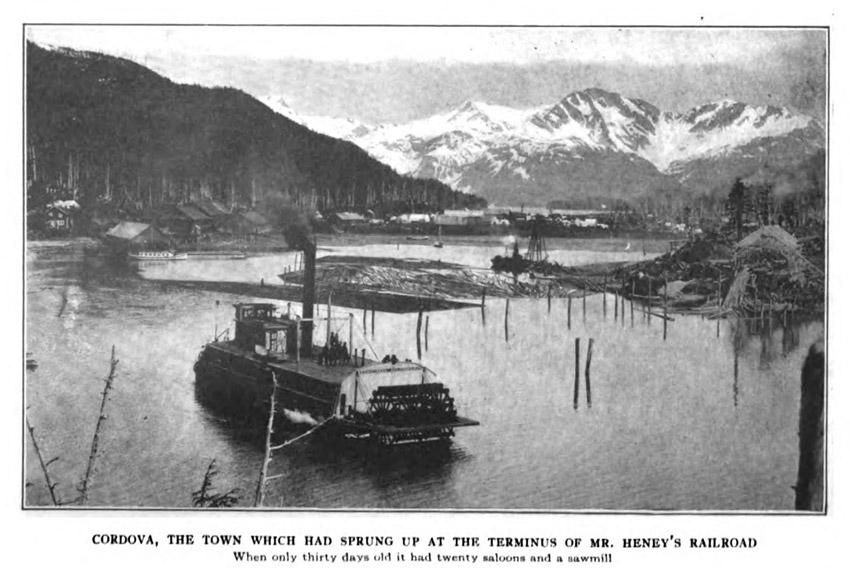
My informants united on but one statement: there were a great many bears up near those glaciers, for it seemed there were rapids of some sort where the animals came to fish during the salmon time; so many of them, in fact, that the banks were seamed with trails and the rocks worn smooth by their feet.
I still had some eight thousand Alaskan miles to do that summer, so I could stay there no longer, but the determination to see those glaciers at close range and to examine those bear tracks had grown upon me steadily. I had told Fred of them, and it was thither we were heading now. Hence the mosquito tents, the ammunition, and the soulful bear dogs.
For five days we plowed northward on a typical ratty Alaskan steamer, a thing of creaks and odors and vermin. On a drizzly May morning we docked at Cordova, the town which had sprung up at the terminus of Mr. Heney’s railroad. The road was not really Mr. Heney’s, but belonged to the Morgan-Guggenheim interests, being destined to haul copper from their mines two hundred miles inland. Mr. Heney was building it for them, however, and everybody looked upon it as his personal property. It was hours before breakfast time when we arrived, but “M. J.” himself was at the dock, for a purser on one of his freight steamers had apparently mislaid a locomotive or a steam shovel or some such article which Mr. Heney wished to use that morning, and he had come down to find it. He was not annoyed—it takes something more than a lost, strayed, or stolen locomotive to annoy a man who builds railroads for fun rather than for money and chooses a new country in which to do it because it offers unusual obstacles.
He welcomed us, drippingly, with a smile of Irish descent which no humidity nor stress of fortune could affect.
“I’m sorry you didn’t arrive yesterday,” he said, “for it looks as if the fall rains had set in.” It was the 21st of May and this was no joke, for Cordova is known as the wettest place in the world.
“Bear?” said Mr. Heney. “Yes, indeed. We’ll see that you get all you want.” And from that moment until we left Alaska with our legal limit of pelts he made us feel that the labors of his fifteen hundred men, the building of his railroad, and the disbursement of millions of dollars were, as compared with our comfort and our enjoyment, affairs of secondary importance. And when we described to him the tints of our wall paper and rugs we got the impression that, whether we needed bears lavender, bears mauve, or bears cerise, it was thenceforth a religion with him to see that we found them.
As to guides, there were no regular guides in this neighborhood, since there were no tourists—every resident had to earn his money honestly. But there were fellows about who knew the woods—Joe Ibach, for instance. He had just come in from a prospecting trip and might care to go a-bear hunting. So we descended upon Joe. Certainly he’d go. He didn’t care to guide, however, as he had never “gid” any, but he’d show us a lot of bears, and carry the outfit, and row the boat, and do the cooking, and chop the wood, and build the fires, and perform the other labors of the camp. As for regular guiding, though, he guessed we’d have to see to that ourselves until he learned how. When we spoke about wages, he said he didn’t think that sort of thing was worth money, showing conclusively that he was not a real guide. He had a long, square jaw and a steady eye, which looked good to us, so we agreed to do the guiding if he would do the rest of the things he had mentioned—and see that we did not get lost. As to those mysterious glaciers towards which I had been working these two years, Mr. Heney said we could not reach them yet. The Copper River delta was full of rotten ice, and the banks were so choked with snow that it was impossible to take an outfit up before the slews cleared. Out at Camp Six, however, a number of bears had been seen, one in particular so large that no day laborer could look upon his tracks and retain a sense of direction. Only the section bosses could stand their ground after one glance at his spoor.
We were installed at Camp Six by 5.30 on the following afternoon and had unchained our dogs. At 5.49 Jack had found a porcupine. A man came running to inform us that he was “all quilled up,” and so he was; his nose, lips, tongue, and throat were white with the cruel spines.
“Get them out quick, or they’ll work in,” we were advised, and somebody produced a pair of tweezers, with which we fell to. But Jack suddenly developed the disposition of a wolf and the strength of a hippopotamus. Followed a rough-and-tumble which ended by our getting his shoulders to the mat on a “half Nelson” and hammer-lock hold. Those quills which we did not remove from the dog with the tweezers we pulled out of each other after the scrimmage.
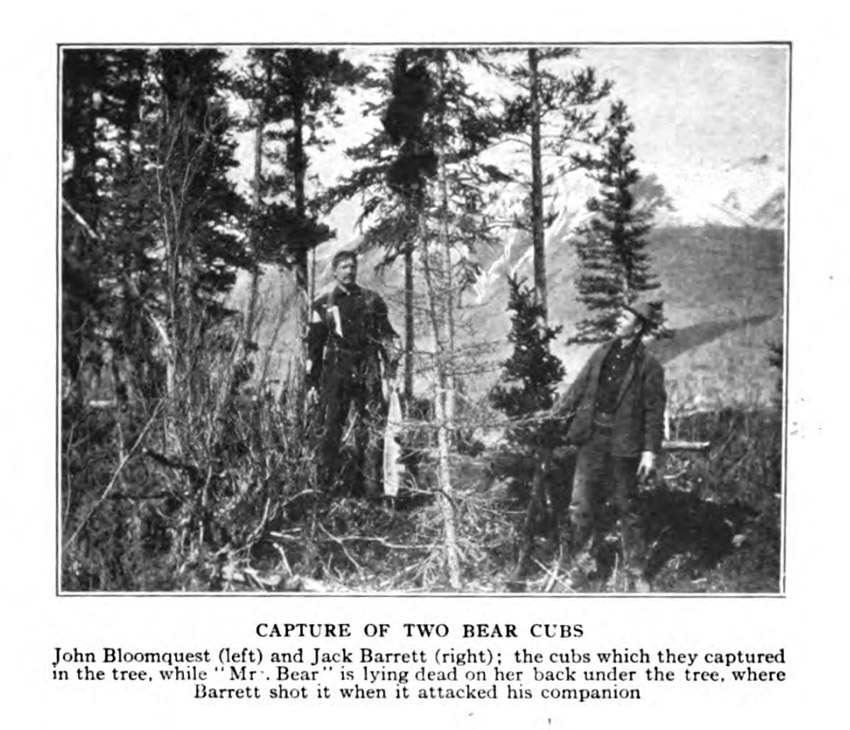
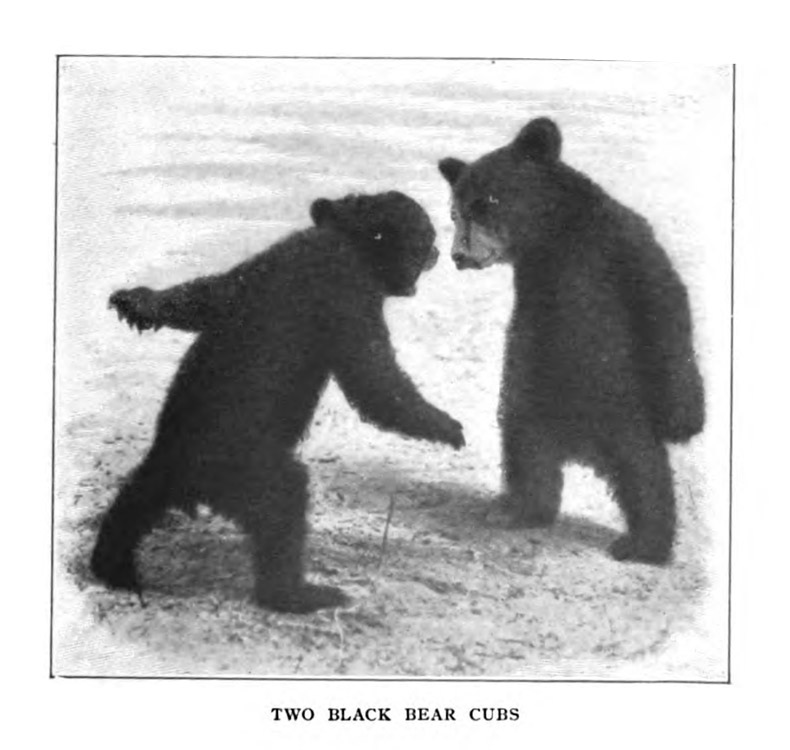
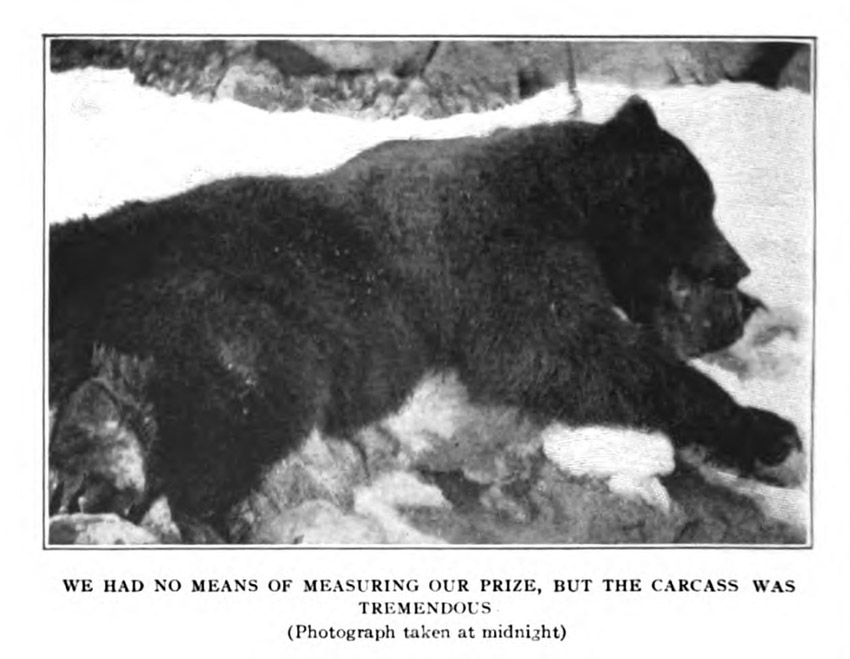
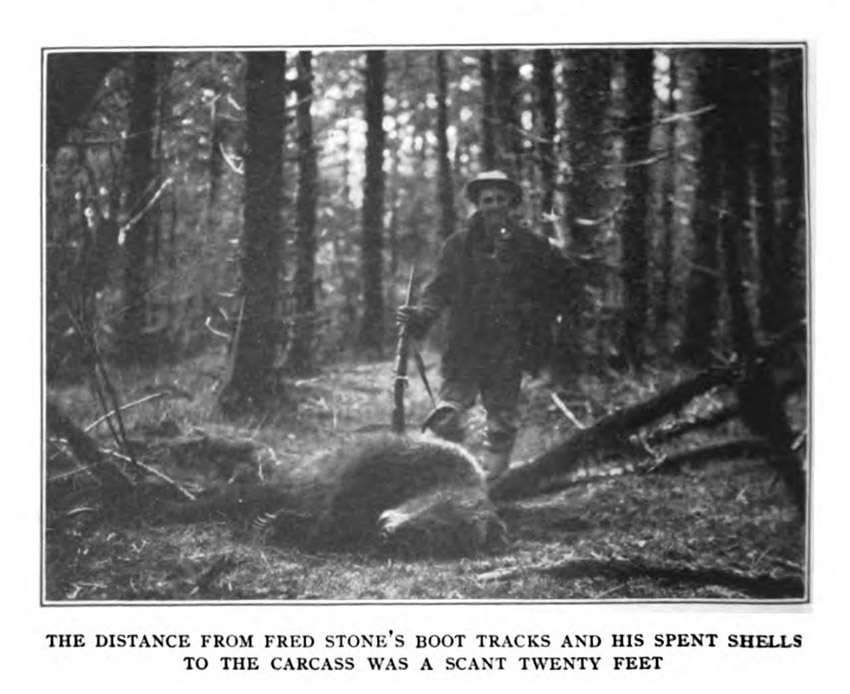
At 6.15 Jill notified us plaintively that she had discovered a brother to Jack’s porcupine and had taken a bite at him. By the time we had pulled the barbs from her nose our supper was cold.
“Well, it’s a good thing for them to get wised up early,” Fred remarked, wiping the blood and sweat from his person. “They’ll know enough not to tackle another porcupine. They’re mighty intelligent dogs.”
We were still eating—time, 6.44—when a voice outside the mess tent inquired, “Whose dog is that with his nose full of quills?”
We looked at each other and Joe commenced to laugh.
“Are there any dogs besides ours around this camp?” I inquired of the waiter.
“No, sir.”
It was nearly midnight before Jill ran down her second victim and raised us from our slumbers by her yells, but by that time we had become so dexterous with the pincers that we could feed each other soup with them, so we were not long in getting back to bed.
The next day it rained. It rains every day in this country, but nobody minds it. In fact, the residents declare they don’t like sunshiny weather, asserting that it cracks their feet. One Cordovan had undertaken to keep a record of the sunshine, on the summer previous, but had failed because he had no stopwatch.
Before setting out Fred called my attention to Joe’s rifle.
“It looks like an air gun,” said he. “It wouldn’t kill a duck.”
Joe yielded the weapon up cheerfully for examination, and it did indeed look like a toy. Its bore was the size of a lady’s lead pencil, it was weather-beaten and rusty, and the stock looked as if it had been used to split kindling.
“She’s kind of dirty now,” the owner apologized, “but I’ll set her out in the rain to-night, and that will clean her up.”
My experience with Alaskan grizzlies has shown me that they are hard to kill and will carry much lead, hence in close quarters a bullet with great shocking power is more effective than one which is highly penetrative; but when we suggested adroitly to Joe that he use one of our extra guns instead of this relic, he declined, on the ground that his old gun was easier to carry.
We splashed through miles of muskeg swamp toward the forest where the big bear had been seen. We sank to our knees at every step; low brush hindered us; in places the surface of the ground quaked like jelly. We were well into the thickets before the dogs gave tongue and were off, with us crashing after them through the brush, lunging through drifts, tripping, falling, sweating. For ten minutes we followed, until a violent din in the jungle ahead advised us that their quarry was at bay.
Joe took his obstacles in the manner of a stag, finally bursting through the brush ahead of us with his air gun in his hand, only to stop and begin to swear eloquently.
“What is it?” I yelled, hip deep in a snowdrift.
“Have you got them pinchers handy?” came his answer.
For five days we combed those thickets and scoured the mountain sides without a shot, for those educated bear dogs got lost the moment we were out of sight, and made such a racket that we were forced to take turns retrieving them. They were passionately addicted to porcupines. No sooner were they through with one than they tackled another, and when not wailing to be “unquilled” they “heeled” us, ready to climb up our backs at the appearance of any other form of animal life.
“If we saw a bear they’d run between our legs and trip us up,” declared Joe, disgustedly.
Deciding, finally, that this section was too heavily timbered to hunt in without canine assistance, we sought more open country, and the next high tide found us scudding down the sound in a fast launch towards an island which for years had been shunned because of its ugly bears. Not a week before a party of native hunters had been chased into camp by a herd of grizzlies, hence we were in a hurry.
We skimmed past wooded shores which lifted upward to bleak snow fields veiled by ragged streamers of sea mist. Into a shallow, uncharted bay we felt our course, past cliffs white with millions of gulls, under towering columns of rock which thrust wicked fangs up through a swirling ten-mile tide and burst into clouds of shrieking birds at our approach.
We anchored abreast of two tumble-down shacks, and, as the afternoon was young, prepared for exploration. Ahead of us, rolling hills rose to a bolder range which formed the backbone of the island. The timbered slopes were broken by meadows of brilliant green, floored, not with grass, but with oozy moss.
“We’ve got three guns in the party,” said Joe, noting the preparations of Little, the owner of the launch, “so I’ll take the camera instead of my rifle. If we see a bear, them dogs can’t trip up more than two of us, which will leave one man to shoot and one man to use the machine.”
For hours we tramped the likeliest-looking country we had seen, but the wet moss showed no scars, the soft snow gave no evidence of having been trod, so I suggested that we divide, in order to cover more territory. Fred and Little, escorted by Jack and Jill, headed towards the flats, while Joe and I turned upward towards the heights.
Far above timber line we found our first sign, and farther on more tracks, all leading down the southern slope and not in the direction of our launch; so away we plodded, over crater lakes half hidden and choked with fifty feet of snow, skidding down crusted slopes, lowering ourselves hand over hand down gutters where the snow water drenched us from above. In time we left the deeper snows for thick brush, broken by open patches, and a ten-o’clock twilight was on us when we spied a fresh track. The moss had slipped and torn beneath the animal’s weight, and the sharp slashes of the claws had not yet filled with seepage.
“He’s close by,” said Joe, shifting the camera. “Gee! I wish I’d brought my gun instead of this thrashing machine,” and for the first time I realized that I had a new, small-calibered rifle with me, and had selected this day to try it, not expecting to have to rely upon it.
At a half run we followed down the trail, for there was no difficulty in picking it up wherever it crossed an open spot; but, without warning, the hillside ahead of us dropped off abruptly and we emerged upon the crest of a three-hundred-foot declivity choked with devil clubs and underbrush, the tops of the spruce showing beneath us. Joe altered his course towards the right when I saw, over the edge and not thirty feet away, a grizzled scruff of hair looking like the back of a porcupine.
“There he is!” I called, sharply. “Look out for yourself!”
I stepped to the edge of the bluff, for after my first glimpse that angry fur had disappeared—and looked down directly into the countenance of the largest grizzly in the world! Halted by our approach, he had paused just under the crest.
I have seen several Alaskan bears at close range, but I never saw one more distinctly than this, and I never saw a wickeder face than the one which glared up at me. His muzzle was as gray as a “whistler’s” back, the silver hairs of his shoulders were on end like quills, while his little pig eyes were bloodshot and blazing.
“What luck!” I thought, wildly, as the rifle sights cuddled together, but in that fraction of a second before the finger crooks, out from the brush behind him scrambled another bear, a great, lean, high-quartered brute of cinnamon shade, appearing, to my startled eyes, to stand as tall as a heifer.
Now, I never happened to be quite so intimate with a pair of grizzlies before, and since that moment I have frequently wondered how they happened to impress me so strongly with the idea of a crowd. The woods seemed suddenly filled with bears, and involuntarily I swept the glades below to see if this were a procession, or a bear carnival of some sort. That instant’s weakness cost me the finest pelt I ever saw, for at my movement bear number one leaped, and as I swung back to cover him I saw only a brown flank disappearing behind a barrier of projecting logs. At that distance I dared not take a chance on other than a head shot, so I jumped back, peering through the brush at our level, hoping to see him as he emerged.
Joe rushed forward to the edge of the hill, as if about to assault the cinnamon with his camera, and stepped directly between me and where I expected bear number one to show.
“Shoot! Shoot! Give it to him before he gets up here,” he yelled, hoarsely.
“Get out of the way!” I shouted, with my eyes glued upon the vegetation at his back.

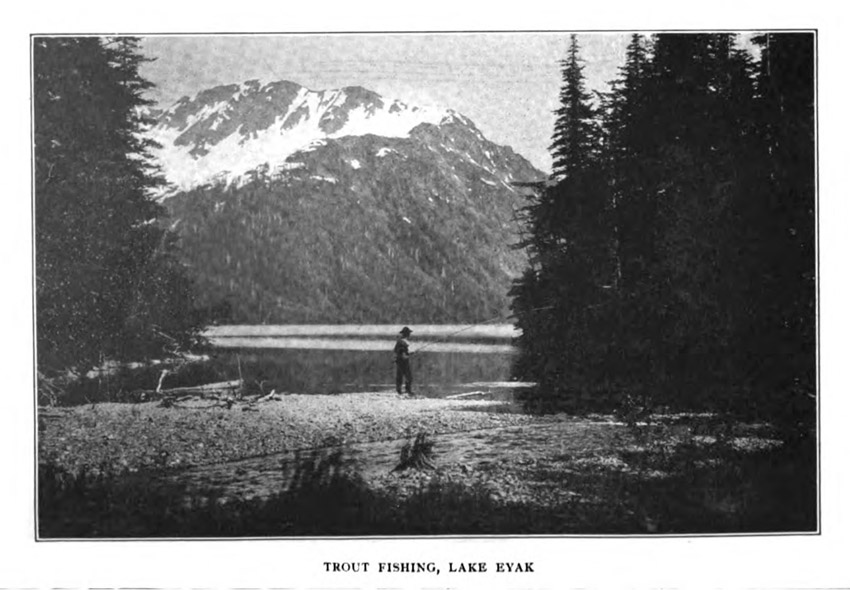
He was still screaming: “Shoot! Shoot!” when his voice rose to a squeak, for up through the undergrowth lunged the big cinnamon, nearly trampling him. The bear rose to its hind legs and snorted, while Joe did a brisk dance, side-stepping neatly from underneath his photographic harness and fairly kicking himself up and out of his rubber boots. Before either footgear or camera had ended its flight he had sized up the dimensions of every spruce tree within a radius of forty rods, and was headed for the most promising.
I dare say my own movements were purely muscular at the time. I got out of Joe’s way in time to avoid being badly trampled, only to glimpse through my sights a brown rump over which the brush was closing, and remember deciding that with five shots in an untried weapon I didn’t care to chance a tail shot, especially with that other big gray bear concealed within forty feet—and more especially since Joe had staked the only available tree.
In the days which followed I cursed myself bitterly at the memory of those white-hot seconds.
“Gosh ‘lmighty! If I’d only had a six-shooter!” panted Joe, regarding me with disgust. “Why didn’t you give it to him?”
“I wanted to get the big one first,” said I.
“The big one! You never saw a bear any bigger than that one, did you?”
“Yes; I tried to get a shot at the old gray one.”
“Do you mean to say there was two of ’em?”
“I do! And the big one was in yonder all the time. He may be there now, for all I know.” As Joe picked up the camera he said, very quietly:
“I guess your eyesight was a little bit scattered. You ’ain’t seen any bear for quite a spell, have you?”
I resented the innuendo, and began to declare myself vigorously, when he interrupted: “Come on! Let’s get after them,” and away we went up the mountain side, running until we were breathless, guided plainly by great patches of torn moss and heavy indentations. We ran upgrade until I stumbled and staggered from exhaustion; we ran until my legs gave out and my lungs burst; we ran until I feared I should die at the next knoll; and we kept on running until I feared I might not die at the next knoll. Up, up, and up we went, until, two hundred yards above, a moving spot amid the timber halted us.
“G-g-give it to him!” gasped Joe. But the sights danced so drunkenly before my eyes that it is a wonder I did not shoot myself in the foot or fatally wound my guide. Then we were off again across sink holes scummed over with rotten ice into which we broke, up heartbreaking slopes, and through drifts where we wallowed halfway to our waists. In time the tracks we followed were joined by others, at which Joe wheezed:
“By g-gosh! You—were—right; there was —two! Come on!”
But, having righted myself in his eyes, I petered out completely. My legs refused to propel me faster than a miserable walk, so I turned the gun over to him and he floundered away, while I flopped to my back in the center of a wet moss patch and hoped a bear would come and get me.
Ten minutes later I heard him empty the magazine, but as he reappeared I knew the shots had been long ones.
“Say! That old gray one made the brown feller look like a cub,” said he, and we were miles away from the scene before he broke our silence to remark:
“You were wise not to shoot. If I’d ’a’ known that big one was so close to me I’d ’a’ tore my suspenders out by the roots and soared up over the treetops.”
Stone and Little, having covered the flats unsuccessfully, were rowing into the mouth of the creek when we slid down the bluff above the launch, but at my recital of our adventure Fred went violently insane and was for setting out for the scene of our encounter at once. Eventually he was calmed and we rolled up for a few hours’ rest on the floor of the launch.
I was half roused by the coffeepot sliding off the stove into my face. A few minutes later the ashpan emptied its contents over me, and I awoke under a bombardment of dishes, oil cans, and monkey wrenches, to find the boat on her beam ends in the mud, with every movable thing inside of her falling upon us. Little was swearing softly in his underclothes and bare feet.
“The tide is out and she’s standing on her hands,” he explained. “Confound a round-bottomed boat, anyhow! “
We stood on the starboard wall of the cabin to dress, then walked ashore where there had been eighteen feet of water on the night previous, to cook our breakfast in the rain.
Up the hills again we went, determined to see at last what was in those bear dogs of ours. For five miles we trailed our game, across snow fields where their tracks were knee-deep, over barren reaches where it took all our skill to pick up the signs, until, without warning, the dogs gave tongue and went abristle. They were off, with us after them, the woods ringing to their music, the bears just out of sight through the timber.
It was during the next hour that I proved to my own satisfaction that a two-hundred-pound man, considerably out of condition, can’t outrun a bear. Perhaps it is because the bear knows the country better.
Half a mile after I had quit running I found Fred panting and dripping on the other side of a stream.
“Where’s Joe?” I called.
“At the rate he was going when I lost sight of him, he’ll be due in Nome about noon, if his boots hold out,” Fred answered, sourly. “Where’s Little?”
“Fallen by the wayside. How did you cross the creek?”
“I didn’t! I ran through it. I’m wet to the ears.”
“Those are nice bear dogs of ours,” I ventured, at which my companion’s remarks were of a character not to be chronicled.
‘“Kindly remit hundred dollars and feed only at night,” he quoted. “Say, if those laphounds ever crab another shot for me I’ll—”
“And I’ll do the same,” I declared, heartily; and we shook hands over the compact.
We found Little at camp, clad in a pair of bath slippers, drying out his clothes, but Joe did not show up until nearly ten that night, and then he came alone.
“Did you kill those college bear dogs?” we inquired, hopefully.
“I couldn’t get close enough,” he said.
“Did you get a shot at the bears? “
“No! About twelve miles back yonder those two picked up five more. Your eighty pounds of Mother Goose dog had four tons of bear on the hike when I quit. It looks like they’re heading toward the north side of the island, and if we take the launch around to Big Bay to-night we may be able to pick them up to-morrow.”
It was high tide when Jack and Jill appeared on the bank, and as Joe boosted them over the rail they beamed upon us as if to say:
“This has indeed been a glorious day, and we’ll make this bear hunt a success if it takes all summer.” We forbore to saddle them with what lay upon our souls.
We anchored in Big Bay as a three-o’clock dawn crept over the southern range, only to be awakened a few hours later by another avalanche of pots and pans. The launch was doing her morning hand stand, and I found a streamlet of cylinder oil trickling down my neck. Fred had been assaulted from ambush by a sack of soft coal, while the cupboard had hurtled a week’s grub into the midst of Little’s dreams. Joe alone was unconscious of his bedfellows, which comprised the rest of our cargo; he was slumbering on his back, snoring like a sea lion at feeding time.
A mile of tide flats glistened between us and the shore; on every hand the hills were white with desolate snow. Having dressed stiffly, propped at various angles, we ate a cold breakfast, for the stove would not draw, and had it drawn we could not have held the coffeepot against it; then Joe and I lowered ourselves into the slime overside, for Little had decided to stay with the launch until high tide, while Fred’s heels were blistered so that he could not wear his boots. We went without the dogs.
At nine that night I staggered wearily out from the timber onto the beach. A mile of mud lay between the bank and the water, and two miles beyond that I sighted the launch. Fred and Little heard my shots, and by the time I had reached the low-water line they were under way. Out another half mile into the creeping tide I waded, until it was up to the tops of my boots. I was utterly exhausted, my feet were bruised and pounded to a jelly, every muscle in me ached. For fourteen hours Joe and I had shoved ourselves through the snow, in places waist deep, crossing cañons, creeping up endless slopes until we had traversed the island and the open sea lay before us. Snow, snow, snow everywhere, until our eyes had ached and our vision had grown distorted.
We had found the tracks of those seven bears, but they were miles away and headed toward the west, whither we could not follow. We had become separated later and I had come home alone, ten miles as the crow flies, across the most desolate region I ever saw.
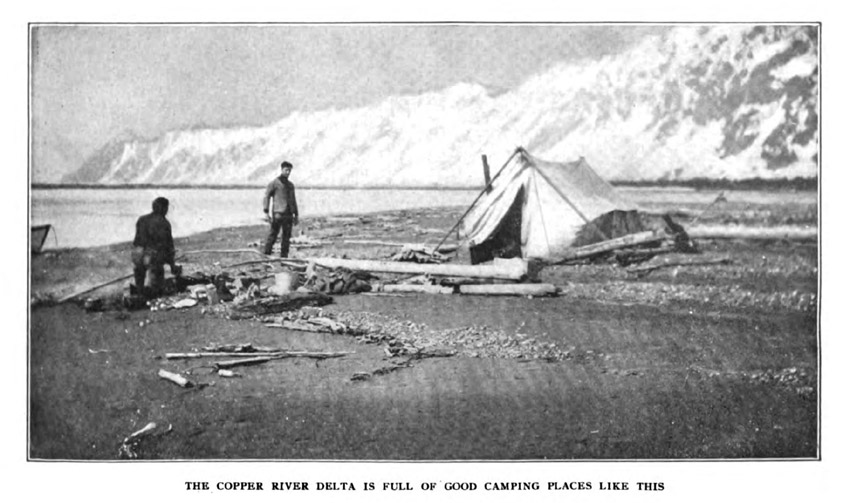
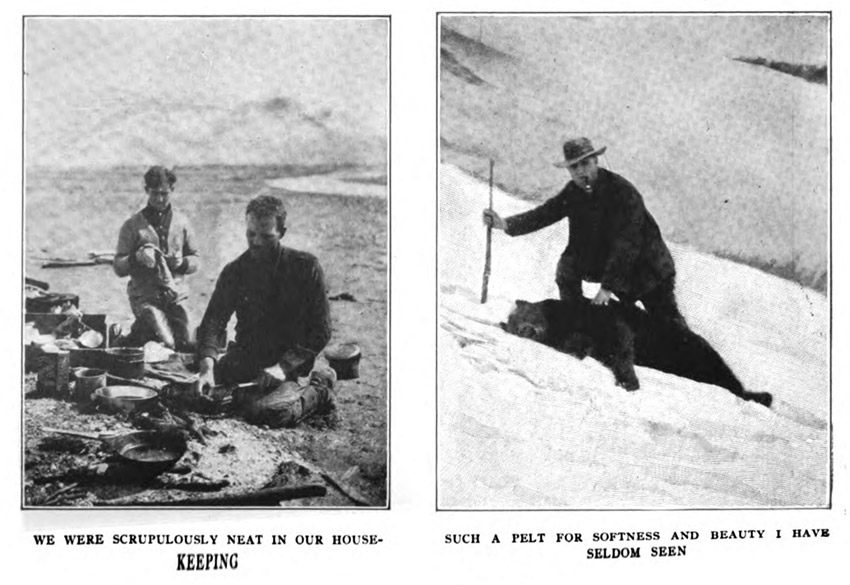
I had followed a herd of five bears several miles, but had abandoned the chase when it grew late. One track I measured repeatedly from heel to toe of the hind foot. It took my Winchester from the shoulder plate clear up two inches past the hammer.
Two hours after I was aboard we heard Joe’s air gun popping faintly. He, too, had followed those five bear tracks, holding to them an hour after my trail had sheered off. We had covered better than thirty miles of impossible going and were half dead.
The next day found us back at the cabins; for the north side of the island was too killing, and as Little had business to attend to, he left us, promising to send the launch back in ten days. Then followed as heartbreaking a week as I ever endured. Every morning we were off early, to drag ourselves in ten, twelve, perhaps fourteen hours later, utterly exhausted. Every noon we stopped to dry out over a smoky fire, for an hour’s work on the slopes threw us into a dripping perspiration, which the chill wind discovered at the first breathing spell.
Our feet were constantly wet from the melting snow, and the rain did what remained to be done. We stood barelegged and shivering in the snow, our feet on strips of bark, the while we scorched our underclothes and swore at the weather. Finally, on one particularly drenching morning, Fred and I struck and declared for rest. Our feet and ankles were so swollen that we hobbled painfully, while our systems yelled for sleep.
About noon Joe said this idleness palled on him and he guessed he’d take a little trip. If he didn’t get back that night we needn’t worry, as he intended to follow any trail he struck until he got a shot, if he had to sleep out in the rain for a week. He took no grub, his outfit consisting, as usual, of the hand ax at his belt and the popgun between his shoulder blades
“It’ll be just our luck for him to get a bear to-day,” said Stone. “It’s the first time in ten days we’ve laid off.”
“Maybe so,” said I, “but if he shoots a bear with that child’s gun and the animal happens to find it out, it may go hard with him.”
Two hours after dark we heard a voice outside the cabin:
“Hey! What do you think of this?”
We hobbled out in our sock feet as Joe flung from his shoulders a great brown skin the ends of which dragged on either side. The fur was deeper than a man’s wrist, the ears were a foot apart, the nose was curled in a ferocious snarl above the long yellow teeth.
“See here!” He held up a cub skin. “There was two other little fellers, but they got away.”
“What did I tell you?” Fred groaned. The fire of a consuming envy burned within us as we bombarded Joe with questions.
It seems he had struck a trail on the other side of the range, and although it was twenty-four hours old he had followed mile after mile, running most of the way to cover, before dark, the distance it had taken the mother and the cubs two days to go. It was growing dark when he overtook them, high up on a mountain side covered with patches of gnarled spruce and wind-flattened bushes.
“When I see I was close to ’em I made a circuit up the hill so’s to head ’em off,” he explained; “but I underjudged her, and she must have snuffed me.” He had told the first part of his story graphically, but at this point he closed his narrative in a sudden, matter-of-fact way.
“Go on,” we demanded, beside ourselves.
“Well, that’s all. Just as I scrambled up where I could get a peek I seen her right on top of me, coming full tilt, r’aring up on her hind feet every few jumps for a look. She must have snuffed me.”
“Yes, yes. Hurry up!” we chorused.
“Her nose was curled up just the way it is now and she was roaring something fierce. She was so close I seen her eyes blazing and all her hair on end, but those cubs—say, you’d ’a’ laughed at them cubs. They was snarling like dogs and all headed for my legs.”
“Good Lord!” I ejaculated, sizing up the skin, which was fully ten feet long as it lay, “she must have looked as tall as a house.”
“Yes, she looked pretty tall,” Joe agreed. “Have you got anything to eat handy?” But we forcibly gouged the rest of the story from him.
“Well, she was so close on to me that I knew I had to get her—so I—did. But you’d ’a’ laughed at them—”
“Where did you hit her?” we demanded.
“Oh, in the eye. See!” He laid his finger on a tiny hole half an inch back of the half-inch eye, which was still fixed in an ugly stare, He apologized as he did so. “You see, my footing wasn’t very good and I was half dead from running, or I’d have shot better and got her the first time.”
“Then you had to shoot again?”
“Oh yes; twice more. She fell at the first crack, and that give me time to reload. When she riz up again I tried for her heart, but she throwed up her forearm, and all I did was to break her leg. Look! That give me a chance, though, for when she jumped at me the next time her leg give out and throwed her off, so I sidestepped her. But those cubs! Say, they was the funniest things!” He began to laugh. “I wanted to catch ’em, but they was too big. They was snarling around my feet all the time and I was kicking at ’em so’s to get a shot at the old one. I had to knock this one down finally, which give me time to wallop the old lady in the neck. If I hadn’t been so tired I’d have run down them other two, but they was too fast for me. I chased ’em half a mile, but somehow I couldn’t get up to ’em. It’s too bad she snuffed me.”
Joe had returned, skinned the two carcasses, and packed the hides in through the deep snow, although the mother’s pelt alone was a heavy burden for a strong man on good footing.
The cabin walls were not large enough to hold the skin, so our guide stayed in camp the next day to flesh and salt it, while Fred and I made another unsuccessful journey, covering twenty-five miles of the territory where Joe had been.
Three days later, when Little sent back the launch, we were ready to quit in disgust and head towards the Copper River glaciers, for the bears seemed utterly to have forsaken this island. We could find no fresh signs, we could discover no indications as to where they were feeding.
A mile from the mouth of the bay we ran hard aground, and a falling tide left us high and dry, but held upright this time by the cabin doors, which we had removed and used as props.
“I’m going over into those woods where Little and I went the first day,” Fred announced, and Joe went with him, while I, disheartened, went fishing in the channel.
Having drifted opposite the mouth of a tiny creek without a strike, I rowed ashore and wandered aimlessly back into the open flat through which the stream meandered. It was the first time since landing in Alaska that I had been without my gun, and within three hundred yards from the shore I encountered fresh bear tracks. As I regarded them, a movement at my back caused me to whirl, and there, where I could have hit him with a stone, was my bear observing me curiously.
We looked each other over for several moments. We were both blonds, although his fur was a bit lighter than mine. When I moved, his hair rose; when he moved, my hair did the same. He was much the larger of the two. I matched him up with my dining-room rug, and he went all right. I must likewise have harmonized with some color scheme of his, for he took a step towards me.
Remembering that my hunting knife was in the gunwale of the skiff and my rifle halfway across the bay, I closed the interview and went after them. It was a nice cool day and I hurried a bit. I felt light in the body and strong in the legs, which provoked in me a sudden disposition to disprove my previous theory that a two-hundred-pound man out of condition cannot outrun a bear. You see, this was the first bear I had encountered which really matched my furniture, and—in fact, there were sundry reasons why I increased my normal speed of limb.
To stroll means to advance carelessly. I strolled up to the skiff so carelessly that I nearly broke a leg getting into it, then headed for the launch. Perhaps a rear view had convinced the bear that my hair was too stiff, or that I was not sufficiently well furred for his use; at any rate, he did not pursue me, and in fifteen minutes I was back again and had taken up the trail. Two hours later I stumbled out of the woods, sweaty, smelling of blood, and supremely proud of a wet, heavy skin which dragged upon my aching shoulders, its points trailing on the ground behind me.
It had been a matter of a quick, careful search with the glasses, a brown blot creeping across an open meadow, a lung-bursting detour to leeward, and then a breathless descent of the mountain side, till a fringe of brown hair showed through the grass. There had been a quick guess at where the shoulder should be, a vision of snarling white teeth, and a great bulk lifting itself up towards me; another squint at a hairy chest between two huge forearms, and then three snap shots which were all too high and tore the sod as the fellow went lumbering down the hill. Next a sudden breaking down of the hind quarters, and twenty yards farther a loosening of all holds and a crash into the bed of a trickling gully.
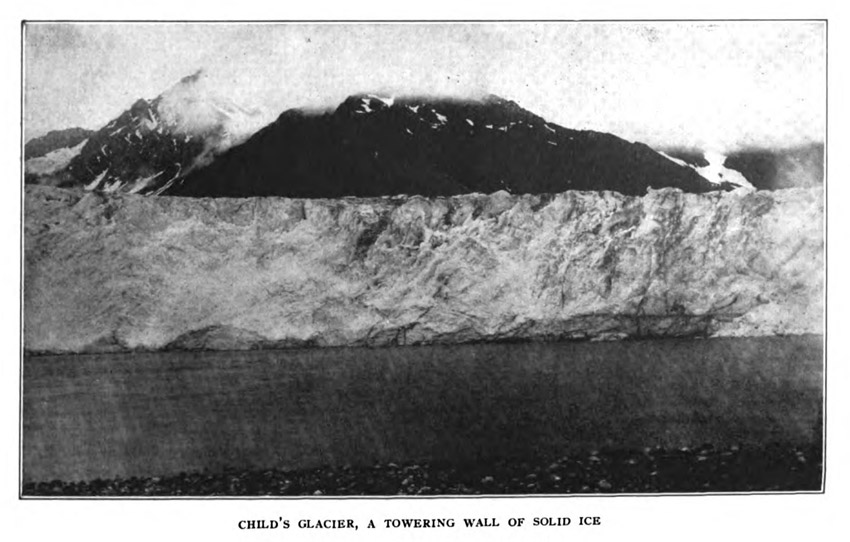
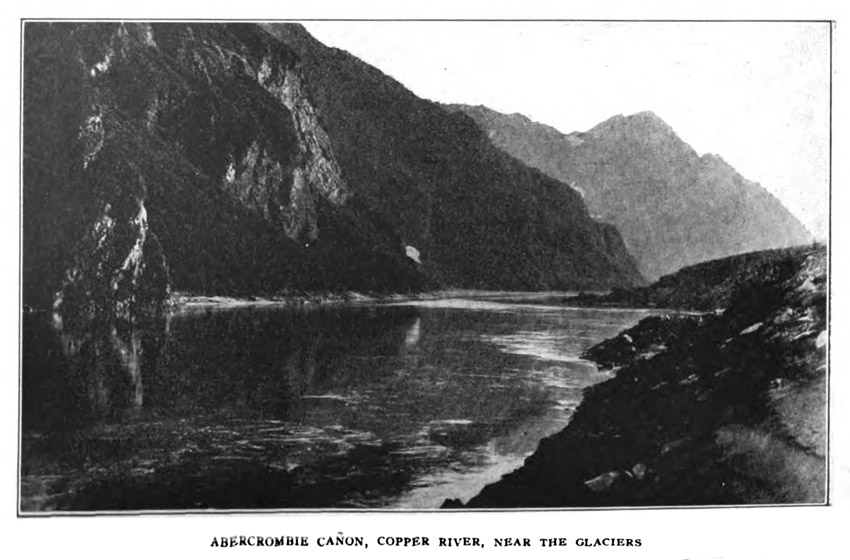
As I gloated barbarically over the magnificent carcass, up from the woods across the bay came the sound of four quick, faint shots, “Bang! Bang! Bang! Bang!” as if Fred and Joe were answering my recent fusillade.
It took me an hour to finish the skinning, and as I reached the launch I heard wild shouting across the mud flats. On the fringe of the timber I saw the two boys.
“Somebody’s hurt,” exclaimed the engineer, but those yells carried a different note to me.
“They’ve got a bear!” I yelled, gleefully. “Fred has got one at last.” And ten minutes later, while still a half mile distant, he began to tell me about it. I answered with my story, neither of us distinguishing more than the din of his own voice.
“I got—” came Fred’s rejoicing, while the sun glinted on Joe’s white teeth “—big grizzly, color—match—bungalow EXACTLY!”
I ran towards them, joining in a muddy war dance on the sand bar which had so kindly delayed our departure.
We all talked at once, but my companion had more ground for joy than I, for this was his first bear, and it had charged unexpectedly at a distance of fifty feet.
“She was coming so fast when I saw her that I didn’t have time to get scared,” said Fred, “and it took four shots to drop her.”
“He only had four shells in his gun,” Joe chimed in, admiringly. “He could almost touch her when she fell.”
“We came back for you and the camera. Get your gun quick and come with us; you never saw so many bear signs in your life.”
“They’ve all left the hills for the flats,” declared our guide. “That’s why we’ve had such bad luck. We’ll get a boatload before dark.” So, taking time to gulp a mouthful of cold food, we headed back towards the thickets where Fred had disproved the old theory that your bear is a peaceful brute and will never deliberately attack a man.
Within a mile of the launch Fred and Joe had picked up the trail of two big grizzlies, so fresh that the moss was still creeping and straightening where they had stepped. In the more open stretches of the grove the sunlight glinted down through the spruces, allowing the boys a considerable view, but for the most part the thickets were nearly impenetrable. The moss was like a velvet rug, so noiseless that only a snapping twig or a rubbing garment served notice of their approach.
They had been skirting a marshy slew tangled thickly with alders when they heard a sudden commotion behind them and the rush of some great animal through the undergrowth.
“There he comes! Give it to him!” Joe had yelled, and, emerging from the brush fifty feet distant, had come a big gray fellow headed directly at them, running in utter silence. Fred had never killed big game nor seen a bear at large, but years on the range and over the traps had quickened his eye and edged his muscles, and his shot went true. It is incredible that any living thing could have stood before those high-powered bullets, nevertheless that bristling body had never flinched nor wavered.
“Give it to him again,” Joe had barked, hoarsely, and Fred obeyed, for it had been not a question of a clean shot, but simply of emptying the magazine into that swiftly coming thing before it was upon them. The second missile likewise had gone true, but still there had come no sign from the silent animal, and again Joe cried out. The brief delay while the lever fell and rose had brought the brute into an open glade and past all obstructions.
I remember thinking, up there on the hill across the bay when I heard those four shots: “Both boys are firing. Those reports are too rapid to come from one gun”; but Joe had promised first blood to Fred and he never pulled trigger during the entire encounter.
At the third shot the bear went to its neck and rolled a complete somersault, but its rush brought it up to its feet again, closer now and still coming. At the fourth report, however, it sank to its haunches, swung its head from side to side, thrust out a massive forearm, and settled at full length as a tired man lies down.
“Give him another one to make sure!” Joe directed, but this time Fred’s carbine clicked on an empty magazine. He stepped to the guide and gravely shook his hand, then asked: “Am I as white as you are, Joe?”
Joe grinned. “Well, you’re pretty white,” said he.
“But I got him!”
“You sure did!” Then they shook hands again.
When they led me to the scene of the tragedy, I paced the distance from Fred’s boot tracks and his spent shells to the carcass, and it was a scant twenty feet. Every mark was plain in the soft ground, even to the leaps of the bear, which we traced back across the twelve-foot stream to its hiding place; and I wish, at the risk of arousing the ire of every peaceful naturalist and nature singer who may read this, to go on record as vouching for the truth of this encounter. I assert this upon the evidence of my own eyes and the words of my two companions. The bear was a female Alaskan brown grizzly, so called. She was alone, without cubs, and she deliberately attacked two hunters who had passed her and were walking away, crossing a creek to get at them.
We hunted these woods for a week with varying success; then, as we were anxious to be off for the glaciers, in a moment of weakness we put Jack and Jill in for a drive, while Fred and I took stands on the beaten trails. It required thirty-six hours to retrieve those dogs, for they became separated from Joe while in chase of a fretful porcupine, and could not find their way back to the boat. When we reached Cordova we gave them to a man whom we did not like, first exacting from him a solemn promise that he would give them a bad home and treat them unkindly.
In the brief time we had been camped on the island the railroad had stretched itself onward to the lower crossing of the Copper River, so we loaded a skiff upon one of Mr. Heney’s flat cars and saw it safely into the muddy waters of the stream.
The Alaskan glacial region, for which we were bound, is very extensive; in fact, the entire coast from Wrangel on the east, which lies close up against the Canadian border, to Cook Inlet, a thousand miles west, is ice-burdened. The north Pacific thrashes against the base of a saw-toothed range which sweeps in a great curve, forming the Gulf of Alaska, and it is this towering, jumbled confusion of peaks which mothers the ice fields. The heights in places are saddled with prodigious areas of ice, the spurs of which creep down through rents and gaps to lower altitudes, or grind their tortuous courses outward to the sea. Those which front navigable waters have been well stared at by a generation of tourists, but there are other fields which lie back from the coast and are but vaguely mapped, as, for instance, those which debouch upon the Copper River at the head of the delta. It was thither that I had been aching to go these two years past, and it was thither we were headed now in our skiff, the river having finally broken, to investigate for ourselves this place of mystery, to see at close range those famed bear tracks which had smoothed the rocks.
Considerable ice was running, among the hurrying fragments of which the head of an occasional seal glistened. The delta was bare, but the mile-high mountains at our left were white wherever the cliffs were not too steep. Every crevice and gutter amid the peaks emptied itself at midday in a cascade of snow, and, warmed by the sun, the whole range rumbled under these avalanches, some tiny, some huge, all adding to the vast snow-dumps at the foot of the wall. Whenever, with the glasses, we observed a trail crossing these up-tilted white fields, we landed, crossed the flats, and waded up to it. If it was recent, we followed; if not, we resumed our laborious journey, for there, apparently a half day’s trip ahead of us, beckoned the glaciers. But when we camped the first night, in a bleak thicket of willows, although a goodly distance lay behind us as payment for our day’s effort, we seemed no closer to our goal.
It was raining the next morning, but Joe and I were off early along the foot of the steeps, and a mile from camp we saw a bear approaching leisurely. We crouched, watching him through the glasses until he dipped out of sight, then we ran as far towards him as we dared. Again we waited, under cover this time, but he did not reappear, so I swung up the mountain side over a bluff, while Joe advanced along the valley. Before I could reach the crest of the ridge, however, I saw my companion aim up a gully and heard the “spat” of his rifle. He emptied his magazine twice before I emerged upon the summit —with the animal seven hundred yards beyond and above me.


Together we aroused the echoes, but the snow gave no evidence as to our aim, and when the bear made off along the mountain side Joe set out like a Marathon runner to parallel his course. I shouted directions and guided him by my waving arms, for there was no hope of my catching up. With a lucky shot, when the bear showed against the nose of a promontory, Joe inflicted a foot wound, at which the animal paused an instant to snap, and then together they dipped out of sight, to show again a mile farther on, running neck and neck.
I descended and followed for a time, then headed back towards camp in disgust, only to see approaching across the very bluff whence I had signaled, another bear, the counterpart of Joe’s running mate. I sized up its course, then, backing out of sight, commenced to climb. Lord! How I climbed. It was like running up the endless slope of a slippery church roof.
When I played out completely and could go no farther, I crept out for a look, but the snows were as clean as paper. Manifestly some whim had altered Bruin’s route and he had gone up that same seam by which the first bear had eluded us. That meant more climbing, now, so up towards the summit of the five-thousand-foot range I scrambled, while the higher I went the steeper it grew and the louder I puffed. Eventually the snow field I was ascending narrowed into a gutter between bold cliffs through which had poured the countless tons forming the great drift below. I came into a chute where the bottom was like glass and where I was in fear some playful avalanche might send me whizzing down that two-thousand-foot toboggan. Below and back of me lay forty flat miles of alluvial plain; in front of me the wall reared itself to perpetual white.
I was wheezing upward on all-fours, my lungs bursting, my pores dripping, when I saw the bear crossing over my head where the defile widened, funnellike. It was similar to target practice up the slant of a spire with nothing to indicate the range, but some unnatural movement of the brute told me I was shooting close. Before I could recharge the magazine, however, he was across the slide and swallowed up in the alders. Another hard climb, and the red snow told me he was indeed wounded. But how to get him out, now that he had the advantage? I gouged more toeholds with my Remington and pursued my ascent until the snow lay at such an angle that I feared my weight might start it, then crept gingerly into the brush.
An hour later I was still flattened against the slope, working my way through the hanging alders, when I spied Joe far below me, returning. He heard my signal and came toiling upward.
“Mine got away!” he called, when within speaking distance, “but this feller won’t get far, bleeding like that.”
Together we wormed our way through the tangle, here searching out a broken twig, there noting a leaf spotted red. We were perched upon a ledge thickly obstructed with vegetation, when the bear rose to his haunches immediately in front of us.
“Let him have it!” said Joe, kneeling to afford me room. “I ain’t got but one shell.”
“Look out for your ears,” I cautioned, aiming over his shoulder. It was a hard shot at those two red eyes through the leaves, for I was contorted and unbalanced by the slanting alder trunks and my footing was insecure.
“You got him!” Joe cried, but when we advanced the animal had disappeared as if by magic, leaving neither trace nor trail.
“He’s down yonder somewhere. I heard him fall.”
We could see nothing, so we lowered ourselves blindly, swinging clear in places, trusting to roots and branches, until we were halted by a sheer drop and must needs climb back by crevice and finger-hold, then worm ourselves sidewise for a hundred feet to an easier point of descent.
Sure enough, the bear lay wedged in between the snow and the foot of the precipice, three hundred feet below where I had shot, and when we had boosted him free, away he went again, rolling, tumbling, somersaulting, his tongue lolling, his legs flopping loosely. We planted our feet, and, leaning back against our rifles, skidded after. A clump of willow tops saved him and us from a plunge into the stream—and we had him. Such a pelt for softness and beauty I have seldom seen. It matched the library, and I am ankle deep in it as I write.
After the first day the speed of the waters rendered oars useless, so we bent a hundred-foot line to the bow of our skiff and another shorter one to the stern, then gave ourselves over to the labors of “lining.” The two men on the forward rope gave us motive power, while the third member of the party steered with the stern line.
Day after day we bent to our towlines and toiled onward, with the muddy water boiling past, and still those glaciers retreated ahead of us. Gradually the current became swifter and the floating ice larger, until to avoid it became a matter of importance. This rendered the rear man’s duties more difficult and required the exercise of some skill and judgment, for it is no infant’s task to navigate a heavy-laden, flat-bottom skiff up through a freshet clogged with 40 h.p. bergs, every one of which is exceeding the speed limit. An insufficient drag on the stern line and the craft may be ground to splinters against the rocks; a pull too violent and the bow is thrown across the current at such an angle that the vicious force of the waters capsizes it. In either event the outfit is lost.
The banks were overhung with “sweepers” and thick with brush, through which we wormed our way and around which we passed our ropes. When we undertook to make a crossing, in spite of our most frantic efforts we landed far below. And we were not in the main river, by any means. We waded bars waist-deep; we fell in up to our ears; we tugged and hauled with aching arms and blistered palms, virtually ascending that stream hand over hand as a man climbs a rope. We worked until we were all in, then camped, or went hunting, for it was daylight always, excepting only an hour’s twilight at midnight.
On one such night we scaled Sheridan Glacier, a great, dead thing of ice and desolation which lay back next to the range, separated from the river by a confusion of lakes and ponds and beaver dams. These dead glaciers differ from live ones only in that they are now motionless and gradually melting year by year as the elements prey upon them.
We began to feel that we were entering another world, a region of wonders where living things were minute and inconsequent and where the dead forces of nature were so hugely manifested as to dwarf all else, and, while ostensibly we were hunting, in reality we were merely looking. All day the narrowing mountain walls rumbled with avalanches, all night the faint thunder of rending glaciers and tumbling bergs rolled down upon us. In miles the distance we had to traverse was not great, but in labor and isolation it was tremendous.
Late one June evening, after a killing day, we stumbled up through a gorge where all the waters of the Copper River are confined. It is a roaring place, for the waves lift themselves head-high and the ice scuds by with the speed of wild horses. An Arctic twilight was over all—that diffusive radiance through which the sight travels so far—when we finally rounded a bend into an eddy, and paused to breathe and to observe that Thing which loomed suddenly before us.
I hope never to lose the memory of that first impression. There was Childs Glacier at last, with the ravenous river gnawing at it, a towering wall of solid ice, serrated and seamed, the dead grayness of infinite age upon its face. And so close! We fairly felt its presence before we sensed the chill breath which swept down from it. There were no intervening miles to rob it of its grandeur; its very proximity was terrifying, it was so strange, so unknown, so lifeless, and yet so menacing.
We heard ourselves exclaiming, but our spoken words were a profanation in such a presence.
A great berg, an acre in extent, came swiftly towards us, the saffron waters licking at its sides. It was as blue as a summer sky, and it came as if gliding on steep, well-oiled skids. When abreast of us it halted, then lifted itself up, up, up until it towered like a ship in dry dock, while the yellow flood roared savagely at the delay. There came a dull rumbling and grinding, much like the sound of a heavy train in a tunnel, as its own momentum and the resistless force of the river drove it higher and higher upon the detaining bar. It shuddered, swung slowly, then commenced to roll before the current like thistledown in a draught. The sound ceased, the mass dived suddenly from view, then reappeared slowly, shook off the surging waters, and was away again, running faster and faster. Silent as a ghost, it vanished around the bluff below us.
We bent our puny efforts to the skiff and crept onward, our eyes too busy to heed the boulders which tripped us and rolled beneath our feet. Gradually the bluff beneath which we walked became higher and steeper until it must have been fifty feet high and overhung as if cut out by the action of a heavy surf. At the time we did not note the significance of this, for we were engrossed in the spectacle opposite; but later we had ample cause to remember the peculiar formation.
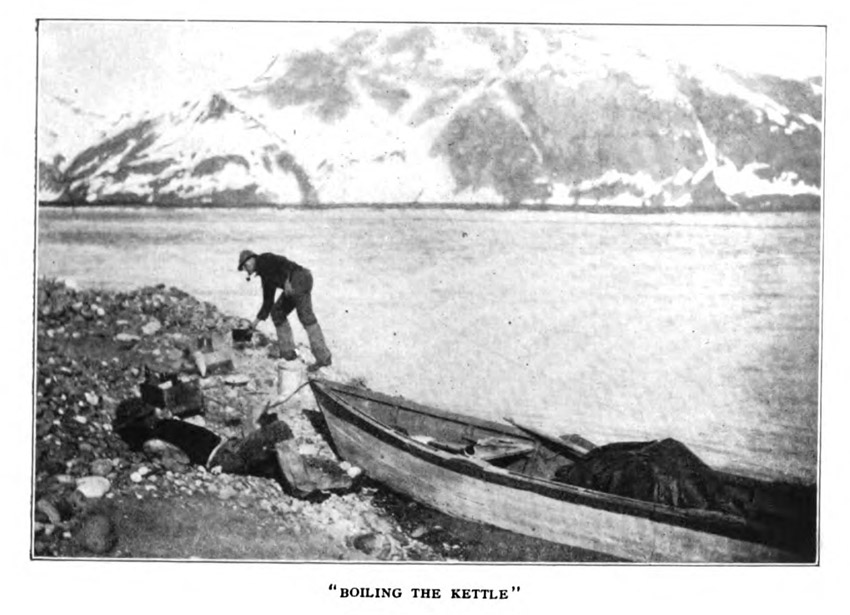
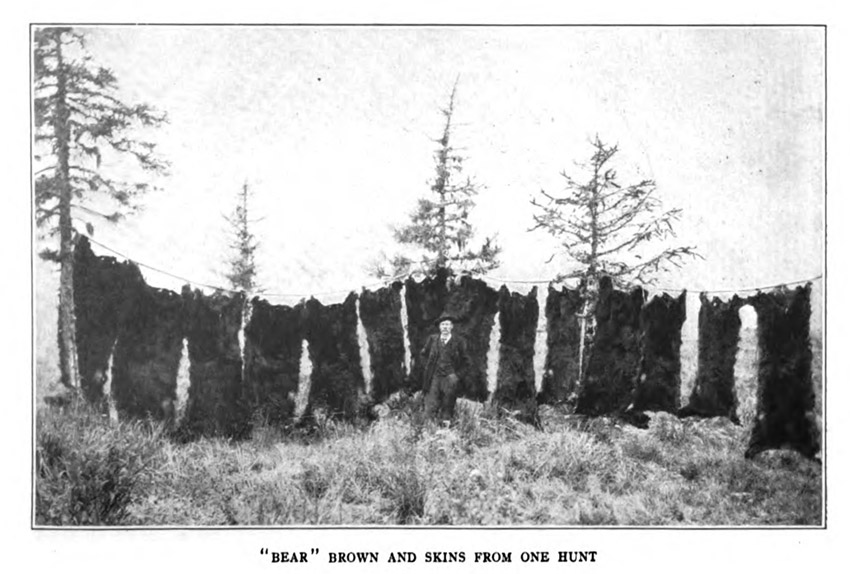
In places the ice wall opposite was like crusted snow, again it was opaque or cloudy, while beyond or above were patches ranging from pale azure to the purple that lurks in a mountain valley. These vivid colors lay often in ribbons, and the melting streamlets from above had likewise laced the glacier’s front with delicate chocolate lines like the wrinkles in the face of a hag. And always the hungry river gnawed it.
We were opposite the lower shoulder, where the ice cliffs overhung, when the glacier spoke for the first time. There was a boom like the report of a cannon many times multiplied, and a half mile ahead of us a piece of ice detached itself, then plunged a hundred feet sheer downward into the river. It left another blue scar for the air slowly to bleach. We had heard of the peril from falling bergs—stories of boats swamped by the waves, of men caught beneath the overhanging banks and swept away—but we had put them down as fanciful and exaggerated, so when Joe dropped the towline and dashed excitedly back towards the skiff I was inclined to laugh.
“Look out for the boat!” he cried.
My answer was framed when the surface of the water upstream seemed to hump itself and a swell came curling down along the shore, urged by the current. It was coming faster than a man could run and, although insignificant at first, of a sudden it assumed the proportions of an ocean roller. We seized the gunwales and plunged in up to our waists, but the water sucked away from the shore while the boat bumped and slid and tilted over the rocks; then, as suddenly, we were submerged to our armpits and found ourselves struggling to discover bottom and to keep the skiff from overriding us as we were swept up the embankment.
“Hold fast!” we yelled to Fred on the end of the line, and he set his heels against the rocks, wrapping himself with the rope like the anchor man on a tug-of-war team.
We felt bottom again, and again we were sucked downward, with our arms half dragged from their sockets.
When the commotion had at last subsided and our badly wrenched and now badly leaking craft was again in the river, Joe observed:
“One more of those and we won’t have any boat. And that was a small one, too!”
It was perhaps ten minutes later that a tremendous sound echoed behind us and we whirled to see such a sight as I had but vaguely dreamed of. Directly opposite the point of our encounter with the wave a towering column of ice had split itself away from the face and was leaning slowly outward. Faster and faster it moved, its summit describing a great arc, until with one terrific roar it plunged its length across the flood, flinging tons of water up, up until they seemed to reach the level of the glacier top itself, only to fall back and add to the chaos beneath. The ice did not crumble nor break, but fell proudly in solid column, stretching a third of the distance across the river’s bed, its vast bulk damming the stream.
It was much as if the Flatiron Building had leaned forth from its foundations and plunged to destruction. At the moment of impact there was an explosion as if from a terrific charge of powder, which hurled missiles a hundred pounds in weight in long parabolas across the torrent and far into the brush beyond. Then out from beneath the mass rushed a gigantic wave, growing as it raced towards the shore where we had been but a few moments before.
We heard the sound of that tidal wave as it bore down upon the fifty-foot bluff which we had just passed. And we now recognized the force which had cut it out—a quarter mile of it—and had changed a slope into a perpendicular wall up which no man could possibly have climbed. To be caught in such a trap would have been to perish certainly. We saw the wave engulf the land, then surge over and beyond it up into the alder trees, which swayed and whipped each other frantically. It was terrific, appalling, unspeakably tremendous.
We found ourselves straining at our boat in an endeavor to avoid the path of that swell, but the furious current all but killed it before it reached upstream to us and we were merely bruised and battered as before. Had we been ten minutes later, however, it would have meant our destruction. Twice more did this thing occur before we had covered those treacherous three miles along the glacier, but each time we were above the scene and the racing current saved us.
I think we grew somewhat frightened, walled in against that Presence by the steep banks; at any rate, at every explosion we fetched up violently at the end of our towlines, backs to the wall, like tethered steers, and when the last unstable precipice was behind us we congratulated ourselves.
But an even greater wonder confronted us. The river turned at right angles and there stood Miles Glacier, the big brother to Childs, which we had just passed. It fronted us boldly, a gunshot distant, so it seemed, a huge, desolate monster thrice the size of Manhattan Island, with a ragged base five miles across, wedged into a valley so tightly that it seemed to split the mountains asunder. In reality it was four miles away, but we saw its every smallest detail and followed it with our eyes up into the range until it melted into distances which no man has ever covered. Its edges were dead and blackened as if by decay; in places its front looked like a row of gigantic white-cowled monks. The lake which lapped it, in reality a broadening of the river, was choked with drifting ruins of ice held prisoner by a bar at the lower end where the waters escaped. Pastured thus, the bergs cruised lonesomely, drifted by wind and wave, towed in fantastic figures by unseen eddies. At times they clashed, or charged in long formations, as if this were a martial field for those two dead, yet living, rivals which had roared and gnashed at each other since the beginnings of time.
The vanguard of Mr. Heney’s army was here—a handful of engineers drilling for bedrock on the site of his upper bridge. That bridge, by the way, now spans the river between the ice fields, allowing the railroad, which dodges past the face of one of them, to avoid the other by crossing back. That little zigzag meant millions of dollars in steel and rock and cement, but beyond lie countless tons of copper ore.
We camped on the promontory which lies between the glaciers, where some day will stand the most famous tourists’ hotel on the continent, for the time is surely coming when men and women will journey thither from all quarters of the globe. Day and night, at intervals, the giants bombarded each other, the action increasing with the rising waters. It awoke us in the night, it awed us in the day. It filled us with a sense of such tremendous destruction that we watched jealously, as if each spectacle might be the last. The mind could not grasp the fact that, no matter how great or how rapid the ruin, there was an inexhaustible supply of ice constantly edging forward to take the place of that which fell off. We felt as if the glaciers must surely destroy themselves, but a week of warm weather, during which the breakage was constant, had no visible effect upon them. As a matter of fact, those glaciers are still there, although they have been working for several years, so many years, to be exact—and let us be exact— that if a geologist were to begin to figure it out when he left college he would have a gray beard so long it would trip him up before he had finished the problem.
After a particularly large cave-in it was the custom of the engineers to search the rocks for king salmon thrown out by the waves. The bears were likewise fishing up at the rapids—the surveyors had seen them through their transits—so on the afternoon following our arrival we set out across the lake, searching our way through the drift ice.
“Look out for the eddy below the cataract,” they admonished us. “If your boat gets into that you won’t get out. Keep as close to the glacier as you dare—but not too close, either, or a tidal wave may swamp you.”
Out on the lake we began to feel more fully the immensity and the desolation of this place. We were in a forgotten spot where man’s presence was a desecration. Out through every rent and crevice in the mountain walls glaciers large and small stared at us with dead, blind eyes. Floating all about us were bergs from the size of a water goblet to the size of the Lusitania, and they were green or white or blue or purple; some carried cargoes of dripping mud, others were weighted with piles of rock. Sometimes they rolled as if weary of their prehistoric burdens or as if seeking more easy positions, each movement uplifting new angles and utterly changing their outlines. We traced features of men and shapes of beasts in them. Some wore preposterous hats, millinered by the sun itself. They filed about in an aimless yet ordered confusion, pirouetting, bowing, sailing off at apparently causeless tangents.
It was a goblin place until one recognized the forces which did the shifting as nothing more supernatural than currents and rips formed by the great cataract which dashed in from above, together with the hidden stream which flowed out from beneath the glacier itself. Repeatedly we found ourselves spinning in the grip of an eddy, with a herd of icebergs wallowing behind us. I remember one sea-green fellow which followed at our stern, lunging after us no matter whither we turned, or were turned, and which it took us several minutes to shake off.
We landed, then worked our way up past the cataract, where the river leaped and bellowed and the snow banks overhung. It was much like the Royal Gorge below Niagara, only there were no plank promenades nor souvenir postal cards. The opposite side was a sheer mountain slope slashed here and there by snow slides. On one of these we saw a bear. While we were watching him, another one came in sight a half mile upstream. The two crept down to the edge and began to fish, standing motionless above the eddies where the salmon rested, to execute at intervals a lightning-like flip with their forepaws and send a silver fish whirling out upon the bank.
The first animal was in range, but Fred declared its color was wrong.
“If you get him he’ll cost you a new carpet,” he said, so we crept up opposite the other, the tumult of the cañon drowning our approach.
It was a long shot, but we wounded him, then, realizing that he would surely roll into the flood if he loosed his hold for one single instant, we allowed him to scramble up into the brush and then prepared to go after him. It meant a nine-mile trip back over the moraine to our boat, out through those ice fields and eddies to the western shore, then up along the side of the cañon and into the brush, but it promised a new problem in the way of bear hunting, namely, first to search out the bear, then to hold him against the mountain side; so we turned back.
We were a mile from our skiff when Joe paused.
“Look! Look at them tracks!”
We whistled in unison, for in front of us was a trail so huge as to seem unreal and so fresh that we cocked our guns nervously.
“Let’s get after him!” we whispered, and away we sped over the glacial debris, picking up the track wherever it crossed the snow. On the rock ridges we went by guess, craning cautiously into each gully and past each summit, for the ground was indescribably broken and we did not wish to step on this particular bear.
It was Joe’s good luck—we chose to call it luck—to get the first shot. He was hidden from us when we heard his toy rifle speak and tore madly in the direction of the sound. Half a minute later “Spat!” it went again, and then came two more shots in rapid succession. It was worth a man’s life to run on such jagged footing, but we had an idea that this was to be a battle and we knew that Joe was alone with the largest animal we had met.
Sure enough, as I dashed across a snow field, I saw our guide suddenly appear on the ridge above me like a phantom, silhouetted against the evening sky. He was bareheaded—it took us three days to find his hat—his rubber boots were straddling at a ridiculous distance from each other, and he was hitting it off at the rate of one hundred yards in nothing and three-fifths seconds. He was looking backward over his shoulder, fumbling at his hip pocket for shells; nevertheless, he coursed over those loose boulders with the sureness of foot of a mountain goat. He dipped out of sight as suddenly as he had appeared. I heard him cracking away again, then the louder report of Fred’s rifle.
An instant later I reached the top and, glimpsing a huge brown body rushing towards us in prodigious leaps, I joined in the fusillade. The monster’s great weight bore him deeply into the snow, which he flung behind him at every plunge, and yet, shocked and torn by those exploding bullets, he still came on and on, a tremendous, ungainly figure of rage and determination.
Even when he was down to his haunches and deathly sick, he reddened the snow in a futile endeavor to continue that charge. It was a magnificent exhibition of courage, and he died facing us, as befits a monarch, the red glare of rage still in his eye.
“Whew! I certainly stepped around a bit that time,” said Joe, wiping the sweat out of his eyes. “My first four shots never fazed him, so I thought I’d sort of withdraw and reload on the run, but I couldn’t seem to locate you fellers nowhere.”
We had no means of measuring our prize, but the carcass was tremendous, so large, in fact, that our united efforts were barely sufficient to roll it over. The skin stretched twelve feet in curing.
We ate our midnight supper on the sands beside a driftwood fire, then rowed out through the whirling eddies and around to the opposite shore, for we had not forgotten that wounded bear. A mile over ice and mud brought us to a wide, swift slew which we did not know existed and which was running ice. We were tired of detours, so we stood ankle-deep in the slime beside a snow bank and undressed, then, with our clothes and rifles above our heads, we waded in.
It was very funny! In fact, it handed us the best laugh of the trip. When Joe rose upon his tiptoes and gingerly ballet-danced into that yellow stream, Fred and I shrieked with glee, he made such funny noises and looked so white and tender. From the farther bank he turned upon us a drawn and sour visage, which changed at sight of Fred, who had suddenly fallen silent at feel of the water.
Never in the same space of time have I endured more bitter suffering than that glacial stream inflicted. When halfway across I stumbled on a boulder and dived completely out of sight, holding desperately the while to my bundle. The other boys choked and chattered hysterically. To dress in dripping garments on a snow bank at 3 A.M. is perhaps the king of outdoor sports—it makes one feel so manly and strong and rheumatic.
We chipped footholds in the misted snow-slides which overhung the rapids, creeping cautiously along slopes where a misstep or a slip meant a downward shoot of a hundred feet into the torrent. We were clinging thus at one point when two brown bears met us, but there was no chance to save them had we fired, and they were off after one frightened whiff of us. Nor could we find the fellow we had wounded, search as we might, so back we went across those hair-raising, slippery toboggans again, balancing in the toeholds we had previously made. Again we waded Chinaman Charlie Slew, with its slush ice up to our chests, and, thirty-six hours after leaving, dragged ourselves back into camp.
To the hunter there is an unwearying variety to his “kills,” yet in the telling I dare say they are all much alike. One episode, however, is worth recounting. In crossing a torrent by the familiar tree-trunk route Fred met a black bear which seemed late for an appointment.
Off it went into the foam below at the first shot, only to rush out and up the hillside, with Fred teetering on his perch like a canary and firing at every glimpse. The animal had gained complete cover when it released all holds and came rolling back down into the torrent, to be swept away, with Fred legging along behind until he could wade in and drag out his victim by the ears.
We had matched all the shades of our wall paper now, save only that in my blue room, but a blue, or “glacier,” bear, rarest of specimens, is killed perhaps once in a lifetime. I scoured the glaciers until I went snow-blind and could not tell a black from a grizzly. We saw a pair of blues one night on the Miles moraine, and followed until our legs gave out, whereupon Joe left Fred and me behind and continued the pursuit, returning empty-handed after a total of forty-eight hours’ travel.
Time was when I dared any man to outlast me, but subways and pavements and hotel cooking have so ruined my usefulness that a paltry thirty miles of hill and valley renders me a burden upon the community, while such a jaunt seemed merely to start Joe’s circulation. Day after day Fred and I tried to follow him step by step, until we discovered that each of his strides was four inches longer than ours. We increased our revolutions, but always ran out of gasoline and had to be towed in.
It was late in June now, and the bears had begun to rub—that is, to lose their winter coats—so one morning we lashed our paraphernalia into the boat and said good-by to our hosts, the engineers. Below us Childs Glacier was unusually active, because of the rising waters, and we could hear the bergs dropping at frequent intervals.
“If she breaks behind you, just run for it and try to keep ahead of the wave,” advised the engineers. “If she breaks ahead of you—” There was a difference of opinion, some holding that it were better to swing toward the opposite bank and chance the surf, others claiming that such a course was madness and that a boat, on the contrary, might live if headed directly into the comber, provided, of course, that the backlash did not suck it under the glacier itself.
“We’ll walk down to the lower bend and see if you come out,” they said, and, allowing them an hour to cross the moraine, the running time by water for that three miles being ten minutes, we removed our coats, kicked off our boots, and shoved out.
We sought the middle of the river where the current was swiftest, and leaned against our sweeps. Away we shot directly towards that towering face of ice until the river boiled against it; then we swung at right angles and found the wall overhanging us. As we neared the first turn the glacier split, at which our hair rose and we disjointed our necks, but the piece did not fall, and an instant later we were headed down the three-mile chute, wallowing in waves which drenched us and wrenched at our oar blades.
I never knew until that day that a man can hold his breath for ten minutes. Joe swore all the way, talking to the glacier as if it were a near relative on his wife’s side.
“Look yonder!” he said, suddenly.
Ahead of us a two-hundred-foot slab seemed almost severed from the mass behind. It overhung and seemed to be tottering.
“Just give us two minutes more, you — —,” Joe shouted, profanely, “then you can fall and be—.”
It gave us one minute—two minutes— thirty seconds—and we were past, only to find ourselves rushing towards other places which seemed equally perilous. It was very exciting, although I dare say we greatly exaggerated the risk, and sufficiently intense to be remembered. I preserve no keener recollection than the nickel-plated memory of that quarter hour. It was worth the whole trip.
We sailed around the lower bend, waved our hats at the men on shore, who shouted a farewell, then we scudded into the gorge below. In five hours we were back at the railroad whence it had taken us five days to come. Then a flat car to town, a bath, a barber, and strange, clean clothes with creases in them, and finally a steamship, a cordial invitation to come back the next season, and a hasty farewell.
Mr. Heney’s railroad has been completed long ere this, and some day, alas! there will be a hotel on our camping ground, with Swiss guides, French menus, and Klondike prices; but man is powerless to desecrate that noble spectacle. To him who is jaded or fagged I can suggest no surer tonic than a pilgrimage thither. However world-weary or wonder-sated he may be, I promise him a new thrill, a strange sensation, a cleaner mind and body, and an abiding wonder at the works of God.
I was in Panama and, feeling the need of information, I called on Wilcox. Everybody in Colon, when in need of anything, calls on Wilcox, for he has lived a long time in the tropics, his interests are numerous and his experiences varied. He can sell you lumber, hardwood, coco- and ivory-nuts, rubber, tortoise shell, “movie” tickets, schooners and steamships, derby hats, sealing wax.
But Wilcox will give you things, too, as I had reason to know, so I explained myself.
“We are taking wild-life moving pictures, and we have about four miles of film, mainly animal, fish, and scenic stuff. We want some good native pictures, and I’m wondering if you can help us get into the San Blas country.” Mr. Wilcox thought a moment; then he nodded.
“I know the very man to pilot you. He’s a negro named Victor. He knows every reef and key; he has traded with the Indians and he speaks the language. I’ll have him meet you at Playa Damas. But pictures—moving pictures!” Wilcox was frankly doubtful. “You may get some, and you may not. Nobody has ever even snapped them except by stealth. They’re shy, you know.”
I did know, or, at least, I had heard. I had heard many things about the San Blas tribe, even on an earlier trip to Panama, and what I had learned at that time had so interested me that I straightway wrote a San Blas story—and sold it. That which had particularly intrigued me was the statement that no white man had ever slept on the San Blas shore, that no San Blas woman had ever been to Colon, and that the San Blas blood had never been crossed. In reading the chronicles of Padre Somebody-or-other, I learned that the early Spanish explorers had found an amazingly industrious race of aborigines occupying the Darien coast, and had reported the steep slopes of the mountains, which there cling close to the Caribbean, to be in a highly intensified state of cultivation. I encountered, also, an interesting account of a shipwrecked conquistador who had journeyed across the Isthmus, falling in by the way with a people who had much gold. When I learned that these people still existed in much the same state as when those worthy señors passed through; when I learned that the San Blas coast, only eighty miles to the east, was still a land unknown, even to the Panamanians who own it, and a land over which they exercise no control; when I saw San Blas men with derby hats and “middy blouses” and great golden earrings sail their solid-mahogany cayucas into Colon harbor; and when that story about the San Blas women was told to me—I simply had to write. At that time, I had wanted to go, look, see, but I could not. Now that I was back again, equipped with a yachtlet and a motion-picture outfit, I determined to verify my local color. To hunt hostile Indians with a camera promised entertainment and profit—hence this visit to Wilcox.
“Jimmy Hyatt can fix it for you to take the pictures, if anybody can,” Mr. Wilcox continued. “He has opened up a manganese mine at this end of the coast, and he is going down there soon. The Indians tried to run him out, but he stuck, and now he is friendly with some of them. You’ll have a good time, even if you don’t get any pictures.”
“I hear they are pretty sour towards strangers,” I ventured.
“Some of them are,” Wilcox agreed. “Down near the Colombian line they have guns and aren’t very civilized. But they’re nice people as a whole. I wish I were able to go along.”
There was a “rum” game running at the Strangers’ Club, and there I found Mr. Hyatt. Hyatt is the sort of man strangers call “Jimmy”—one of those rare, accommodating souls whose time is devoted to doing favors for people who have no possible claim upon him, and yet who has time enough left to attend to his own affairs, and most efficiently. He was delighted to inconvenience himself to any extent, and agreed to be ready when Salisbury, my companion and copartner in this sensitized-celluloid enterprise, had stocked the Wisdom with grub and ice.
A fresh trade-wind was blowing when the Wisdom nosed out through the breakwater and headed toward South America. While she hogged her way through the swell I held my deck chair in place and tried to wring from Hyatt the story of the discovery of his manganese mine and that attempt of the San Blas men to run him out, of which Wilcox had spoken. But Hyatt, among his other traits, possesses modesty, that bane of story writers. He told me little except that he had learned of the deposit from rubber hunters and, in order to examine and locate it, he and his partner had deemed it the part of wisdom to land outside of San Blas territory and approach it from the rear. It was not until I met that partner in New York, some time later, that I learned the true facts—how the two of them had left their launch with instructions to pick them up at a certain time at the mouth of a certain creek on the Bay of San Blas, and then had struck out overland, cutting their way as they went. They found the manganese, but they had less luck in finding their launch. They waded out waist-deep through mud and mangroves to discover the boat on the horizon, and close at hand some fifty San Blas cayucas drawn up in a semicircle before the mouth of the creek. The occupants of those cayucas had waited long and patiently. It was twilight, the mosquitoes were bad, and there was a suggestion of alligators and other undesirable neighbors among the mangrove roots.
Mr. Hyatt’s partner leaned over his mahogany desk and assured me, quite needlessly, that it was not his idea of a pleasant situation, for the reception committee was grim, hostile, and suspicious. There was an utter absence of those fluent, flattering amenities to which distinguished visitors are accustomed, and the delegation seemed determined upon convincing these interlopers, without loss of time, that the San Blas country had a fatal climate and was no nice place for strangers. Diaphragm-deep in the slime, Hyatt and his partner parleyed. Speech was exchanged.
“They finally agreed to put us aboard our boat, provided we would go away and never come back,” the latter told me. “I didn’t return, but Hyatt did. He opened the mine, and—we’re discharging another cargo of manganese in Jersey City this afternoon. It’s fine stuff, and prices are high.”
As I say, these side-lights on manganese mining came to me later.

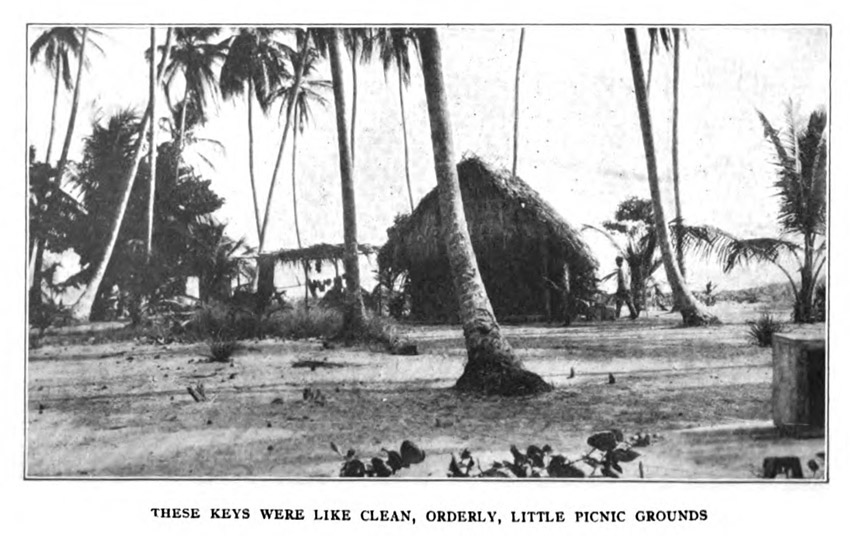
Towards sundown, the Wisdom anchored at Playa Damas, in the roadstead off Nombre de Dios, where Columbus first stepped foot on the mainland of the Western World, and Victor came aboard. Victor was a lean black man with bad teeth but an agreeable smile. That night the swell rolled us out of our cots—it was too hot to sleep below—and the rain beat under our deck awning.
We wallowed out into the open again at daylight, trolling for kings and mackerel as we went. About noon we breasted Cape San Blas, swung through an opening in a foaming reef, rounded a tiny key covered with palms, and anchored off the governor’s house.
Shortly before this, the Panamanian government had begun an effort to tame the San Blas people and to reclaim their coast, and to that end it had established this post. The taming and reclaiming process had not progressed noticeably at the time of our visit.
Governor Huertado was polite and friendly, being, I think, lonesome for a sight of new faces. He volunteered to meet us the next day at Cardi, the largest village at this end of the coast, and to act as envoy extraordinary to the chief, an offer we gladly accepted. His doctor showed us some few photographs he had clandestinely secured during official visits to the various towns, but discouraged us from attempting to emulate his success. He declared there existed among these benighted heathens a senseless prejudice against cameras. They regarded a lens as the devil’s eye, and a black box as his abiding place. He offered to buy from us, at a flattering price, any films showing San Blas women. Our ignorance and our optimism amused him.
On our way to Hyatt’s mine we gained some idea of this forbidden country. We were in a magnificent harbor dotted with small islands—the upper end of the San Blas archipelago, which extends more than a hundred miles to the Colombian line. Mountains stood back from the sea; the placid sound was guarded by an inner and an outer row of reefs and keys, the latter crowded with coco palms, all huddled together as if to keep their feet dry. These keys were like clean, orderly, little picnic grounds; they were green jewels ringed with settings of gleaming white. Through the glasses we could see villages of thatched houses and great numbers of what looked like bits of paper blown broadcast by the wind. They were the sails of countless cayucas, heading homeward.
Our course to Cardi, on the following morning, led close to several islands, massed to the water’s edge with grass houses. We made no attempt to land, for these were Colombian Indians and unfriendly. This was Panama, to be sure; nevertheless, the Colombian colors floated over these villages, and, as we drew near, additional emblems of the same sort were unfurled. Men ran out with flags the size of handkerchiefs, on short staves, which they thrust into the sand—the San Blas manner of emphasizing the fact that they were not at home to callers.
Cardi, the “Place of Dead Bones,” is the largest and best village at the western end of the archipelago. It occupies a key perhaps a quarter of a mile long and four feet high, but it is a beehive. Great palm-thatched houses, many of them sixty feet or more in length, crowd one another so closely to the water’s edge that only here and there is room left to draw up the cayucas. To walk around it without wading is impossible. It flew the flag of Panama, in honor of Governor Huertado’s visit, as did a twin village close by. But between these two stood a third island, and over it the Colombian emblem fluttered brazenly.
Our arrival caused a sensation, for Salisbury, with rare inspiration, had opened the flag lockers and decked the Wisdom from stem to stern with the yachtsman’s panoply. We came to anchor in an impressive silence, observed by many pairs of black eyes. As we were getting out the small boats, several dugouts, manned by naked boys, put off and circled us at a respectful distance. These canoes were amazing. Some were so huge as to dwarf their tiny occupants; others seemed no larger than gravy boats or pickle dishes, and in these latter sat babies.
Our camera man rushed to the rail, but at sight of the camera and its terrifying glass eye the youngsters squalled loudly and spattered shoreward like a brood of wild ducklings. Victor, now a man of importance, landed us in the dinghy, for Governor Huertado was waiting.
Cardi reminded me of pictures of Papuan villages. Huge steep-roofed houses were crushed side by side; in an open landing place the inhabitants had gathered, and they eyed us curiously, coldly, as we approached. The men were short, broad-shouldered, capable; the women were of pygmy size, and every other one bore a baby on her hip. They wore gold nose rings and brilliantly colored dresses, these women, and they were strangely shy, inordinately bashful. When one looked squarely at them they disappeared, melted away, only to reappear when one’s glance had traveled on. But that which challenged attention was the boys. There were scores of them—splendid, straight-limbed, manly little fellows. They were half demented with excitement; nevertheless, they were decorous. Every mother’s son of them was stark naked.
We bent double to enter a door in the nearest wall and followed Victor towards the chief’s house. Through a vast, gloomy interior with low log beams, from which depended parallel rows of hammocks, we made our way, then out into a street so narrow that we large-framed visitors had to walk in single file, stooping, to avoid the sharp ends of bamboo rafters. The men and the boys went with us. There was a great scuffling of naked feet, but no other sound. From every crevice between the upright poles which formed the house walls the bright black eyes of women peered. From behind closed doors, usually a single plank hewn from a mahogany or cocobolo log, came whispers, a smothered agitation, the occasional wail of a frightened baby. Hyatt cautioned us:
“Mind, now—don’t laugh at the chief. He’s very dignified, and you mustn’t josh him.”
For my part, I had no desire to laugh. I was too intensely interested, nor was the chief the sort of man I would select to banter. He was a rugged, strong-faced man, with a brown derby hat which he wore like a crown. He was seated on a long bench in the center of his great house. On his left was a straw-haired, pink-eyed, blue-gummed albino; on his right, a villainous individual with a muzzle-loading shotgun. He shook hands without rising, and by the time Victor had made the introductions the big room was jammed with Indians.
The chief listened politely enough to Victor’s translations of our greetings, but he maintained a strict neutrality. He neither frowned nor smiled; he refused to commit himself. The court chamberlain thoughtfully caressed his antiquated firearm. I squeezed myself into a seat beside the albino and studied him with fascination while he stared fixedly down his nose.
On a beam in front of us were several lithographs—one of the Crucifixion, another of the late King Edward VII, a third showing an African explorer and his naked gun bearers in a desperate battle with some faded-blue crocodiles which had gnawed one end of his canoe to the bone. They were products of the Paris-green pre-half-tone, nature-faking school of expression.
Having paid fulsome respects to the chief, we explained that we desired nothing from him or his people, that we had nothing to sell or to buy, that we wanted neither lands nor coconuts, and that we were all happily married. When he had digested this amazing intelligence, the chief spoke. From his tone, from the light in his eyes, I am sure that a literal translation of his words was:
“Well, what do they want?”
This was Salisbury’s moment, and he rose to it. He gestured magnificently; his smile was warm and friendly, and it embraced every hostile countenance.
“Tell the chief that we are different from any white men he has ever seen. We’re not looking for mines; we don’t want any lands, for we have both. We are immensely wealthy. We are so rich it annoys us, and we travel for pleasure. We do nothing but visit interesting people. We have seen all the Indians in the world except the San Blas, and now we have come to make friends with them.”
Victor perspired some in putting this over. Hyatt and the governor nodded; I arched my chest and undertook to look rich. Salisbury continued:
“We have heard that the San Blas are honest people, that their men are strong, their women beautiful, and their children good. We have heard that they make the finest canoes in the world and know how to sail them, but we want to see. We like to hunt and fish, and we will give all that we kill or catch to the chief. Now then, we don’t want anything for nothing; if the San Blas Indians will be good to us, we will agree to take some nice pictures of them and show the world what superior people they really are.”
Victor managed this at the cost of many strange and asthmatic sounds.
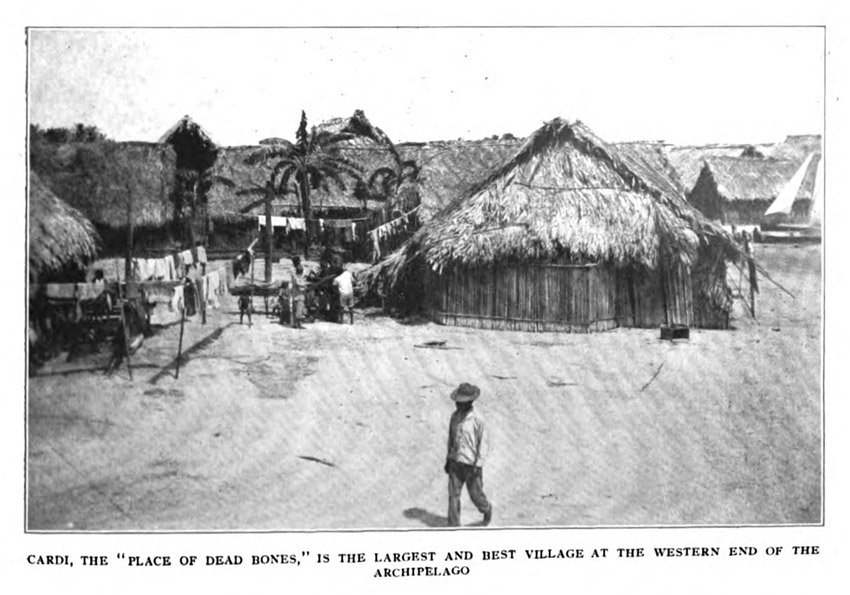

“We make many presents.” Salisbury beamed benignantly; a careless prodigality was in his gesture. “We distribute vast sums of money wherever we go. For instance, we will get up a cayuca race, and to the man with the swiftest canoe we will give”—he paused dramatically—“a beautiful gold watch. Or, if he doesn’t want a watch, we will give him its full value in money—four dollars, silver. To the second man we will give two dollars, and to the third man one dollar.”
Inasmuch as Panamanian money—silver— is worth only fifty cents on the dollar, this was a handsome offer indeed. When this enticing proposal had been fully translated, the chief smiled.
“We’ll do more.” Salisbury was growing reckless. “We’ll give prizes to the fastest swimmer among the men, among the boys, among the women. We’ll have games and dances and make a present to the handsomest girl. We’ll send her a copy of her photograph! Oh, we’ll have the best time the San Blas people ever had, and they’ll be sorry when we leave!”
They fell for it. Discussion became lively. There was less hostility in their glances; little girls with enormous necklaces of silver coins began to sidle into view. But it was slow work getting acquainted. Through every crevice in the walls bright eyes continued to watch us, and, we could see that the place was surrounded by women. After a time, their curiosity proved too much for them and they likewise edged in through the doors. Some of them—bold, brazen characters, no doubt—had the courage to stand close behind us. Fingers touched us; tiny brown hands explored our garments. By and by we began to distribute change among the children and to play with the babies. Thenceforth we got along splendidly.
It was after the chief and some of his head men had accepted our invitation to lunch with us that an incident occurred which briefly threatened not only to interrupt our relations and destroy what understanding we had established, but also to involve us in a decidedly awkward situation. We were on our way out to the yacht when we heard a gunshot.
“Who fired that gun?” Hyatt inquired, quickly. We could not imagine.
As we neared the Wisdom we saw signs of something untoward, for canoes were scuttling shoreward and our crew was rushing about the deck. Next we discerned the body of a man laid out upon one of the cots; a bare brown calf and arm hung over the side.
Hyatt cursed eloquently.
“Somebody has shot an Indian,” he declared. “That means we’re in a mighty bad fix.”
But it was not an Indian. One of our sailors, in cleaning an automatic pistol, had sent a steel-jacketed “forty-five” through his knee. It was a bad wound; we were a hundred miles from a hospital, so away went our fine plans, temporarily, at least, and we hoisted anchor and pushed the Wisdom at top speed out to the governor’s residence.
The doctor, after an examination, declared positively that our man must have the best surgical attention, so Hyatt, the operator, and I took the cameras ashore, and Salisbury, blaspheming sulphurously, turned the Wisdom seaward and bore the sufferer away.
Knowing that the Indians were as timid as deer, it was with some apprehensions that I returned to Cardi on the following morning to advise the villagers that our regatta was only postponed and to assure them that we would permit no further carelessness in the use of firearms while we were their guests. They responded more readily than I had dared hope, and when the Wisdom hove in sight, two days later, we were again personæ gratæ.
There followed an absorbing two weeks, during which we accomplished much that we had come for. We held those contests, and no Poughkeepsie excursion steamer was ever more thickly crowded at an intercollegiate rowing race than was the Wisdom. Indians swarmed over her until she threatened to capsize; they rushed from rail to rail, to the despair of the camera man, who was busily grinding away. We spent much time ashore, surrounded by troops of adoring boys, who clung to us and followed us everywhere. It was not so easy to gain the women’s confidence and to take their pictures; we were put to many stratagems and cultivated considerable teamwork in doing so, but we succeeded. Evenings, the men came off to visit us, and rows of naked boys perched along the rails like blackbirds. We told them about other Indians in other lands, about tribes who lived far from the ocean and rode horses, like the white men; about others who dwelt in the far north, where it was never warm and where the sea grew solid with the cold, so that men could stand upon it, where dogs were driven to sleds, where houses were built of snow and people walked with big nets on their feet. I doubt if they believed us. In turn, they told us much about themselves, their lives, and their customs; about other San Blas villages, away back in the hills, where the people hunted with blow pipes and poisoned darts and where no white men had ever been; about the origin of the San Blas cayuca, the oddest and, I believe, the best sailing canoe in the world.
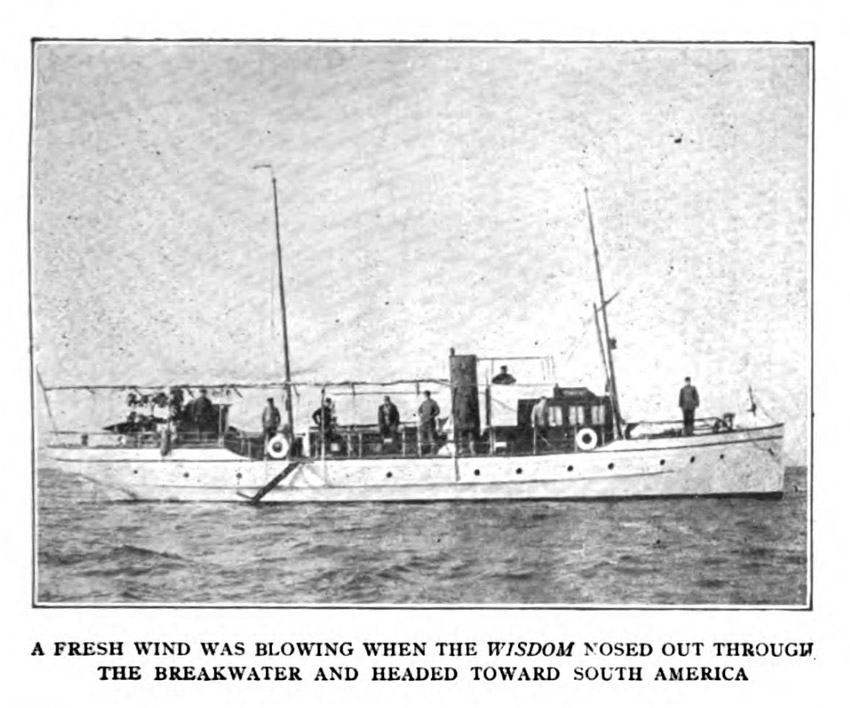
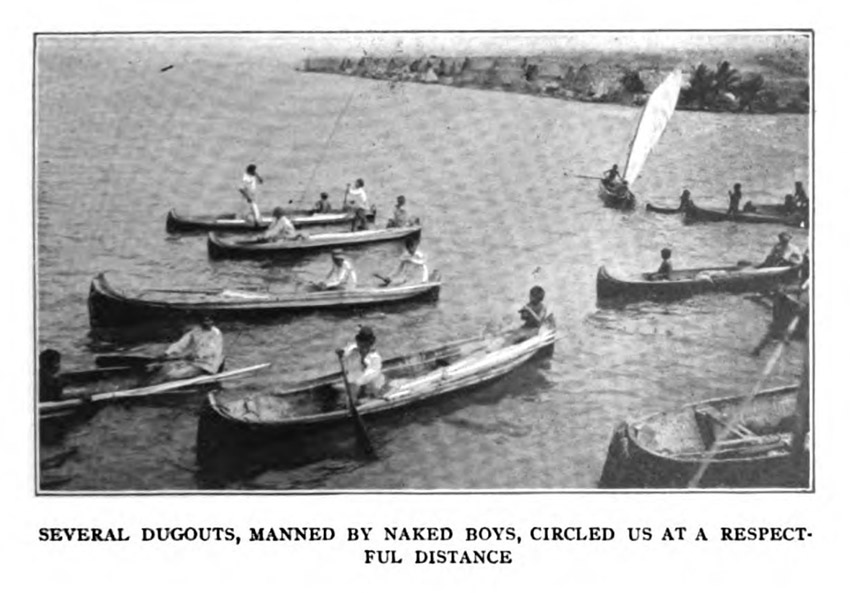
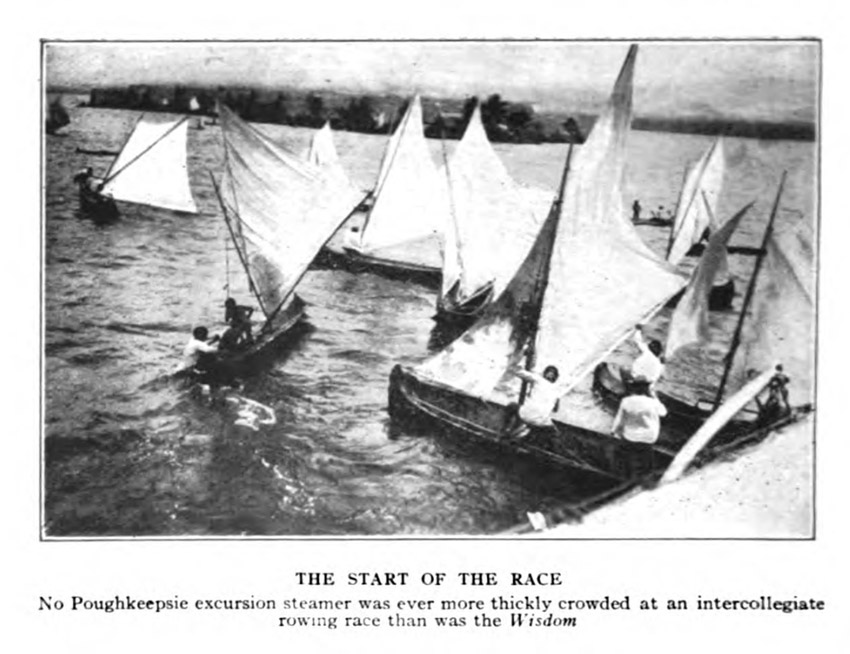
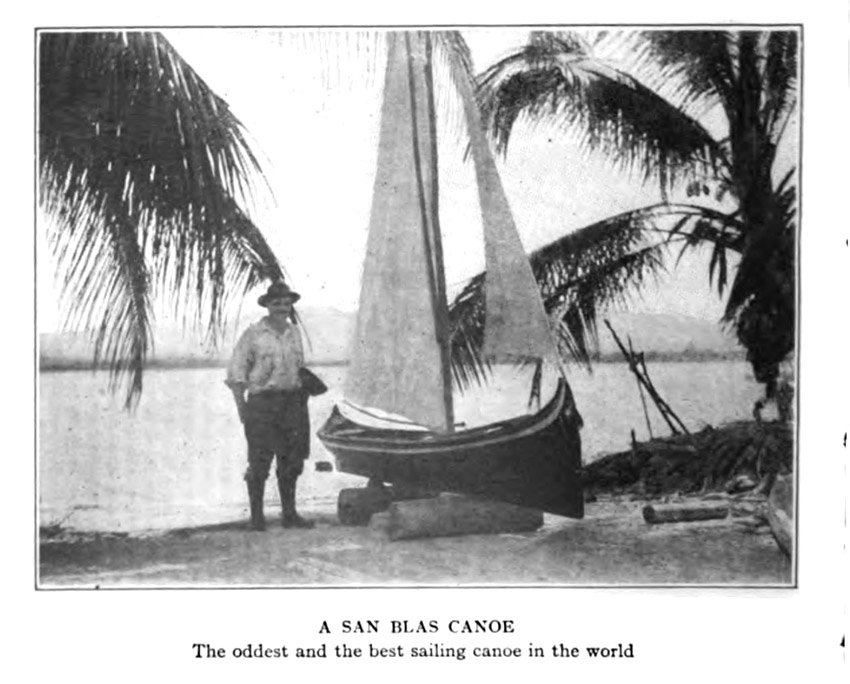
Our phonograph was a never-ending joy and mystery, especially to the boys, who by this time had adopted us and made themselves masters of the ship. They peered into its vitals and imitated its sounds. Then they fetched reed pipes and made music for us. These pipes were in sets of seven and, in using them, two players faced each other. The tunes were primitive, pastoral, barbaric, as were the dances that went with them.
The San Blas are suffragists. The woman’s position in the household, her voice in affairs, are reminiscent of that female dominance which, we are assured by history sharks, existed anciently. They are an industrious people, too. Every morning, long before daylight, the rising-call runs from house to house, fires flicker, and then, in the first gray dawn, come rain, come shine, one sees ghostly fleets of cayucas blown, like moths ahead of a gale, towards the mainland or the reefs and keys outside. The San Blas coconuts are very fine, and the Indians are rich in trees. The islands are covered with them, and other groves line the rivers. There appear to be no exact land boundaries, and frequently a man will own a single tree here, another there—in which event he respects his neighbor’s title and gathers only the fruit that belongs to him.
While the man works with his crops, the woman does her laundry. Every day is Monday, for they are a cleanly people, and every garment must be washed at least once a day. Soap grows wild on trees, in the form of globular berries, and they use vast quantities of it. In no village did I discover any filth; in no house did I encounter unpleasant odors. They have, in fact, a tribal custom, of the highest sanitary value to a crowded tropical people, which absolutely forbids the careless practices common to primitive races, and which makes the ocean the immediate receptacle of all refuse of whatever character. As a result, they do not suffer from dysentery, hookworm, and similar diseases.
The women love bright colors; their waists, or blouses, are quite wonderful examples of needlework, and carry striking patterns made by sewing many layers of cloth one over the other. About the hips is wrapped a narrow length of coarse cloth, frequently painted, which reaches barely to the knees. This is the work dress. Their calves are tightly wrapped with beads and, in consequence, they are misshapen, but rarely does a stranger catch more than a glimpse of these ornaments, for an outer skirt, consisting of a wider strip of brilliant calico, is usually worn. Owing to their diminutive size, it is difficult to distinguish the women from the girls except by their hair, and here must be mentioned a custom peculiar, so far as I know, to the San Blas.
We had heard of the hair-cutting ceremonies and of the big drunks that accompany them; we had been warned to avoid the villages where a so-called chicha was in progress, lest we have cause to take suddenly to our boats, leaving our hats behind us. In fact, when we arrived at Cardi, the chief informed us, with the melancholy languor peculiar to a “holdover,” that he was but just recovered from a three-day celebration during which many demijohns of chicha—rum—had been drunk, and in one house we came across a pen of banana leaves, around which were gathered several old crones, who warned us away and led us to understand that we were profaning some holy of holies.
Explanations came in time. When a girl arrives at marriageable age, her hair is cut for the first time, to the accompaniment of certain rites and formalities, and she is secluded for eight days in one of these pens. None but the elder women are allowed to see her, and during the first three days of her sequestration they carry calabashes of sea water, which, at intervals, they pour over her. The child is kept constantly drenched, and, meanwhile, the father, having purchased as much chicha as he can afford, joins in a general carousal. Visitors come from other islands and stay as long as the liquor lasts. There seems to be little drunkenness at other times. As may be imagined, a chicha is a thing to be avoided by strangers. Traders up anchor and sail away, for drunken Indians are not a bit more pleasant than drunken white men.

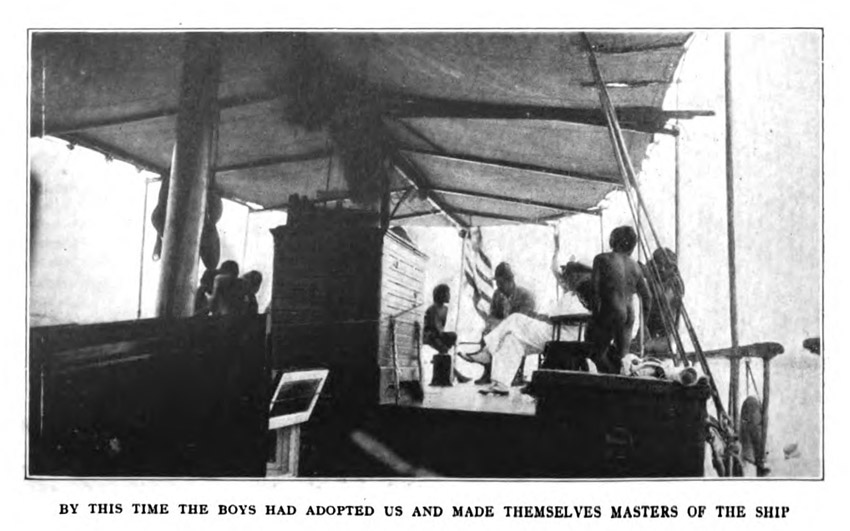
After her three days’ baptism, the budding San Blas woman remains isolated for five days more. A year later she is considered ready for marriage, and thenceforth her hair is kept cropped.
It was Billy Smith, a man who had sailed the seas in big ships and returned to finish his days with his own people, who explained to me the reason for this and for other customs. We were out in the chief’s “thousand coconut” cayuca, scudding ahead of half a gale of wind. The chief’s son was straining at the great mahogany steering paddle, while Billy clung to a rope from the top of the mast, swinging himself far overside when the canoe heeled. He talked as we flew through the white water.
“It is hard for the girl to be cold and wet,” he told me, in his halting English; “but it must be, for we live in the sea, like savalo, and every day, as long as she lives, that woman will be in the water at some time or other.”
“What is your marriage ceremony?” I inquired.
“Well, when my daughter is ready to marry, my wife and I will pick out a young man who works hard. We will ask his papa and mamma if they like us and our daughter. If they say, ‘Yes,’ we will ask the boy.”
“Suppose he doesn’t love your girl?” I queried. Billy was puzzled, so I amended my question. “Suppose he doesn’t want to get married?”
“Oh! He will say so, and we will ask somebody else. If he don’t mind, bimeby he will visit us. When night comes and the girl goes in her hammock, we will take the man and put him in the hammock, too. Sometimes the man gets up and runs away.”
“What then?”
Billy shrugged.
“That means he ain’t ready to be married. If he doesn’t run away he will go ashore in the morning and bring wood for the fire. The girl will cook his breakfast and—they are married.”
“Do you have divorce?”
“Oh yes. Sometimes a man or a woman is lazy. Then they go apart, and the man must move to another island, and they can’t marry again for five years.”
Marriage does not separate the San Blas woman from her parents, for the husband comes to live with her. In consequence, a family of twenty members, all living in a great, single-roomed house, is not uncommon. While the privacy may not be all that a blushing bride craves, the custom at least does away with the hoary-whiskered, Anglo-Saxon, mother-in-law joke, and therefore has its points.
How or when the derby hat was introduced to this coast I don’t know, but rumor has it that Wilcox is responsible. These hats are all alike. They are worn on state occasions, and since they are all of one size, regardless of the size of the heads beneath, I am inclined to believe that Wilcox is indeed to blame. He is a grave man, but he has a sense of humor.
According to another story, he once had a stick of red sealing wax in the cabin of his schooner, and when a brave came to him with a stomach ache he pulverized it—the sealing wax—and administered it in a cup of water. The color was gorgeous and the cure immediate. More demands for the wonderful red medicine resulted, and before long Wilcox was doing a thriving business in sealing wax. He ordered large quantities of it, for the profit was good. His fame spread. Then one day, being short of red, he unwittingly administered some green, never thinking that the color arose from Paris green or some such deleterious drug. The effect, this time, was more than imaginary. None of the Indians actually died, but Wilcox tells me he has not been back to the San Blas coast for over ten years.
Having, as we thought, sufficiently established our innocence of purpose, we broached the subject of a hunting trip to the mainland, but our proposal met with opposition. Certain of the Colombian Indians objected, on the ground that we were doubtless looking for land, and it was not without much opposition that we were finally permitted to enter the forbidden territory back of the coast.
To avoid the appearance of overrunning the neighborhood, Salisbury consented to spend the first day trolling in the river, while Billy Smith guided me through the jungle in quest of “mountain cow”—tapir. We were off at daylight, in the chief’s cayuca, and although I covered many hot and breathless miles behind my guide, I returned tapirless. There is game in the country, lots of it. We were constantly on fresh signs of jaguar, deer, wild hog, and tapir; in places, the gloomy depths beneath the dense roof of leaves was trampled and tracked like a barnyard.
Other trips followed, and on one of these, after much urging, we were shown the City of the Dead, the graveyard where lie the former residents of Cardi. It stands on the river bank far inland, a silent village of great thatched roofs. The floors sound hollow to the tread, for the dead are swung in hammocks, each in his empty vault, and the graves are set side by side.
Billy assured us that we were the first white men to see this sanctuary. He made it plain, too, that he wished us to look and then to go, and the reason finally came out.
“A bad thing happened here two days ago,” said he. “We saw the devil.”
“The devil?”
“Yes.” Billy pointed out the exact spot where the unwelcome visitor had made himself visible. “He was a little fellow with a white shirt. We thought he was one of the boys from Cardi, but there was no cayuca on the bank, and when he saw us he ran quick into the woods. Plenty of people have seen the devil here.”
Naturally, I was interested. I assured Billy that, failing a tapir, I would be content with a devil. I told him I was a famous devil catcher and would guarantee to capture this one if he appeared, but my words evoked a smile. It was evident that Billy considered me a braggart and a fool. He and the chief’s son were vastly relieved when they had paddled us out of sight of the place.
We fished the Cardi River and we hunted it; we followed withered old hunters armed with rusty shotguns into wildernesses and swamps whence none but an Indian with an Indian’s bump of location could have guided us out; we perspired ourselves white in the humid, ovenlike heat, and we emerged covered with ticks as with a scale, for this was the dry season. Nothing was proof against this insect pest; every twig and every leaf contributed its quota to our persons—the ticks got into our hair and our eyebrows; we spent hours “reading” our garments and each other’s backs.
They are wonderful travelers, these little men. We had great times with them, for, once they came to trust us, we put full trust in them, and they took us everywhere. It was great fun, too, still-hunting the largest and the wariest of tropical animals, matching wits with wild creatures whose every sense is sharpened to incredible acuteness.
They were much interested in my electric headlight, and they took me fire hunting. To one who has never hunted a jungle stream at night the experience is worth while. To one who has there is a never-ending fascination about it. The thickets conceal glowing eyes and the woods are full of strange noises—rustling bodies, soft footsteps, the whir of wings, and the calls of wild creatures which speak only at night. It is unsportsmanlike, no doubt, but in a land of such dense cover there is sometimes no other way in which to get fresh meat.
We supplied the village with fish, too, for the streams were choked with giant snappers, jacks, jewfish, tarpon, and the like. Our rods and reels, our slender lines and glittering spoons, amused the Indians at first, but when we came home with the launches heavy with fish and our backs aching from many a hard pull, they accorded us deep respect.
It had been so easy to establish ourselves with the inhabitants of Cardi that we put little faith in the stories of San Blas hostility, but we proved them true when we journeyed farther down the coast.
At River Diabolo, perhaps the largest and the most civilized of the towns, we found two missionary women, the only white people living in the nation. They had come at the invitation of the local chief, but their presence had excited much opposition and they had undergone many adventures. The one who had dwelt there longest told us of uprisings against her and of council meetings where her death or expulsion had been demanded. With that amazing singleness of purpose which animates the missionary mind, this little woman had stuck to her post, devoting one-third of her hours to teaching and two-thirds to preaching. Her scholars were eager to learn; they followed her about, crying: “School! School! School!” and allowed her scant leisure for her household duties. Women with babies on their hips sat beside immature children, droning their a-b-c’s and singing psalms.
With the arrival of the other missionary, the word of God had spread more rapidly, and when we sailed into River Diabolo with our flags flying we were met by ranks of Indian boys in clean white shirts and trousers, with faces scrubbed until they shone, and with hair plastered flat upon their foreheads. But garments were worn only during school hours—when out from under the eye of the missionaries they took their comfort.
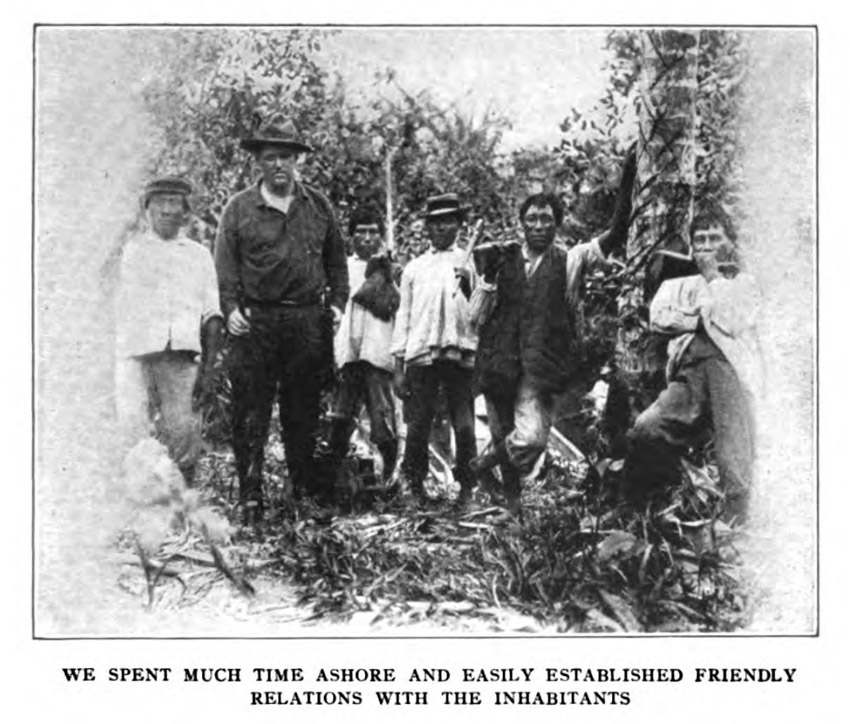
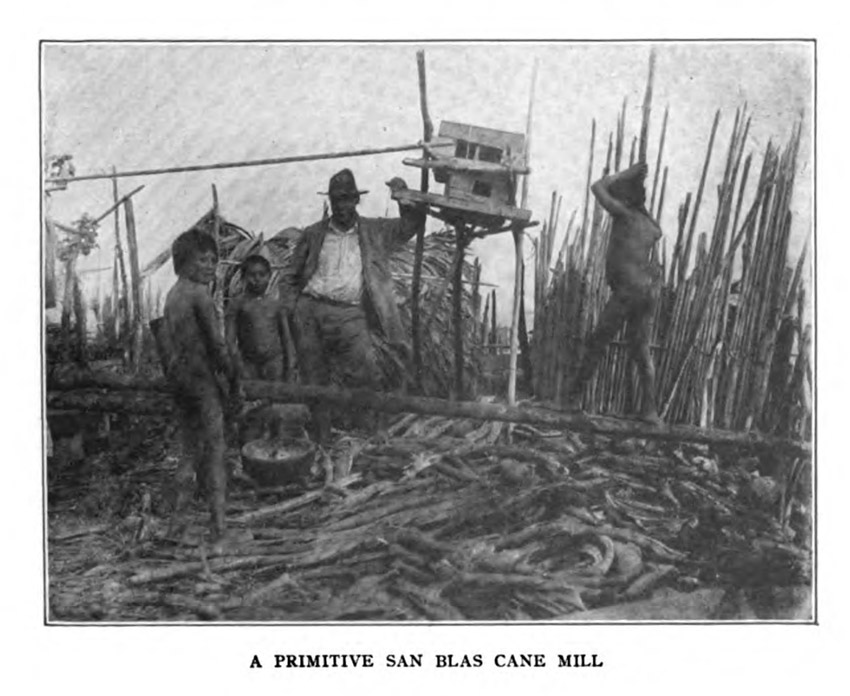
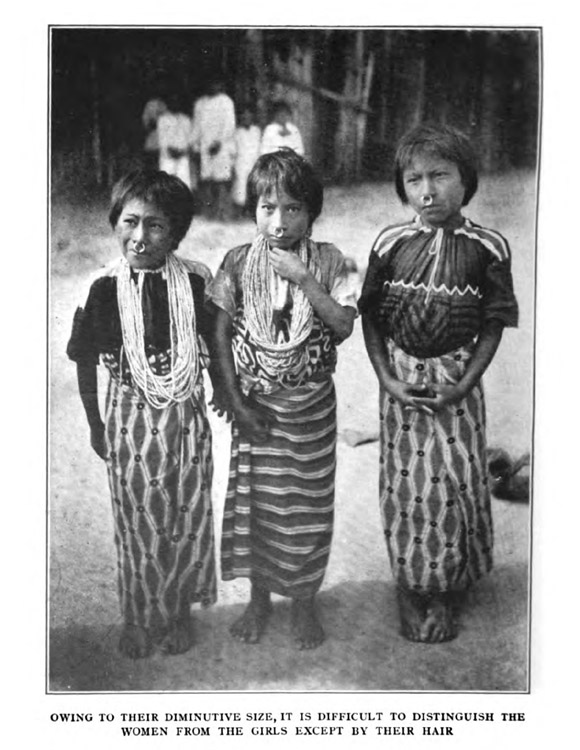
River Diabolo is the seat of culture, the home of refinement; its citizens boasted loudly of its civilization, then sailed away to a chicha five miles below, where a shivering girl sat for three days on a hard-wood stool while the women poured sea water over her.
There is little violence and a strict regard for the law among these people, but a few days before we arrived at this town a man, crazed by the rum he had drunk at a hair cutting, had stabbed another. His fellow townsmen had seized and imprisoned him; then, when his victim had recovered sufficiently, he was given a knife and compelled to stab his assailant. This eye-for-an-eye practice holds generally, we were told.
“Suppose one man kills another?” I inquired.
My informant shrugged his shoulders.
“We take him up the river.” He waved towards the solid green of the forest.
“And then?”
“We give him poison,” said he. “It is a good law.”
We were not welcomed everywhere. For instance, at Tigre, a little island hidden securely behind a maze of reefs, the inhabitants took to the woods at the rattle of our anchor chains, and it was a long time before we could entice them back. Even then they would have little to do with us and much less with our cameras. The Wisdom was the first ship of size that had ever stopped at Tigre, and it was naturally a terrifying experience to them.
After we had taken some three thousand feet of film, we discovered there was something wrong with the Wisdom’s stern bearing, which made a sound like that of a boy exercising his stilts on a tin roof, and having in mind a certain river on the Pacific side where the crocodiles are incredibly thick and very sizable, we turned homeward, stopping once more at Cardi for a final palaver with the chief and for some pictures of a tarpon drive. The tarpon were not running, however, so we missed filming a fleet of cayucas in a churning corral full of giant, leaping fish. The men strike them with harpoons, and the sight is worth seeing; it was one we had counted on, but some vagary had seized the savalo, and none was to be found.
A great trouble had come upon the San Blas people, so the chief informed us. From Colon had come rumors which made them fear the government was about to deprive them of their land, the land which their fathers and their fathers’ fathers had cultivated from that day when the three wise men met the stranger who told them how to build a canoe that would sail against the wind. They were a peaceful people; all they wanted was to be left alone. Surely the world was big enough to hold the white man; surely there were other lands than these. He was sorely distressed, was the chief, seeing much trouble ahead if intruders came. Some of the other chiefs had gone to interview the President, in Panama City, but had returned to say that the President could not, or would not, help them. The chief of Cardi wished our advice, and we gave it to him. We told him that the white man has a way of overrunning the earth, but that he has laws as strict and stricter than the San Blas laws, and that these laws would protect the Indian as well as the white man if he took advantage of them.
“Get a paper from the government,” we counseled. “Get a paper which will give you title to your lands and to the plantations you have made; then let the white men come if they want to—you have no use for the jungle and the mountains yonder. It is no good to fight, for the white man will come—he always does, wherever the soil is rich and the trees are heavy with fruit and the waters are full of fish. It is his way.”
We promised to help the San Blas people get title to their lands, and we did what little we could, for they are good people, clean, healthy, moral, and God-fearing, and they had treated us well. They are the best Indians I have ever seen, and they would make good citizens of any country. How many there are I could not learn; some said ten thousand, some said twenty thousand— certainly there are enough of them to warrant consideration.
All the San Blas people want are the coconut trees and the lands upon which their crops grow—not much, to be sure. But coconut groves are of slow growth; those bottom lands are rich, and I have disquieting visions of aggressive, conscienceless exploiters, of a reservation, and of sick Indians.

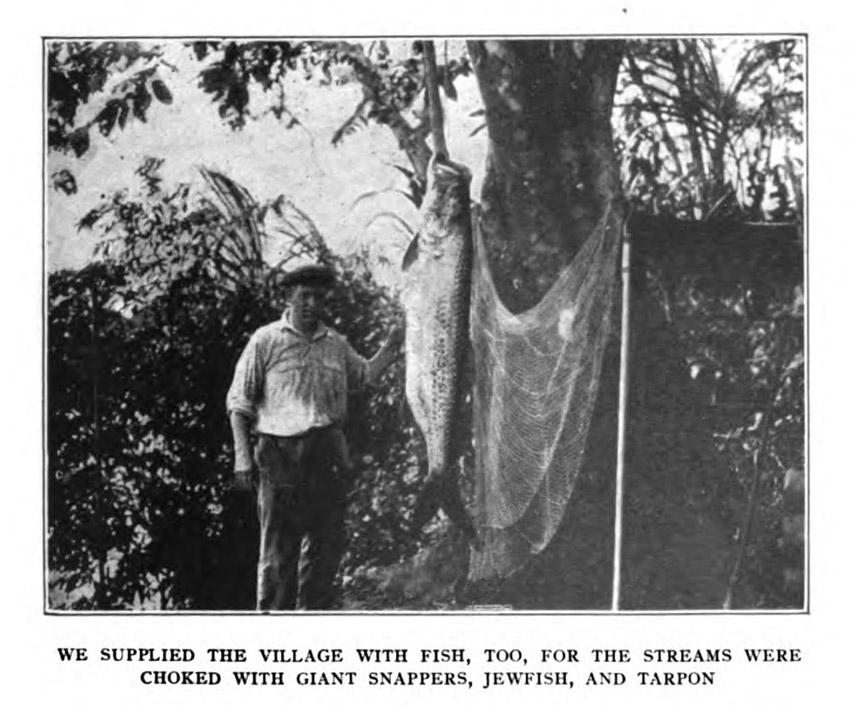

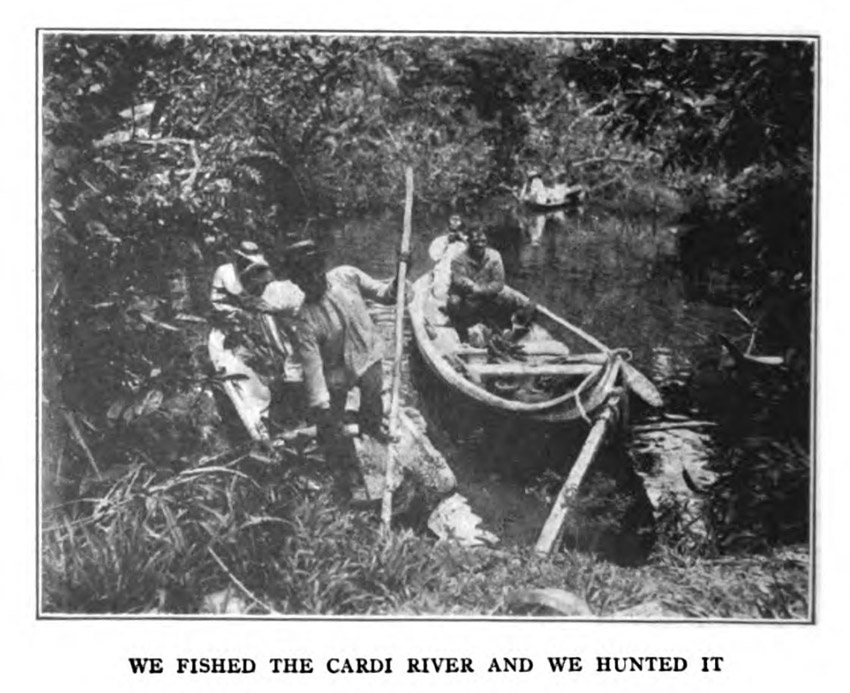
Panama is the youngest nation of the Western World. Has she the will or the desire to profit by the mistakes of her older neighbor to the north, or will she let the San Blas people fall, a prey to those evil practices which destroyed the Indians of our plains? If she has that willingness, the opportunity for a humane act is hers, and the San Blas tribe will thrive; if not, it will doubtless disappear.
Charlie Robinson, the chief of River Diabolo, came to Colon to see me and thence out to the spillway where the tarpon were striking. To the music of the rushing waters of the Chagres and in the shadow of those great concrete walls, he said, naively:
“We are good people, only we don’t know how to speak English. Tell us how to get our lands so that we may leave homes for our babies to live in. The President of Panama says he can’t help us. Do you think the Americans can?”
I wanted to reassure him, but I could not.
As he went away he shook my hand and said:
“You are our friend. You will come back some time, and we will be glad to see you.”
I hope I can go back, for I’d like to try those tapir once more. I’d like to smell the San Blas fires and see those bronze boys dancing to their pipes. Maybe, the next time, Billy Smith and I could catch that devil at the graveyard. Who knows?
A moving picture was responsible for this trip. Photographically, the picture was nothing to brag about, but it had a punch, for it showed a certain Mr. “Buffalo” Jones engaged in the flickery pastime of roping mountain lions. Fred Stone and I saw the picture and heard Mr. Jones’s explanatory lecture regarding it at the Sportsman’s Show. When the lecturer assured us that, despite the lion’s apparent ferocity, he is in reality a timid, craven creature, and when he backed up this assertion by substantial celluloid proof, we, Fred and I, decided that here was a mild sort of adventure, well calculated to appeal to a couple of nervous sportsmen like us.
Like most hunters, we had heard shuddery cougar stories from untruthful guides and we considered the animals big game, but we had never met one in the flesh south of the Bronx.
In consequence, we were for some time at a loss just where to go cougar hunting. But one day we met and held converse with Ambrose Means, a Western cow gentleman, broncho buster, and showman. Mr. Means had been a member of two African expeditions, had roped wild lions, rhinoceri, water buffaloes, wart hogs, and such other veldt animals as are possessed of legs, horns, humps, warts, and other physical deformities or facial blemishes over which he could cast a loop.
At the time of our meeting he was engaged, for hire, in the business of leading tenderfeet into the wilds of Arizona and guiding them out, and he assured us that a kindly fate had sent us to him. When we confessed our burning desire to sit for our portraits with as many cougars as could be assembled, he declared that he was the very man to ease our pain.
“I’m your huckleberry!” said he. “The north side of the Grand Cañon, where I hunt, is all littered up with lions. They’re a public nuisance, or they would be if there was any public, which there ain’t. Uncle Jim Owen, my pardner, has been a government hunter and has killed over six hundred, himself, right there, He was with Jones when he got those pictures; he had Roosevelt once. He owns the best lion dogs in the country, and him and I will give you a trip you’ll remember.”
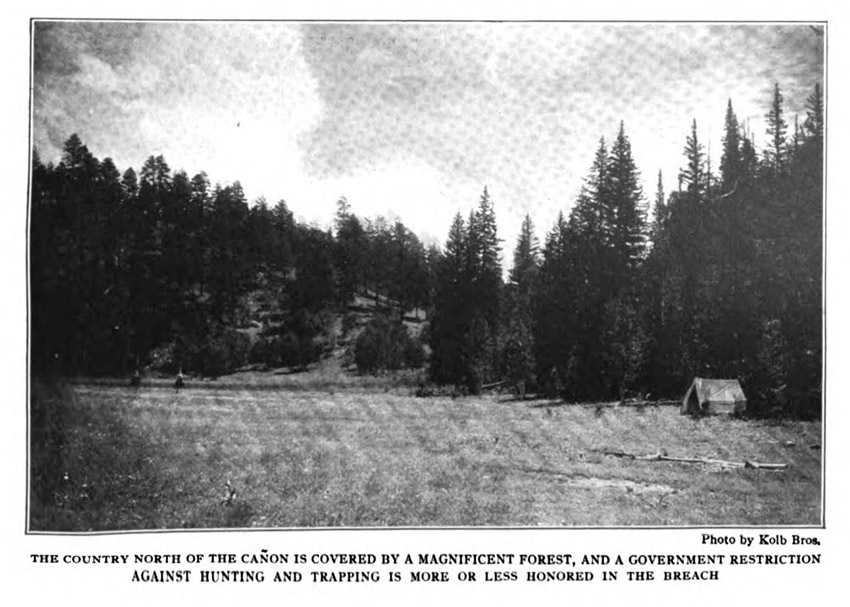

Looking Mr. Means squarely in the eye, I said, significantly:
“We want to remember the trip, but we want to remember it pleasantly. What sort of a trip will it be? “
“Easy—a perfect cinch.”
“Any danger?”
“Not a bit. Why, you can take your wives along.”
Now Mr. Means had never met our respective families, which thus explains his inaccuracy.
“There was a time,” I cautioned him, “when work didn’t come hard enough to suit me, when a certain sense of personal peril gave me a pleasurable thrill, when I could dance all night in rubber boots and a mackinaw coat and never turn a hair. But city life softens a man. The time has come when I shudder at a callous. I jump through a plate-glass window when a car back-fires, and a single fox trot leaves me panting like a lizard. I have outlived hardships; I loathe exposure; I love hammocks, rich food, and debilitating luxuries—”
“The grub will be fine—leave that to me,” Mr. Means broke in, but I checked him, saying:
“Understand, Fred is an actor, and therefore he owes it to himself to safeguard his personal appearance. For instance, if a lion should bite, hook, or kick him in the face, he’d have to play the part of a German duelist, and, under present conditions, such a role couldn’t be made sympathetic. What I would like to be perfectly certain of, before we go farther—”
“Why, a cougar is scared of his own shadow,” Ambrose said, positively. “Of course, if one licked your hand, it’d scratch, because his tongue’s rough. But they’re gentle as dogs—they got good hearts—and this trip is just what you boys need. It’ll rest you and tone you up. You bring a camera and an operator, and I’ll attend to the other arrangements. We’ll sure have one time! And we’ll rope cougars till we’re plumb tired.”
Here, at the start, arose a question. Fred, of course, is an expert roper—he can eat noodles with a lariat—and Means had demonstrated his ability to rope, throw, and hog-tie anything from a homed toad to a tornado. But as for me, I am no loop hound—I couldn’t rope a stack of elk horns—hence the problem was just how and where I fitted into the expedition.
“I’ll tell you what,” Ambrose finally suggested. “Fred and I’ll do the roping, and you can be the gunman. Of course, a cougar is a coward and a quitter, all right, but if I go up a tree to tie a hemp four-in-hand under his chin, I want to be able to look down into the face of a friend with a thirty-thirty.”
Fred allowed that such would doubtless be his own feelings under similar circumstances. He declared, too, that the presence of an armed escort would probably quiet the camera man’s nerves. Camera men are notorious cowards, so he said.
I was prompt in my statement that if this enterprise threatened to become a competition in cowardice, I was eager to enter, and so, after a deal of discussion, it was arranged that I should go along as a sort of protective measure. Even then Ambrose was not altogether easy in his mind, for he said:
“I’ve seen fellers miss ’em cold. There won’t be no time to pin a target on the lion’s chest, you understand. If you shoot one of us, he’ll get away.”
“Spoil the picture, too,” Fred declared.
I agreed that the point was well taken; then I argued, reasonably enough, that if I became so nervous as to miss the cougar entirely, I would doubtless miss either or both of the ropers as well and no harm would be done. If, on the other hand, but one man climbed the tree, instead of two, that in itself would reduce the risk 50 per cent—a simple problem in subtraction. Anyhow, I asserted, people who capture wild animals should expect to run some risks.
So much, then, for the why and the wherefore of this expedition, the detail, the disappointment, and the drama of which I have set out to narrate in a simple, conservative, and shameless fashion.
Ambrose met us on the date set, when we stepped off the train at Grand Cañon, Arizona, and, for our part, we displayed to him a camera man who, we had been assured, would stand without being hitched. This camera man had never taken any wild-animal pictures; he had never been west of Newark, in fact, but he had recently photographed several “movie” serials with famous female stars, and he looked forward with relief to meeting a cougar. In addition to him, our party had grown to include Fred’s brother and a tired business man from Chicago, both of whom had come along to see if we were really in earnest.
As a matter of fact, I was not. I had no more intention of roping a lion than had they, it being my desire to act purely in the capacity of a dispassionate witness. Likewise, I had my doubts about Fred.
“We can’t cross here, like I planned,” Ambrose announced. “There’s too much water in Bright Angel Creek, so we’ll go down the Bass Trail, twenty-five miles west. Uncle Jim’s waiting on the other side with the dogs. Now then, shed your parade clothes and get into something decent. I’m r’arin’ to go.”
None of our party had seen the Grand Spasm of the Colorado. We had heard it highly spoken of, to be sure, but not until we strolled out in front of the El Tovar and the thing hit us in the eye did we begin to appreciate what sort of a job we had put upon ourselves—what it means to cross that amazing rift in the earth’s surface. Without any exaggerated attempt at praise, without any hysterical effort to eulogize, I may say that it is some chasm, and we thought well of it. As chasms go, it’s a bear. Personally, I don’t like chasms—they’re hollow and they’re unsafe. In looking at a landscape, I prefer to see space occupied by tangible scenery of some sort; here was an appalling nothingness, a complete minus of everything except air, and one had to look too far down, too far across, to see anything. Nor do I wish to appear hypercritical, a fault common to so many New Yorkers, but honesty compels me to say there is nothing in the least homelike or cozy about the Grand Cañon, and it is utterly devoid of even the simplest comforts. To anyone accustomed to mountains that stick up, there is something odd, something distressingly unusual, about looking down upon a whole system of towering peaks. Those mountains you see below your feet are good sizable mountains and nothing to be ashamed of—in fact, we’d be proud to claim them in the East, just to show up some of our old favorites—but Arizona hides them away in a hole! And cliffs! You can look in every direction and see any number of fine, imposing cliffs—wasted. It is criminal extravagance, and something should be done about it.
Facing us, from twelve to twenty miles distant as the crow would fly if he had the nerve to tackle such a flight, stood the North Wall, our destination and the home of the cowardly cougar we had come to humiliate. It appeared to be a level mesa, somewhat higher than the seven-thousand-foot plateau where we were. That mesa deserves a word of description, for although vast numbers of tourists annually gaze upon it, although last year a good many thousand people descended Bright Angel Trail as far as the river, very few indeed have gone beyond and essayed the difficult ascent of the other side.
The country immediately north of the Cañon is a veritable wilderness and as inaccessible as any you will be likely to find. It is covered by a magnificent forest and a government restriction against hunting, trapping, plural marriages, and other primitive pastimes, all of which are more or less honored in the breach, especially by local Mormons. It is guarded from trespassers on the south by the titanic, mile-deep void, formed as a consequence of the unprecedented behavior of the Colorado River. The river itself, by the way, is crossable in a length of over two hundred miles in but two places, and there only by the assistance of slender wire cables, totally unsuited to the average nervous temperament; hence there isn’t much crowding from this direction. Toward the north, one may travel some hundreds of miles before striking a railroad; and to the east and west there is a lot of unimproved, vacant property, peopled mainly by tribes of warlike North American aborigines engaged in the manufacture of baskets, blankets, beadwork, and prehistoric pottery for Fred Harvey’s line of curio stores. Frightful tales are told of Indian atrocities in these parts, and I know they are true, for I bought several.
This north bank of the Cañon is in reality the backbone of the Buckskins—mountains which are aptly named, for every buck aborigine with whom I dickered for a genuine Hartford, Connecticut, Navajo blanket skinned me. However, it is an interesting if deceptive country; although it appears to be as level as a floor, in reality it is rent by ravines, cracked by cañons, and pitted with potholes—altogether quite the place a mountain lion would select for a residence.
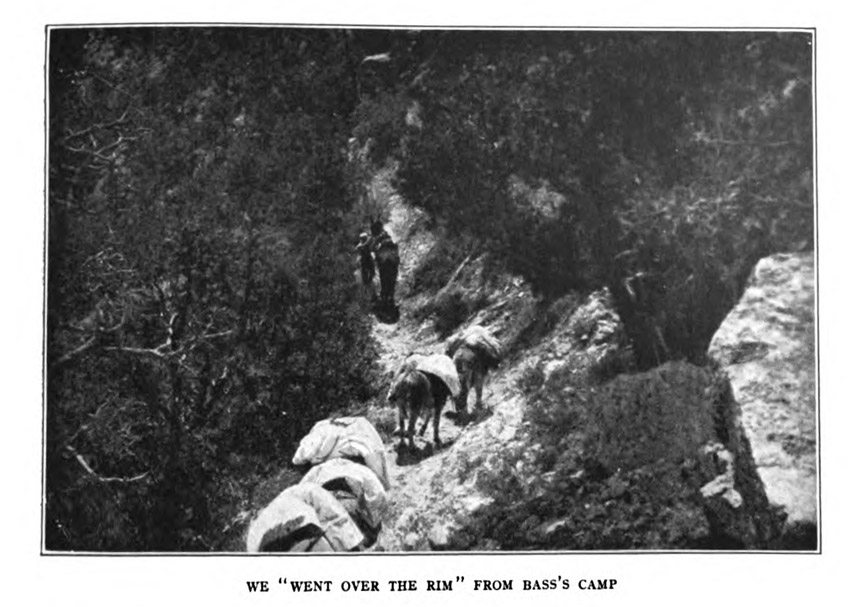
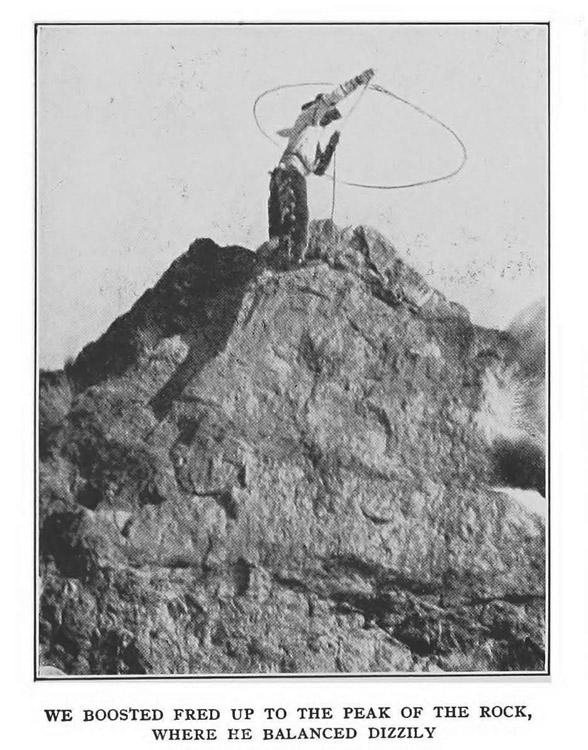

The complexion of our outing, by the way, began to alter immediately after our first glimpse of the Cañon. Doubts began to rise in our minds as to whether we were, after all, precisely the men for this undertaking. These doubts were intensified when, as a matter of precaution, Louis looked up in the hotel encyclopedia a description of the animal we had come to capture. What he found caused us to question the complete frankness of Mr. “Buffalo” Jones’s report to us, for it read in part:
The cougar, or puma, is ordinarily a cowardly animal, but when wounded or brought to bay it is dangerous. It is entirely silent. Etc.
It seemed that we had been deceived. Mr. Jones had not dealt fairly with us, and Ambrose Means—well, he had probably never read an encyclopedia with care. The question arose, therefore, whether we should satisfy our longing for adventure by a sightseeing trip on a buckboard and return to face our respective and expectant wives, or whether we should go on across the Cañon and risk the lions. When the matter was put in this light, not one man wavered. A lion at bay is not a pleasant neighbor, but, for that matter, neither is a disappointed and sarcastic wife. We knew our wives, but we didn’t know those lions; therefore we proceeded with our preparations. After careful debate it seemed to us that by the exercise of some caution we could probably avoid wounding our prey, no matter how sensitive he should prove; as for bringing him to bay, as for cornering him where he would have to sell his life dearly, such, we agreed, was no part of our program. Lions are God’s creatures; they have a right to live. The news that they are silent was, on the whole, welcome, for we reasoned that, if worse came to the worst, they could be depended upon to say nothing and we could drop the matter at any time.
We “went over the rim” from Bass’s Camp the next morning, and Mr. Bass, himself a young man of some sixty-odd years, accompanied us for the exercise of climbing down into the Cañon and out again.
Mr. Bass was sent West by the doctors thirty-five years ago to die of tuberculosis, but the Arizona climate has foiled his every effort to carry out instructions and he remains a disappointment to those few physicians who survive him. He is, accidentally, a geologist; incidentally, he is a poet, a minstrel who sings of the open road, the wind, and the sunshine. Providentially, he is a liveryman, and it was his burro train which carried our motion-picture camera, cigars, smoking tobacco, cigarettes, pipes, golf clubs, and various articles of impedimenta. Yes, we had brought golf clubs. Louis was not satisfied with his “long” game; it was his ambition to execute a four-hundred-yard drive, and he had figured that by teeing up on the edge of some precipitous bluff he could realize his life’s dream. But, alas! he was doomed to disappointment, for Fate intervened in her characteristic manner.
On the night of our arrival, when we built our signal fire to notify Uncle Jim that we were ready to “go over,” Louis had complained of the altitude. He spent a bad night, and in the morning he felt worse. His pulse was behaving erratically and he displayed all the symptoms of mountain sickness. Although he insisted upon making the start with us, we were forced to send him back after an hour or more. We acted wisely, as it transpired, for he was certainly in no physical condition to stand the hard, high climbing which we later encountered. Gloom settled upon us at losing our friend, for not only did his absence promise to increase the per-capita risk for the rest of us, if risk there should prove to be, but in his outfit there were several boxes of the largest, most expensive cigars we had ever beheld at close range. To be deprived of both him and them caused us honest grief. However, we made the best of an unfortunate business, bade Louis a heartfelt farewell in which the apprehensive quavers of our voices matched the regretful tremor in his, and that night we frisked his baggage for those Havanas.
Mr. Bass is proud of his little trail, and during the long, arduous descent thereof he referred fondly to it more than once. He told us how an Indian had shown it to him, and although I listened courteously, it was my private belief that said Indian might have found better use for his time. I pretended to echo Mr. Bass’s words of praise, but in reality my heart was black and my tongue was forked, this being a quaint Supai figure of speech meaning that I was stalling. In reality, I considered it the worst thing in the shape of a road, route, right of way, or public easement which I had ever clung to. In the first place, it was about as wide as a rut or a bicycle track, and it showed plainly that the copper-skinned brave who laid it out wore an AA last. The worst feature about the trail, however, was that it had only one side, and that side was forever trying to shove us off. Where the other side should have been there was invariably a void, some yawning cavity with a lot of repulsive scenery at the bottom. I am at home in oblique countries, but this was my first experience in the land of the perpendicular, and it taught me something.
For instance, I never knew that a horse is a lopsided animal, and that it can walk with its feet on a ledge while its entire body projects over an adjoining gorge. Nor did I know how the ancient cliff dwellers built their fires. It was not by rubbing sticks together, as has been claimed; it was by striking bones, one upon the other. This I discovered when, out of consideration for my tired mount, I got off and shinned round the edge of a cliff upon what seemed to be a poor imitation of a rain-gutter. Pausing to admire the wondrous panorama outspread below me and to change my grip from a thorn bush to a cactus, I noticed, first, that the outline of my legs was indistinct, like a blurred photograph, then that my kneecaps were striking sparks, like a flint and steel.
But all things are comparative; no matter how sick we are, we can always get worse. When I recrossed the Cañon, three weeks later, when I clambered down off the north rim and struck the Bass Trail up the south side, it looked like Broadway.
That first night we camped among some bowlders near a spring, and winged Zulus assagaied us. No tourists had passed this way in a long time, and those mosquitoes were on their last legs, but we saved them. It was hot; there was sand in the butter; there were rocks under our blankets; our cigars were broken and were becoming dried out. However, we bore these hardships stoically and looked forward to the time when we would romp about in the exhilarating ozone of the Kaibab Plateau, engaging the cougar in its native sports and pastimes.
Bass’s Ferry consists of four spidery wires spanning the gorge of the Colorado. From these wires is suspended a rickety wooden cage which works with a windlass. It is a sort of magnified cash conveyer, and by means of it we set about crossing our horses and outfit early the following morning. Inasmuch as there appeared to be an unvoiced question as to whether the contraption would carry a horse, we set up the camera in the hope of getting a good picture in case it wouldn’t.
This was a splendid setting for a moving-picture calamity, for the cables extend from one bleak, black wall to another, and seventy-five feet below them the river rushes past, breaking up a short distance downstream into a picturesque cataract.
When the first horse descended to the niche which forms the cage landing and got a peek at the river below, he shook his head, folded his arms, crossed his feet, and sat down.
“Women and children first,” he plainly said.
You may not know that a horse’s neck is of elastic construction and will stretch like the coil of lemon peel in that beverage from which his neck derives its name; but such is the case. We stretched this animal’s neck to the size of a garden hose; we tied granny knots in his tail, and then, more in sorrow than anger, we took him in our arms, carried him into the cage, tied him securely, and barred him in with pieces of plank. This done, there followed a call for volunteers to windlass the burden across, thus ascertaining if the cables would stand the strain.
It was Ambrose and Bert Lauzon who finally manned the windlass, cast off, and went flying down the wires.
These wires sag considerably; hence the start of their journey was swift. Perhaps a third of the way across, the car came to a pause, whereupon the boys set about winding it slowly onward and upward by main strength and awkwardness.
Miller, the operator, was frankly disappointed when nothing gave way. When the cage went bobbing and creaking onward, a foot at a time, he quit turning the camera crank and seated himself dejectedly, with his legs hanging over the gorge. Near him was a high pinnacle of rock round the base of which the river foamed; sizing it up, he announced that he could get a good picture if Fred would ascend it and do some fancy roping at the top. Evidently it was a matter of complete indifference to him who supplied the thrills on this trip, who fell in, so long as he got it, but we dared not risk offending him thus early in the game, so we boosted Fred up to the peak of the rock, where he balanced dizzily, whirling his lariat until Miller again stopped the machine, saying he guessed it was no use.
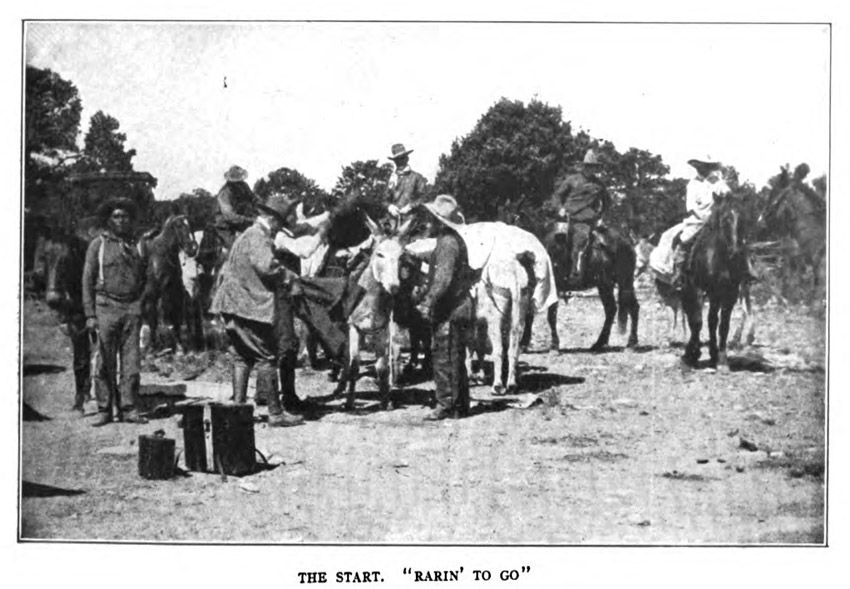
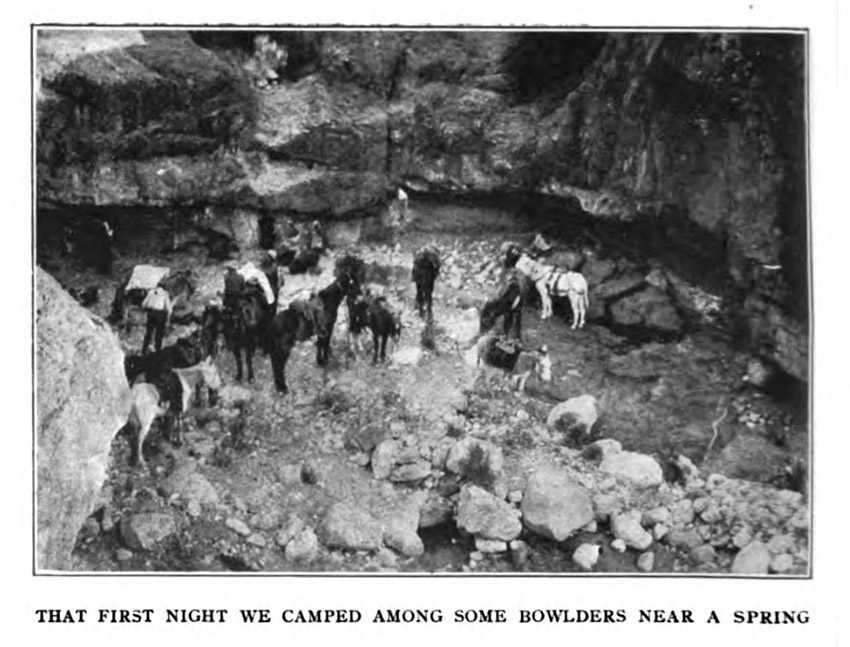
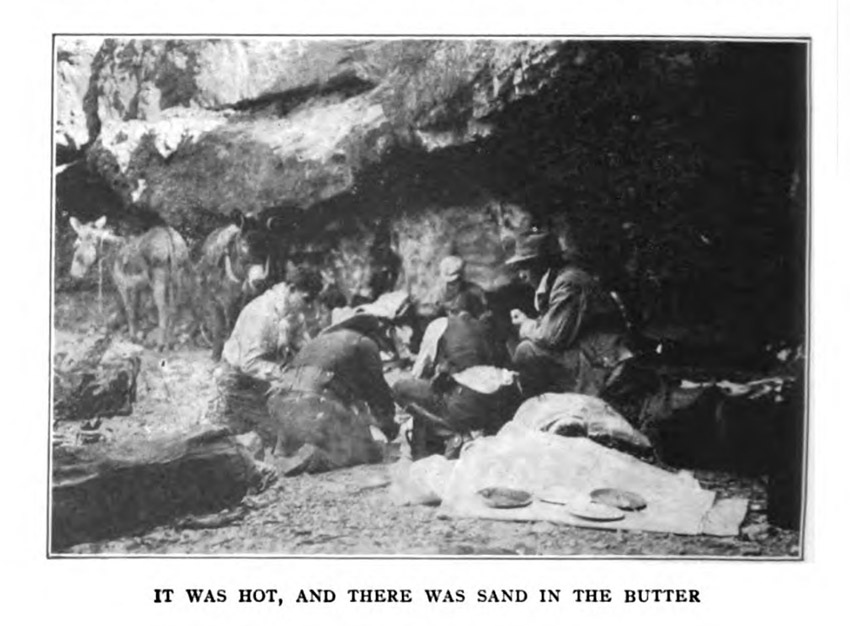
We lost our third horse. He went into the cage more easily than the first two, and therefore less care was taken in tying him close. Just before the start he began to plunge and, in a sudden frenzy of terror, he managed, as a result of our carelessness, to get partially over the bars in front of him and fetch up, head down, in which position he threatened to strangle, for the ropes at his neck, although they prevented him from sliding out of the open end of the cage, also shut off his wind.
Lauzon leaped to the rescue, but the animal’s struggles broke the cage loose from its moorings and it shot out from the landing. Bert was as quick to appreciate the perils of an aerial trip in a cage with a struggling horse as were we, and even as we yelled at him to jump he quitted the car. Immediately below him was a steep slope of broken rock, the foot of which was swept by the rushing river. Out over this, man, horse, and car had begun their trip. Bert landed on a thin knife edge of rock, slipped, but caught himself with his hands, steadied himself, and climbed back to us. The cage had come to rest a short distance out and the horse was threatening to demolish it in his dying struggles.
“He’s done for,” said Bert. “He’ll choke before we can shin out there and windlass the cage back.”
“Shall I cut him down?” inquired one of the boys.
Plainly that was the quickest way of ending the creature’s agony, so the suggestion was acted upon.
As the first rope was cut, the horse, in a final spasm, kicked himself free of the bars, slid head first out of the tip-tilted cage, and hanged himself high in midair over the torrent.
We were all very much relieved when he had been cut down, when the cage failed to follow him, and when the entire transaction was closed. These events had not taken long, and we had quite forgotten Miller and his machine, which he had been industriously turning. Now he called down to us:
“Good work! But the censors won’t pass it. I got everything except the leap for life. If you’ll start the cage again and let Bert make another jump, I’ll get him in the air.”
We realized that we had with us a good operator.
When we had sent our last horse over, had loaded our outfit, and were ready to step into the car, Mr. Bass’s party bade us farewell. The simple earnestness of their assurances that it had indeed pleased them to know us, even thus briefly, was depressing. Their sincerity seemed to argue that they feared the pleasure would not be renewed and that they expected to know us henceforth only in memory—which, in view of our immediate surroundings, we ourselves had begun to fear.
To anyone suffering from ennui, I can recommend as a cure a trip across the gorge of the Colorado River on a wire cable. The view is fine, and it extends in all directions, especially up and down. I know now that I would never care for flying. As we dangled ’twixt wind and water, and the cage sprang up and down while the whole rigging gave and took with sundry alarming groans and warnings, we stared hypnotically at the river below us and vowed that already this Arizona country had made better men of us.
In answer to our signal fire, Uncle Jim had sent two cowboys to meet us and, once across the river, they helped us to repack and resaddle the horses we had brought, together with some others which Uncle Jim had sent by them. They bore us the glad tidings that the trail up was a “heller,” and that Shinumo Creek, along which it led for a way, was so high that, in coming down, their horses had been swept away and they had lost most of their grub.
But interest did not wait until we arrived at the Shinumo. En route thereto, over a bold and frowning ridge which separated us from that brawling stream, one of our pack horses was seized with a bilious attack of vertigo and made a scene. He it was upon whose back we had lashed our moving-picture camera, all of the cigars, cigarettes, plug and pipe tobacco, cigarette papers, pipe cleaners, and the like, and he it was who occupied the place of honor in our caravan. The trail was a sick affair at best. It writhed in agony; it zigged painfully upward for a short distance, then changed its mind and zagged back again. This it repeated over and over.
When the camera horse had selected a place too steep and too narrow for us to turn around in, he let go, flung himself into our arms, saying, “Take me as I am!”
It is no part of a restful vacation to dig your hobnails into solid rock, hold a hysterical horse against the side of a precipice while you unload, resurrect, and repack him. To successfully perform the feat one should be deaf, dumb, and blind to outside impressions, and he should possess as many legs as a spider and as many arms as an octopus. We were quite ready to camp when we finally arrived at the Shinumo.
The Shinumo occupies a high-sided cañon, through which it dashes in a spirited fashion, regardless of the comfort of travelers. The melting snows had raised it and had turned it to a milky whiteness. We negotiated our first ford at no greater cost than a partial wetting and a total paralysis of mind and body. Neither Paul nor Miller, the operator, could swim, so precautions were taken. The loop of a lariat was placed about the neck of each, it being Ambrose’s ingenious idea that if the horses were carried away, he could haul the riders to safety and at the same time prevent getting any water into their lungs.
Our optimism increased when the second crossing had been effected without casualty, but as we made ready for the third and last adventure, Pat, who was in the lead, warned us to follow in his tracks as nearly as possible.
“The creek runs over a ledge here,” he explained. “But you’ll go through safe enough if you stay on it. If you don’t stay on it, you’ll drop off below and wet yourself and all your fixtures.”
“Lead your ace!” we quavered, above the turmoil of rushing waters.
Pat spurred his horse in, and, after a breathless period of uncertainty, he emerged upon the opposite side, giving voice to a shrill yell of triumph and encouragement. He had carried in his hand a long lead rope, made fast to the camera horse. The animal had less success with its endeavor. When the water foamed about its belly, it stumbled, lost its footing, slipped, and staggered downstream for a few feet, then tore the halter out of Pat’s grasp and was washed away.
“There goes the machine!” cried Miller.
“And a thousand feet of film!” Fred groaned.
“And all our cigars!” I wailed.
We were frozen with horror, but Bill Vaughan seized a rope, and, with loop whirling above his head, went loping down the bank abreast of the U-horse. Now its head appeared, now its belly; again the white pack cover came into view. Bill made a cast, lost his slippery footing, and fell into the stream, whereupon, to quote that immortal lyric dealing with the fatal adventures of Ten Little Indians, “there were two.”
Ambrose had remained upon the opposite bank. Fortunately enough, he had retained his lariat—trust your cowman to keep his tobacco and his rope handy. By the time we had unlimbered our still cameras, he, too, was endeavoring to save the unfortunate beast. But the current foiled him; it swept his loop off time after time, until, at last, the horse turned its head upstream, whereupon he made a perfect catch, sat back on his haunches, and was dragged stiff-legged over the rocks, like the anchor of an airship. He took a dally around a small quaking-asp near the water’s edge, and, although the tree came out by the roots, the horse came to rest under a steep bank. Just below was a nasty chute, which would have been its undoing had it failed to end its journey at this point.
“I’ve got him,” Ambrose yelled, “and he’s a dandy!”
It was quite as exciting as shark fishing—while it lasted. Thus far, the horse was little the worse for its ducking, but it had experienced quite enough of this sort of thing and refused to help itself. The lariat was slowly choking it, which made it necessary to salvage quickly the submerged pack—no easy task in ice water waist-deep. Eventually, however, it was unloaded, and with the aid of two other horses the animal was dragged and rolled up the bank to safety.
Our brand-new “movie” camera did not leak light, but it leaked water when we held it up. It leaked like a defective samovar, and that thousand feet of film resembled some sort of gelatinous breakfast food. But those aromatic Havanas! They presented a heartrending-sight to us weak nicotine lovers. We sat down and wept silently into our beards, casting sand upon our unhappy heads. You can wipe the moisture out of an aluminum camera; you can get along without taking pictures, if you have to, but a man must smoke, and who—who can smoke wet cigars and survive? We were strong men—we were made of stern stuff, but there is a limit to human endurance. Ambrose’s joyous announcement that “This is the life, boys! Nothing to do but eat, sleep, and ride a horse!” fell upon unheeding ears. It was a ghastly failure as an effort to cheer.
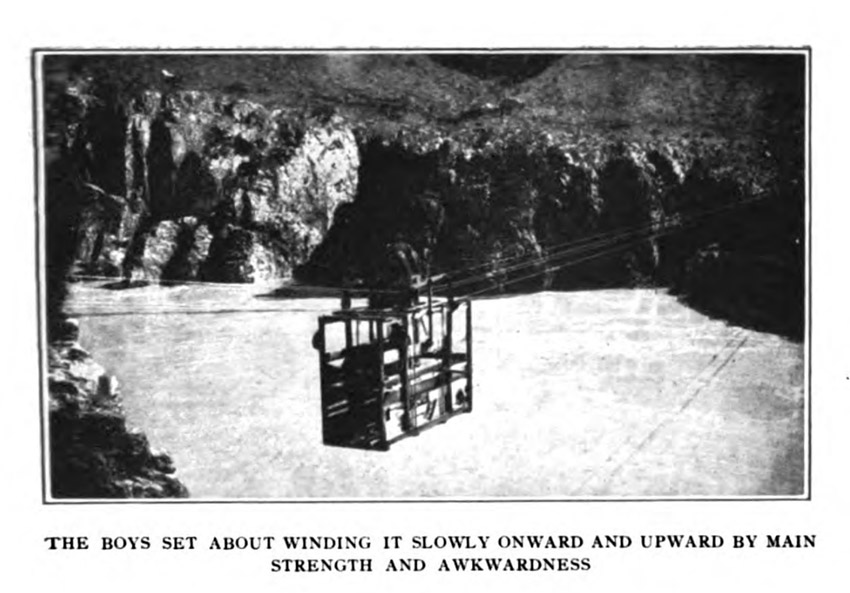
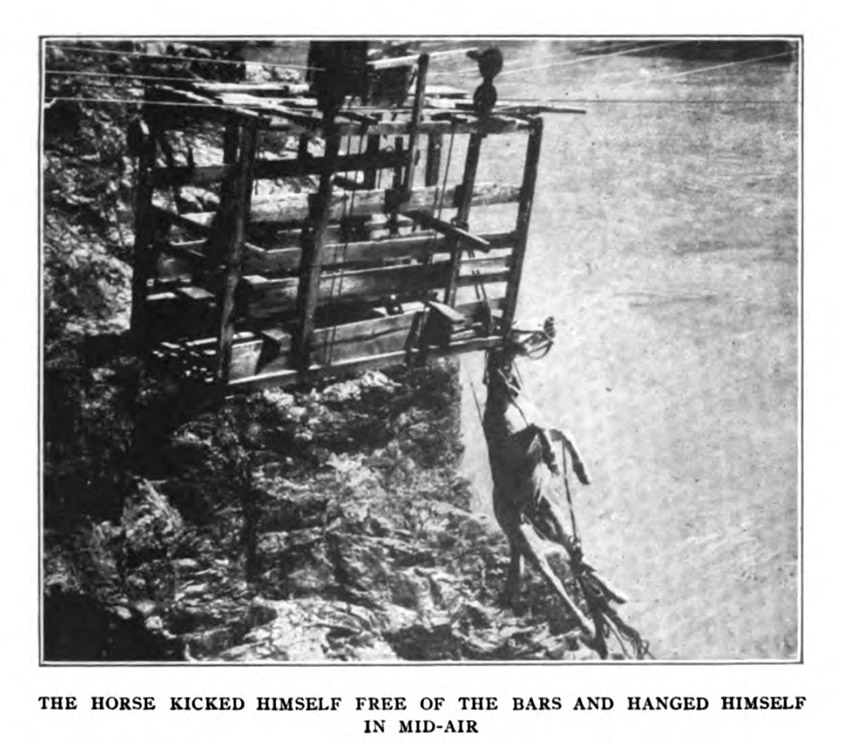
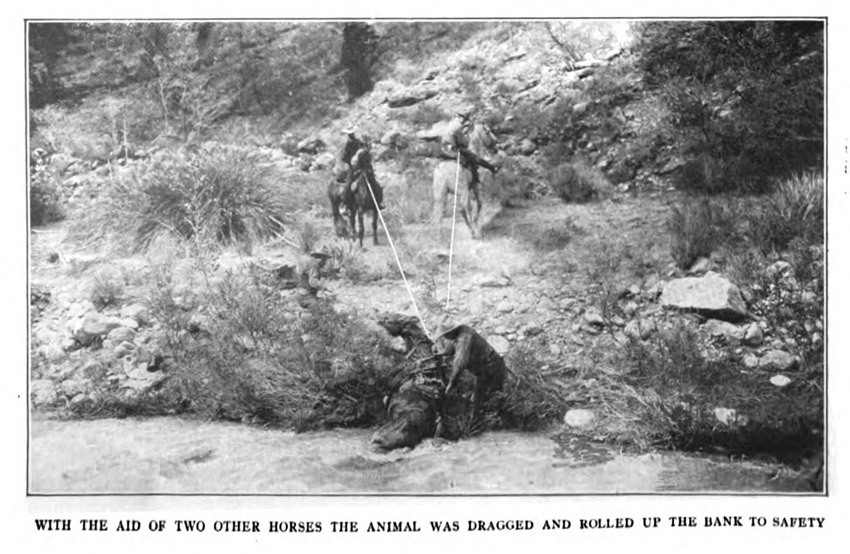
We got safely across the Shinumo—we must have done so, for I am here—but the memory of how it was accomplished is lost in the black shadows of forgetfulness. We were dumb, suffering, spiritless creatures. Doubtless those unfeeling cowboys tied their ropes in our collars and towed us across, hand over hand, as they towed Red, the visiting hound dog whom they were taking along as an addition to Uncle Jim’s pack. I don’t know.
After leaving the Shinumo, the scenery becomes more arresting, and so does the trail. Whoever is responsible for either or both tried to show off, and succeeded. In one place, as we dug our heels into a ledge and supported the weight of an overhanging cliff upon our shoulders, Fred exclaimed, mournfully:
“Gee! I’m sorry the camera is wet! This would make a great picture.”
Paul’s eyes were closed, but he was not sleeping.
“It would, indeed,” he declared, with feeling, “and I’d like to be in a plush orchestra seat, looking at it.”
Paul has a simple, clear way of putting things. Had I dared to let go of anything I would have gripped his hand.
While the Grand Cañon, as I have stated, is mostly perpendicular, there are certain slopes, reputed to be the result of erosion. Such is not the reason of their being—they are the result of pressure from visiting tourists who, in terror, have shoved them out of plumb.
It began to rain early in the afternoon, and inasmuch as our grass-fed horses were weak, this being the third day they had been practically without food, we failed to “top out” that night. When darkness came we spread our fly in a thorny thicket and Pat molded a set of death balls, which he case-hardened in the Dutch oven. We had no baking-powder —the Shinumo had seen to that—but minor discomforts were forgotten in the cheerful thought that each of us was all here. Having escaped destruction thus far, we began to feel hopeful that we could avoid coming to close quarters with the cowardly cougar. In fact, we began to dare to hope that we would not even see one.
Hunger and apprehension somewhat relieved, we crept into our wet blankets, only to hear our guides engaged in a heated argument regarding hydrophobia skunks.
“Pshaw! There’s not a bit of danger in a place like this,” Ambrose was saying.
“Um-m! Prob’ly not; but it’s just the kind of a night for ’em,” Pat declared. “Remember that one that got in bed with me on the last trip?”
Bill Vaughan seemed to recall the incident clearly, for he said:
“I sure thought you was a dead ox that time, Pat. By the way, that feller at Fredonia that was bit in his sleep, hydrophobiated last week. He was foamin’ like a sody fountain when I left. I’d rather have a rattler in my blankets.”
“I’m used to ’em,” Ambrose yawned, “and, anyhow, they don’t touch me.”
Undoubtedly this Arizona lion roping was great sport. We knew we were going to enjoy it—if we lived.
* * * * * * * * *
“Climb a wagon wheel, stranger! I’m about to turn these son of a guns in.”
It was Pat’s voice calling us; it was his way of announcing that breakfast was served. Rain was still falling; the bushes were wet and the rim of the plateau, far above, was obscured by clouds.
We uncovered no hydrophobia skunks when we turned back our blankets; none of us had been bitten during the night. A hurried trip to the creek, and we were ready for the worst that Pat had to offer.
As we cracked our vitrified, sour-dough door knobs and sipped our tin demitasses, I inquired of him:
“What do you mean by inviting us to climb a wagon wheel?”
“It’s just a habit I got into when I was cooking for a cow outfit in New Mexico,” Pat explained. “Those old boys was rough eaters, and they thought well of their grub. One day an Eastern feller stopped at the chuck wagon for dinner—nice feller, he was, as nice a boy as ever I saw—but he happened to an accident. Our men came drifting in at meal time and ringed around the wagon, pawing the ground and clashing their horns and bellering for their feed. When it was all set, I yelled, ‘Come and get it or I’ll throw it out,’ and—do you know?—those son of a guns like to tromped that poor stranger to death. Ever since then I always tell visitors to climb a wagon wheel.”
Our horses had fared badly during the night, for there was no grass hereabout; hence it was slow work threading our way up the cañon. We had supposed that the worst of our climbing was over, but, as usual, we were mistaken. During the entire trip, I don’t think we ever congratulated ourselves on any subject without discovering that we had been premature. Up we went on foot, creeping over bowlders, pawing our way through bramble and bush, and dragging our horses by their bridles, until we reached the white limestone cliff—that tremendous ribbon of rock which bands the cañon so prominently. Under this we worked our way along a narrow path which looks out over twenty miles of vacant space, until we emerged upon a narrow saddle connecting Powell’s Plateau with the main mesa of the Buckskin Range.
Powell’s Plateau is an isolated table-land, an aerial isthmus; it stands forth boldly, like a gigantic layer cake, and round it the Colorado folds. Its sides fall away perpendicularly, except at the narrow neck which joins it to the North Wall; its top is covered with a parklike growth of magnificent pines. This was to be the scene of our adventures; here Uncle Jim had pitched camp and was awaiting us. From the stories we had heard, we expected to flush a covey of cougar at every step now, and so, bearing in mind that they take alarm easily, we made as much noise as possible and managed to avoid kicking any out of the grass.
Uncle Jim keeps his horses on this plateau, under authority of a grazing permit from the government. In one respect at least it is an ideal location, for a quarter of a mile of log fence thrown across the saddle gives him a five-thousand-acre pasture, and the only way his stock can get out of that pasture is to fall out. His horses are of the self-raising variety, and they neither require nor tolerate any attention from outsiders. When he needs one he takes an early breakfast and a stout lariat, then rides through the woods until he discovers one which he fancies. Thereupon he lights out after it, and runs it twenty or thirty miles, or until it has to stop for refreshment. With good luck, he pens it into a corral, and is thus enabled to get within roping distance. This accomplished, the real work sets in. Uncle Jim has spent thirty years in the Buckskins, and he hopes soon to have several of these horses broken to the saddle.
A committee of about two dozen prominent mule-eared deer welcomed us when we staggered up over the rim proper and fell exhausted. They did everything except shake hands with us; then, like any reception committee, they hurried away to attend to more interesting business.
It was sleeting now, and inasmuch as we had brought nothing but light clothing—Arizona in May had sounded very tropical to us—our teeth chattered merrily. Uncle Jim had started out for a mule load of snow, but, hearing the music of our ivory castanets ringing through the glades, he headed us off.
“I thought you boys must ’a’ had trouble,” he said, when we told him about our delays at the Colorado and at the Shinumo. “Kind of a rough country till you get used to it. Now, you go on to camp and take a good rest before supper, while I hurry and get my snow; it’s only about five miles. I’m all out of water, and there ain’t a creek up here.”
But at the mention of food we whimpered so piteously that he turned back. We now guardedly brought up the subject of mountain lions, only to receive Uncle Jim’s enthusiastic assurance that the country was indeed full of them. Fortunately it was cold, and he did not notice that the chattering of our teeth increased.
There is a lot of work wasted in camp life. Late that afternoon we hunted up the only remaining snowdrift on the plateau and packed in two hundred pounds of the cleanest of it. The next morning we awoke to find that it was snowing so heavily that there was enough water for cooking purposes right at hand—right in our blankets, as a matter of fact. It was useless to go after lions in such weather, so we spent the day getting acquainted with the dogs and dodging the smoke from a sputtering camp fire, the while Miller took the camera apart, dried it, and undertook to put it together again. It was quite an exhibition of sleight of hand, for he produced everything out of that box from a wreath of paper flowers to a live rabbit. When the machine was reassembled he still had a hatful of superfluous parts.

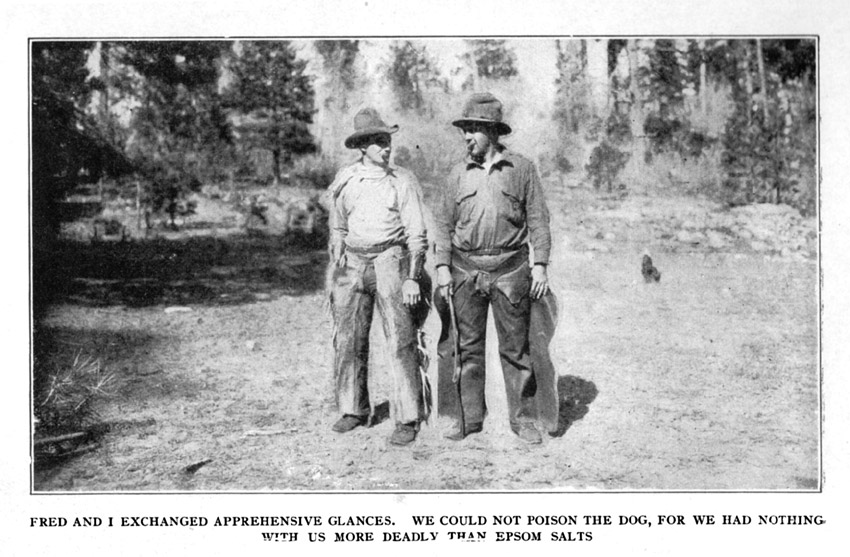
Uncle Jim Owen is a famous character and much has been written about him, but, next to him, the most important and interesting member of our party was Pot-hound, the dean of the cougar pack. Pot is a sad-eyed old canine, a veteran of many battles. His everyday dress consists of a haphazard assortment of liver-and-white spots, but on state occasions he wears, in addition thereto, a silver-mounted collar upon which is engraved his name and address, together with the following epitaph:
I have been at the killing of 450 lions.
“Is that correct?” we inquired of Uncle Jim.
“Um-m! not exactly,” he told us. “It’s nearer five hundred now. Old Pot will find cougar where there ain’t any.”
Fred and I exchanged apprehensive glances. Every moment it looked more and more to us as if we were in for a meeting with a mountain lion in spite of anything we might do. Nor could we poison the dog, for we had nothing with us more deadly than Epsom salts.
Uncle Jim has lived alone with his dogs much of his time, and he has formed a habit of conversing with them upon intimate subjects. Flattered by our attentions, Pot-hound had edged nearer to the fire than etiquette permitted, so Uncle Jim pecked the veteran on the shins with his poker, saying, mildly:
“Now, Pot, you get away from here, or I’ll knock a yelp out of you as long as a well rope.” Pot retired with a mournful dignity and seated himself with the rest of the pack. “He’s a powerful good dog, but these boys have spoiled his manners,” Uncle Jim apologized. “Yes, he’s a good dog. He saved my life once.” We had already learned that Uncle Jim is parsimonious with his reminiscences; therefore we maintained a polite but inquisitive silence. “I was hunting alone, for the government, one season, and my horse throwed me. Broke my right shoulder. One day Pot and another dog treed a lion, and I shot it left-handed. It fell like it was dead and went over a ledge, with them after it. I left my gun behind and went down to skin him out, but when I got below I found I’d only creased him. The dogs had him ledged up and he was as good as ever. When I showed up he made for me. He’d of got me, too, only they nailed him. Then we had it. We tore up a lot of ground. Every time the cougar went for me they’d go for him, and when he’d go for them I’d run in. I tried to kill him left-handed with a rock, but I didn’t do very well at it. I was plumb tuckered out when a cowboy heard us rowin’ down there and rode out to the rim.
‘“Shall I shoot?’ he hollered.
“We was all mixed up together, but I yelled back, ‘Gosh, yes!’
“He was all of three hundred yards above us, but he shot that cat right through the heart. Prettiest shot I ever saw. Then he put up his gun and rode away, and I never did know who he was. Funniest thing about it, he was the only man in those parts except me.”
Fred and Paul and I discussed this story later.
“It beats the deuce how some people can lie,” one of us said, and the others agreed. We were not referring to Uncle Jim—his story, we knew, was true in every detail—we were thinking of “Buffalo” Jones. Roping mountain lions was a whole lot different to roping trunks.
A word here regarding Uncle Jim’s dogs. Not only are they his helpers, but also they are his friends, and he treats them as such. He feeds them well, no matter how scanty may be his own grub supply; he sees to it that they have a tent and a bed as good or better than his. But while he is a considerate master, he is likewise a disciplinarian, and woe betide such impetuous members of the pack as, in a moment of abandon, take a deer track. Uncle Jim waits patiently until they return; then he dismounts, breaks off a stout limb, and cleans up. The welkin rings to his profane chidings, to their agonized excuses, and to a hollow drumming. Pot-hound never runs deer; he knows his business thoroughly, and when his younger colleagues take a false scent, he, too, sits down and awaits the inevitable reckoning. He enjoys that reckoning; it pleases him deeply, and he makes no secret of the fact. He is both satisfied and refreshed thereby, and he hunts better afterward.
We were away early on the second morning, and before we had followed the rim for a mile our dogs gave tongue and set off under forced draught. After them we galloped through thick, low cedars, the stiff limbs of which invited us to tarry awhile. Dodging and ducking and twisting, we tried to keep abreast of the pack, and, in order that we might find our way back, we left rags of flannel shirting here and there.
We plowed through thickets, head down, eyes shut; we plunged into steep-sided gullies where our horses stood on their hands; then we dismounted and toiled out, our lungs bursting, our pores streaming. In the course of this mad chase, which lasted a couple of hours, we made extensive private collections of thorns, cactus spines, and Spanish daggers. By the time we had quilled ourselves over like fretful porcupines, the dogs had gotten entirely out of hearing, and Ambrose announced that it wasn’t a lion, after all, but a coyote. Yes, Pot would sometimes take a coyote trail. Fred and I breathed easier. We got out of our saddles, rubbed our bruises, sucked our cuts, and dehorned ourselves. We agreed that it was a fine, free life, and very stimulating.
A long time later, when the dogs returned one by one, they were eager to explain, but too tired to hunt further, so we returned to camp, greatly heartened by the realization that two uneventful days had stolen past, during which we had neither treed anything nor been treed by anything.
In order that our method of hunting may be properly understood, it is necessary briefly to outline the habits and idiosyncrasies of our quarry. To begin with, the cougar is a night feeder. He spends his days in meditation, holed up under the rim in some convenient cave where he can enjoy the scenery of the cañon, but at night he comes up, grabs himself a deer, and has a party. He is an extravagant diner, and he seldom eats more than the heart and lungs of his prey. Sometimes he covers his kill and returns the next night for a cold snack, but not always. In nearly every brushy draw that we explored we found the remains of these midnight supper parties, and Uncle Jim told us that a full-grown mountain lion will destroy annually perhaps two hundred deer, and not infrequently domestic stock as well. It is for this reason that the government and local cattlemen employ professional hunters and there is no closed season on cats.
Our practice was to leave camp soon after daylight and rim the main and the larger side cañons until afternoon, when the sun had had time to dissipate the scent. Rarely indeed is a lion brought to bay on the level top of the plateau, for the dogs have to go over and rout him out of his sun parlor, and almost invariably he flees downward, not upward. It is the part of the hunter to follow wherever the chase leads, and, inasmuch as a cold trail may meander for many miles, in and out, up and down, even from one plateau to another and back again, it may be seen that the sport is not a languid one nor one well suited to weak-lunged sofa weevils.
This section of Arizona in the early spring has its climatic shortcomings, but they are more than offset by the ever-growing wonder one feels at the stupendous gorge. It is impossible to become accustomed to it, for it is never twice the same. To ride its edge behind a pack of dogs combined the sensations of hunting and of aviation.
Ambrose had determined to give us a good time if it killed us, and, appreciating the worth of his intentions, we lacked courage to tell him that any animal which was forced to endure the sort of life he was leading us deserved to be let alone. Therefore, we followed him day after day.
But it seemed that the lions had broken camp and had deserted Powell’s Plateau, a phenomenon which neither Ambrose nor Uncle Jim could explain, so after we had covered it thoroughly we folded our tents like the Arabs and stole noisily across to the main table-land. Anyone who has ever herded a pack train of wild horses will know why we did not steal silently.
Here again we resumed our daily grind of pleasure until our saddle galls, brush cuts, stone bruises, and miscellaneous injuries clothed us like a garment. Such portions of us as were without pain caused us serious apprehension.
Then, one morning, we became separated from Ambrose and the dogs. It was a warm, sunshiny morning. After we had whispered his name several times and after he had failed to answer, we decided we were lost. We were intensely cheered by this discovery, and we fell out of our saddles, stretched out on the pine needles, and proceeded to catch up on a lot of sleep which was coming to us. We slept for a long time, but at last we were awakened by distant shouting, which we recognized as issuing from Ambrose. Reluctantly we mounted and rode in the direction of his voice. Ambrose spied us at a distance and was seized with convulsions. He waved his arms; he leaped and he bounded; he gave utterance to hoarse sounds of pain and of fury.
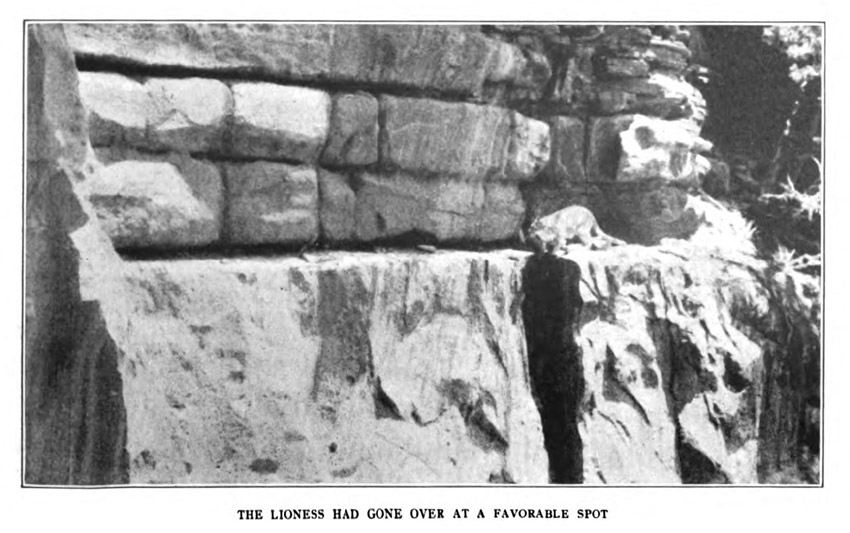

“Where have you boys been?” he demanded, huskily. “I been hunting you for an hour and yelling my head off.”
“We were looking for you. We thought you were lost,” some one told him.
“Well, tumble out and unchap yourselves. Here’s where we go over.” For the first time we became aware of a faint baying far below us. “I jumped him on the edge, and the dogs took him right down,” Ambrose explained. “They’ve had him bayed for an hour or two.” While he was talking, he had whipped the pack ropes from the camera horse. We divested ourselves of coats, chaps, and all unnecessary clothing. “They can’t hold him all day; he’ll get cramps and have to jump sometime,” Ambrose grumbled. “Next time we go out, I’m going to lead you boys on a hackamore.”
In view of the character of the descent ahead of us, we divided our load. Ambrose flung the chains and leather collar destined for our quarry into his rucksack; Fred took his lariats and some extra film cans; while Miller and Vaughan bore the camera and its heavy tripod. I, as gunman, carried my rifle and a small still camera. Thus we went over.
The cañon fell away at our feet, clear down to the red sandstone; then in dizzy leaps and bounds it caromed off to the level of the river a mile below. A horizontal mile isn’t much in the way of distance, but a vertical mile is altogether different. To quote from any real-estate folder, “it must be seen to be appreciated.”
Down we went through the brush, like trapeze performers; then, with a lariat, we lowered ourselves and our paraphernalia over the first ledge. We dislodged a great deal of good building material as we hopped, skipped, and jumped down a bare slide; we started avalanches of paving blocks, crushed stone, and rubble, the larger pieces of which described beautiful parabolas and took out small trees in their courses. Occasionally they struck other large stones and exploded in clouds of dust. One could not but wonder how far he would ricochet if he lost his footing, and what kind of a sound he would make when he exploded. We slid through slanting juniper thickets to an accompaniment of rending garments; we coasted across patches of thorn brush with all the sensations of men tobogganing over barbed wire. And, as we went, the music of the hounds increased until the cliffs reverberated with it. We crept round the Roman nose of a steep bluff, filtered down through an abatis of gnarled cedars, and—Eureka!—there was our lion.
She was a majestic creature, a big female; she was poised gracefully about twenty feet from the ground, and beneath her the dogs were boiling. She favored us with a grave and dignified stare, then resumed her observation of the pack below. The mountain side was pitched at the angle of a church roof; nevertheless, it was exceedingly brushy, and so there was little opportunity for photography. I took several stills of her while we were waiting for Miller and Vaughan to appear with the moving-picture camera, but limbs obscured the view and the result was nothing to be proud of.
“She won’t stand much longer,” Ambrose warned us. “Scatter out below, and be careful she don’t jump on you.”
I, for one, was perfectly willing to exercise extreme care in this respect, and I ventured the suggestion that Ambrose direct his warning to her, not to us.
When Miller arrived he was pretty badly battered and scratched, but the camera hadn’t a mark on it. He set it up and took a few feet.
“It’s too thick to rope her from the ground,” Fred declared.
“Let me shoot her,” I urged, but my suggestion was scorned. Both Fred and Ambrose assured me that this was a lion-busting, not a lion-shooting exhibition.
“She’s all rested up. I dunno’s she’ll stand for us to climb the tree,” Ambrose opined. “But we can try. Well, who wants to go first?”
Honesty compels me to state that Ambrose’s invitation presented no attractions for me. I dare say I could bring myself to rope a lion, a very young and playful lion with short claws and milk teeth, although I would much prefer to shake the tree, and let it fall out, but this animal had fangs and tusks and wisdom teeth. Moreover, it had done nothing to me to warrant roping. Then, too, I reasoned, lions were scarce and there was no certainty that there would be enough to go around if I selfishly monopolized this one. Gently but firmly I declined the proffered honor. When the boys became insistent, I reminded them that I had come along to protect them, to set them an example of calm, inflexible courage. This I intended to do if I had to stay where I was until my legs petrified or until the lioness died of old age on that limb.
Doubtless my attitude in the matter shamed Fred, for he volunteered.
“Wait a minute!” Miller broke in, with more animation than he had yet shown. “I want to get a close-up of this. This is going to be good!” He brought his outfit nearer the tree, spraddled out the legs of his tripod, then stood on his head while he focused with minutest care. “I don’t want to miss a thing,” he explained. “Not a single thing except—the noise of the fight. I want to get the blood and—everything.”
“Better hurry; she’s getting restless,” Ambrose urged. “I guess her foot’s asleep.”
It was some distance to the lower branches of the cedar; therefore he gave Fred a hand up. Meanwhile, I reassured both of them with quotations from “Buffalo” Jones’s lecture, also by the statement that no matter what happened, I would be somewhere in the vicinity.
Our program did not work out according to calculations. Not at all. Fred got into the lower branches of the tree, but instead of retreating, as lions are supposed to do, instead of recoiling in terror before the well-known power of the human eye, this one opened her mouth as if to get her throat sprayed and came down to show it to Fred. She came with a rush, too.
“Look out!” Ambrose yelled, whereupon Fred peeled the lower part of that cedar as bare as a telegraph pole. For a few feet he and the lioness were neighbors; they came down together, face to face, cheek by growl, as it were, leaving a trail of charred wood and smoke above them. Then, as the increasing force of gravitation made itself felt, Fred gained on her. Finding that she could not outrun a falling body, the cougar scrambled out a projecting bough and launched herself into space. Either I looked soft and springy to her or my hair resembled a bunch of thick grass in which she thought she could find concealment—anyhow, she selected me as a leaping-pad. Fortunately she miscalculated, and fell perhaps forty feet below the tree, but much nearer me. She was off like a flash, with canine pandemonium at her heels. As she passed Vaughan, he roped at her and made a perfect catch—of a juniper bush back of him.
“Come on, boys; we got to step on her tail” Ambrose yelled. And away we dashed.
I came to rest upon the rim of a moderately high precipice in time to find that some of the dogs had missed the trail. The lioness had gone over at a favorable spot, but the younger members of the pack had raced along the ledge for some distance before discovering their mistake. Old Pot-hound, however, had not been so easily fooled; he had kept his nose to the ground and had taken nothing for granted. He, too, had gone over, and was now giving tongue below us and back to our right. With frantic wails, the young hounds answered him and leaped blindly. They struck the slope below and in a clatter of gravel fled out of sight.
There was no time to waste. Again we repeated our first mad descent until we fetched up at the white limestone, which dropped sheer for perhaps three hundred feet. Along the top of this we crashed for half a mile until we came up with our prey. There were no trees here; she had come to bay on a huge white bowlder. She was lashing her sides and snarling soundlessly, and she presented a magnificent sight outlined against the void beyond. By leaping high, the dogs could reach her feet, and she was stepping about gingerly to avoid their attacks. Somewhere in the brush above, Miller and Vaughan were coming with the camera and tripod.
“Lemme shoot her!” I gasped once more, but Ambrose sternly declined to entertain such a thing.
“When the boys get set up,” he wheezed, “we’ll snatch her off that rock in jig time. It ’ll make some picture.”
I obediently uncocked my rifle and cocked my still camera, but just as I raised it she once again took to flight.
I favored Ambrose with a loud horse laugh and patted my Winchester.
“This is the thing,” I declared, “to hunt lions with. Now we’ve lost her.”
So it seemed, for the chase led back along the top of the limestone, then descended a break in the cliff. At no time could we see either the lioness or the dogs, but the strain of our hound orchestra kept us apprised of her general whereabouts. Far below us lay the wide shelf formed by the “Tonto red.” It was heavily overgrown and comparatively level—that is, it did not slant at an angle of more than forty-five degrees. Here the quarry bayed for a third time, and when we heard the new note in that chorus of canine frenzy, Ambrose gaily cried:
“Going down! All aboard!”
But this was a different proposition to the other two descents. No one but lion hunters tackle the white limestone, and when our camera man craned his neck over the edge of the abyss he behaved exactly like that horse at the crossing of the Colorado—he laid back his ears and balked. It seemed an impossible task to take a camera in and out of such a place, so we sent him and Vaughan back up the long climb to the plateau, while Ambrose, Fred, and I nerved ourselves to go down and administer the coup de grâce—an undertaking which called for prayer and meditation.
When we had reached the red sandstone, Ambrose cautioned us to go quietly, for, said he: “These she cats won’t stand. If she makes another break we’ll have to follow her over the red, and we’ll be old men before we can climb out.”
We did our best to follow instructions, but the going was steep and treacherous, and we made more noise than three wooden-legged painters on a piazza roof. Probably the furious barking of the dogs drowned the sounds of our approach, for the lioness held her stand.
She was in a thick, low-spreading cedar, and three of the dogs were in the tree with her. It would have made a good picture, but here again it would have taken an X-ray to penetrate the cover. Governor, a wicked, white-eyed Siberian wolfhound, had worked his way up to where he could almost nip the cougar’s feet, while Tub and Fanny, a young matron who had left a family of nursing children in camp, urged him to be game and do so.
“You got to kill her cold, the first shot, or she’ll get every dog in the pack,” Ambrose whispered.
It was pretty close work, for the animal’s neck was hidden, and I could only make out a part of one tawny shoulder.
At the crack of the gun, the lioness was gone, and so was Ambrose. There came a savage chorus of yelps, growls, howls, and exclamations from the dogs, then a furious crashing in the undergrowth. As I ran past the cedar, Tub was yelling murder at the top of his voice and holding up a limp fore leg, while, securely wedged in a narrow fork overhead, Fanny appeared to be taking a swimming lesson, meanwhile uttering one ear-splitting shriek upon another.
Her cries were not of agony, as I momentarily feared, nor was Tub’s injury the result of a blow from the lioness. He had wrenched his leg, and Fanny—well, Fanny’s figure was not what it had been before those puppies came; hence her mishap.
No; the deer-devouring career of that cougar had ended in the very act of kicking off that limb, and the dogs were worrying her when we arrived. We allowed them to think they had done the killing, which, I learned, is a part of the game.
“We got her easy, didn’t we?” Ambrose said, wiping the sweat out of his eyes. “We’ll top out before dark, if we hurry.”
“I won’t,” Fred firmly declared, “unless I find the rest of my pants on the way up.” He backed into a thick brush clump, where he blushed a dull brick red every time we looked at him. “What a fellow needs for this business,” said he, “is a pair of sole-leather running tights.”
It was a long pull back up the cañon side; the green hide was heavy, and we left a number of dried-up springs in our wake. When we finally rose over the rim we found Miller in low spirits, but loud in his opinion of lions and lion hunters.
“You boys move too fast for good pictures,” he complained. “Why, I didn’t get fifteen feet of Fred in that tree! You must take your time. Stick! When I get you right, stick! Gee! I’ll be a joke at the Screen Club if this keeps up! You guys will ruin my reputation.”
It was Fred’s turn to be indignant.
“Didn’t I stick?” he demanded. “I was twenty minutes climbing down out of that tree.”
“Fifteen feet,” Miller declared. “Less than a second. That’s how you stuck! Well, we’re going to rehearse the next stunt. You boys are going to go down and rope the next lion we find and bring him out. I’ll stay up here and look for a nice open tree where the light is right; then we’ll untie him, put him up it, and I’ll get a real picture. You can take turns in front of the machine; you can rope him till he’s ragged. Only, MOVE SLOW.”
“Pack out a live lion?” I inquired, in dismay. “Out of—there?”
“Sure! You’re a big, strong guy.”
For some unaccountable reason Ambrose seconded this fantastic idea. He seconded it with enthusiasm.
“We’ll do that very little thing!” he cried.
It is true I am big and strong, but my strength was not equal to this unfeeling proposal. I became giddy and my knees gave way. When I revived, some one had propped Fred against a tree and was holding snow to his temples.
Alas, the power of an evil suggestion! It recurs. It grows until it obsesses the mind of its unhappy victim. This phenomenon, I am told, accounts for much crime. That extravagant proposal to subdue a wild lion and to take it out of the cañon alive preyed upon us. It was preposterous, absurd; nevertheless, we could not escape it, once it had taken root in our brains. The very monstrosity of the idea rendered it hideously fascinating, and we were drawn to it as moths are drawn to a flame. We had come to Arizona to rest and to recuperate; we didn’t want to pack anything into or out of any cañon, much less this one. Very much less did we desire to have dealings of such a nature with a live and peevish lion. We had packed one empty lion-skin out, and we were not the same men we had been. To think of scaling those cliffs with another skin stuffed and mounted with the live, pulsating, indignant carcass of its original owner caused our joints to complain and our veins to run water. We lost much sleep over the possibility that we might be induced to tackle such a horrid undertaking; our appetites disappeared; we became irritable and weakly hysterical. We awoke in the stilly hours with frightened cries, for our dreams were peopled with saber-toothed nightmares. But all the time we knew that we were going to do it, for it takes courage to be a coward, and we were just ordinary, unheroic citizens.
During the next few days we left Miller in camp while we hunted—with encouraging ill fortune. We hunted in every kind of weather, all of which was bad. We hunted the high rim; then we went below and hunted the red sandstone. We hunted in rain, in fog, and in snow. We got lost, and for long hours we wandered through the forests, wet, hungry, miserable, buoyed up only by the realization that if we perished thus we would not have to rope a live lion and lug it out of the cañon. But invariably we got safely back to camp. Our good fortune in this respect became monotonous.
Let me state, in passing, that it is an experience to rim the Grand Cañon in a fog. The world is ghostly and unreal; objects are magnified; gnarled trees and queer rock formations assume the likeness of prehistoric monsters, and one has no more sense of direction than a jellyfish. There is a constant temptation to ride off into space, and no little danger of doing so, for the earth’s surface breaks away as if it had been removed by a cleaver, and when the cañon is bank-full of thick vapors, it looks as inviting as a feather bed. One skirts it with the sensations of riding the clouds on a winged steed. More than ever is one amazed to learn how far the off side of a horse sticks out, and when one’s animal stumbles, one involuntarily bites one’s left ventricle, which in itself has an element of danger in it. Occasionally the mist will thin until, far below, away down between the horse’s feet, slim spruce-tops are dimly discernible; again it will close like smothery curtains, through which one must blindly push.
On one such day we were drying out around a fire, the dogs were shivering wretchedly, huge wet snowflakes were coating us like goose feathers, when Ambrose voiced the fear that we boys were not getting our money’s worth out of the trip. It was his idea that we should leave camp much earlier, and thereby have more time in which to enjoy ourselves. We wrung out our mittens, clawed the accumulated snow from the backs of our necks, and through chattering teeth assured him that any more enjoyment of this sort would probably give us pneumonia. But he was set. When we considered the matter, we decided that pneumonia wasn’t so bad, after all. Congestion, fever, delirium had the edge on mutilation at the hands of a cougar; therefore we offered no strenuous objection when the matter was put up to Uncle Jim.
Uncle Jim is a thorough man, and literal to a fault. He had us out the next morning at half past two, and he kept us awake with a sharp stick until we had swallowed our breakfast. To amuse us and to occupy our minds, he told us a story.
“There’s a trade rat around camp—” he began, but was interrupted.
“What’s a trade rat?” some one poisonously inquired.
“He’s a kind of rat that never takes anything without leaving something in its place—maybe nothing more than a twig or a pebble, but something. You’ll see their nests all over this country. I had a party out once, and there was a woman in it. One day she lost a pair of gloves. We couldn’t find ’em any place, and the next night she lost her pocketbook with all her change in it. I told her a trade rat probably had it, but she allowed a trade cowboy had probably done the trick. I saw she didn’t believe there was any such rats, and she went home thinking one of my boys had robbed her. It made me feel awful bad.
“The next year I camped in that very place, and in the morning I found one of those gloves in the grub box and one of my spoons gone. I put Pot-hound on the trail—he’ll track anything I tell him to—and he run Mr. Rat down in short order. In the nest I found that other glove and the lady’s pocketbook, along with a lot of table silver I’d lost at odd times. I sent the pocketbook to the lady, but I bet she thinks I’d ought to pay interest for the time I used her money.”
We left camp at four o’clock, while it was still so dark that a man needed a lantern to blow his nose, and at nine o’clock Pot-hound let out a deep boom. The young dogs nearly upset him in their desire to corroborate his discovery and to split credit for it. It was a cold trail, however, and they quickly overran it. After this false start they returned for a consultation; then they followed the veteran, who set off at a moderate pace. Pot will not be hurried, nor will he permit himself to be discouraged.
“It’s a lion,” Ambrose announced, “and he’s in the game bag.”
During the next three hours we witnessed the most wonderful, the most uncanny exhibition of canine sagacity I have ever beheld. The trail was evidently hours old, and it had been made by a hunting cougar, for it meandered aimlessly. It ran into and out of draws; it took us far back into the forest, then out again to the edge of the chasm.
Meanwhile, the sun was bright, the heat was intense, and the scent was becoming ever more difficult to follow. We sat our horses for perhaps a quarter of an hour at a time while the dogs worked a space no larger than a room. They would smell every leaf, every pine cone, every twig; they would rear up and smell both sides of overhanging branches for the full length; they would lip the ground until their tongues were black. Occasionally they would break away and make wide circles, only to return and take up the scent where they had lost it, working out the trail with the care of scientists.
After a couple of hours, the younger ones gave up and lay down, baffled, exhausted; but Pot-hound persevered in his investigations, for all the world like some patient old professor in a laboratory. By this time he could detect the scent only in shady places, and there but faintly. He would give tongue at the base of a tree, then trot across one open space after another until he caught it again. He possesses the hunting instinct raised to the nth degree of refinement, and I seriously doubt if any other animal on this continent could have duplicated his performance.
We had skirted a deep cañon which ran back into the mesa, when Ambrose said:
“There’s a spring down yonder. Let’s take the dogs under and give them a drink. Maybe they’ll strike the trail down there.”
Accordingly, we tied our horses and descended. We found the water—and consumed most of it—then Ambrose led the pack down the gulch on a fruitless quest. He returned with the regretful announcement that all bets were off and we’d better go home.
Up we climbed and remounted our horses. But, although the young dogs were delighted to call this a day’s work, Pot refused to leave. Ambrose called him, but the old fellow was once more meandering from shade to shade, occasionally giving voice to his announcement that the king had passed this way. We waited. Eventually the rest of the pack rose stiffly and followed him, but with expressions of resignation which made it plain that they considered Pot a stubborn old fool who had to be humored.
Ambrose held his sombrero to his ear. There came a faint soprano yelp from Fanny, then a doubtful boom from Governor; later, we heard a distant commotion under the rim. Ambrose replaced his hat.
“Come on, boys,” said he; “they’ve treed him!”
Away we galloped, and when we dismounted, a few moments later, a blood-stirring chorus rose from beneath our feet, and we could see the dogs leaping at the base of a tall pine far below.
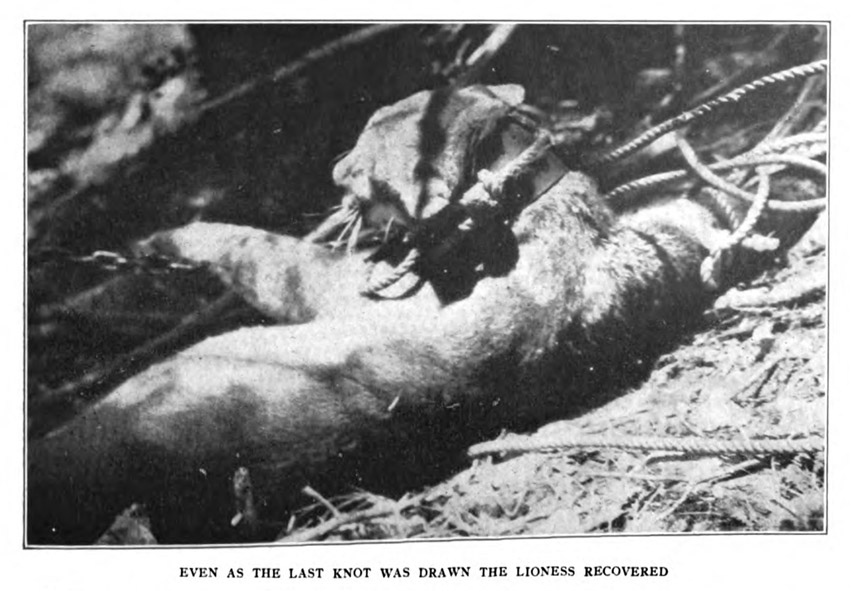

“No rough stuff this time,” Ambrose cautioned, as we went crashing downward. “We’re going to rope, throw, and brand this bird, and bring him out alive.”
This cougar looked like the twin sister of the other one. She, too, was poised in the lower branches of her tree, and peering curiously down at the dogs when we arrived. Once again we took positions where we could ease her fall in case she decided to jump.
Ambrose, with his lariat in his teeth, went up to call, but as he mounted toward her the lioness retreated. After some trouble he managed to get above her, but as he uncoiled his rope she quitted her position and soared outward in a mighty leap.
She hit so hard that she bounced, but away she darted, with the dogs at her tail and with us rampaging after. A quarter-of-a-mile run and we found her rocking comfortably in a brushy oak. The branches hid her body, but her head protruded from the very top. Hurriedly we cut a pole for Ambrose, but it was not a good pole-growing neighborhood and the staff we fashioned was clumsy. With it he undertook to place a loop over the animal’s neck. It would seem to be a simple matter to snare a lion under such conditions, but it is not. When the noose neared her head, the cougar tucked her ears back out of the way and bit the pole in two. While Ambrose persisted patiently in his enterprise, Fred climbed to a bowlder where he could get elbow room and began to throw at her. She was just out of reach of his rope, however, and his casts fell a foot or two short. He built loop after loop and sailed them up, only to have them settle a trifle below her. After each cast she seized the rope in her teeth; whereupon there ensued a tug of war. It was a pretty game to watch.
Failing in these attempts, Fred climbed a neighboring oak, the while we engaged our quarry’s attention, and it began to look as if the affair were about over. But as he broke a limb to accommodate his cast, she looked over her shoulder straight into his countenance and decided the neighborhood was becoming uncomfortably crowded.
Justice to that cougar compels me to say that Fred was not nice to look upon. It was a hot day; he was sweaty and his beard was stiff, but personally I could see nothing in his appearance that would have caused me to kick off the whole top of a tree. Of course, I know Fred and I like him. I am prejudiced in his favor. I have seen him when he looked even worse than at that moment; but lions do not make friends easily and there was something about him that this one did not care for. How she escaped a broken collar bone or a sprained ankle I don’t know, for she lit with a terrible flop.
Back we scuttled, over the very trail we had just covered. We knew it to be the same trail, for there were familiar pieces of cuticle on the brush, and the rocks gouged us, the thorns ripped us in precisely the same places they had gouged and ripped us en route hereto. The cougar bayed in the very pine tree from which we had dislodged her in the first place, and we realized that our trip to the oak and back had been a complete waste of time, effort, and epidermis. It had been a perfectly senseless and futile performance, and we told the lioness so.
Once more we climbed that tree, and once more she jumped. Doubtless she intended to hotfoot it back to her acorn bower, thence back here, repeating the journey over and over until monotony wore us down or until those thorns and brambles reduced us to harmless shreds. But Governor, the Siberian wolfhound, spoiled her pretty little program. He leaped upon her back, sank his incisors into her neck, and enjoyed a free ride until he was scraped off.
I have never had a dog bite the back of my neck, but I am ticklish, and I know I should resent it as bitterly as did our lioness. Having rid herself of her passenger, she plunged straight down the slope, and the pack swept after her.
We men sat down and groaned. It was then and still is my belief that a rope is a darned inconclusive weapon with which to hunt wild animals. A slippery-elm club offers far better terminal facilities.
By this time those lariats and leather collars and log chains which we had painstakingly carried back and forth had come to weigh as much as a collection of anvils, for in such a country a quill toothpick will tax a man’s endurance.
“You g-go ahead and—keep her mind occupied,” we told Ambrose. “We’ll bring the junk.”
Ambrose acted upon this suggestion, and went bounding down the hillside with a fine, free, double-action movement. When we had crashed our way down, then clawed our way up the opposite side of the gulch, we found him trying to convince the lioness that his loop was perfectly painless and would not harm her in the least.
“It’s no go!” he yelled, above the din of the dogs. “She’s et up every pole I’ve cut!”
As a variation to our former practice, both he and Fred went up this tree together, and while Fred diverted the animal’s attention by sundry devices, Ambrose at last succeeded in slipping a loop over the cougar’s head. Oddly enough, she paid no heed whatever to the rope, once it was in place. Fred took the end of it and cautiously drew it snug, while Ambrose rigged a second snare on the end of his pole and repeated his previous maneuver. We let out a feeble, apprehensive cheer to celebrate our daring capture.
“Now then, let’s stretch her,” Ambrose suggested.
This was no difficult operation, although Fred somewhat complicated it by falling backward out of the tree and jerking the lioness from her perch. Fortunately, however, she fell over a limb, the rope held, and she remained suspended. There was a momentary question whether she would come down and take Fred up or vice versa, but Ambrose wrapped his legs round his perch and hung grimly to the other lariat. Meanwhile, our victim was spinning like a gyroscope, and turning aerial handsprings until the whole tree shook. She was livelier than a tarpon, and we were glad our tackle was heavy.
Hurriedly we tied up the dogs, then lowered the lioness. Now, the air at eight thousand feet is rare, but our hangman’s nooses at her throat had rendered it rarer still, and she was limp when we let her down. She had fainted; hence it took but an instant to tie her feet. Even as the last knot was drawn, however, she recovered, and she recovered with a rush. Her eyelids did not flutter; she did not heave a long hesitating sigh and say, “Where am I?”
Nothing like that. She knew where she was and she knew where I was—or where I had been a minute fraction of a second previously.
I left those trousers on the plateau when I came home, for they were of no further practical value and I had a pair of chaps.
It is easier to muzzle than to rope a cougar. You merely cut a short, stout stick and present it gingerly. The cougar seizes it—and one or more of your fingers—then you bind the stick in place with a few deft turns of rope and bind your fingers back where they belong with whatever is handy.
Ambrose wore a grin to match that of the gagged cougar.
“This is the life!” he said, joyously. “Now all we got to do is pack her out.”
That was all. By lying flat on our backs we could manage to look up to the rim, but it was then three o’clock in the afternoon and we had not eaten for twelve hours. Camp was perhaps eight miles distant. Some one suggested leaving the lioness chained to this tree for the night, but Ambrose would not hear of it.
“If we get her out now, she’ll be fresh as a daisy to-morrow. We can get her out all right if we handle her easy and don’t bust her corners.”
Accordingly, we cut a pole and threaded the lioness upon it. To climb the side of the Grand Cañon with a stout sapling on your shoulder is no cinch. When to that sapling you add a two-hundred-pound lion en brochette, the task assumes real proportions. For every step you advance, you slide back two; for every foot you mount, the rim grows two feet higher. The brush is stiff and it all slants downhill; the suspended lion swings like a pendulum and threatens to throw you. We found it easiest to proceed on our hands and knees. In this position we could proceed with comparative comfort—as much as three feet at a time. It was very hot, and inasmuch as the man on the downhill end of the pole wore the cougar round his neck like a fur boa most of the time, he experienced a constant feeling of oppression—a shortness of breath, a very real discomfort Then, too, her whiskers got in his ears.
At one time, her front feet came untied, and for a few moments there was a break in the monotony while we tramped down a good many yards of brush and rolled them flat. To train for such a contingency, one should hug a buzz saw for ten minutes every day on an empty stomach. Ours were very empty.
Inch by inch we ascended, and for every moment of distress we had caused that creature, she caused us two. Halfway to the top, she was breathing heavily, possibly from restrained laughter, so we laid her in the shade and Fred went down to the creek and brought up a hatful of water. We poured it in her face; she gargled it and mastered her amusement.
The pole broke and we had to shorten it, which rendered the affair more difficult; we strained up the face of cliffs and over bare ledges, where we sunk our nails in and clawed until the sparks flew. At six o’clock we topped out. We had been only three hours coming up.
If I were asked to choose between repeating that performance and toting a grand piano up the Palisades of the Hudson River, I would unhesitatingly choose the piano.
By now we had formed the habit of going on all fours and had to learn how to walk upright. The lioness was thirsty again, and inasmuch as the dogs were still tied down in the cañon, Ambrose offered to play Gunga Din to the cougar while we returned for the pack.
We had left Paul with the dogs. When we reappeared he voiced an unfeeling inquiry as to how we had found all the home folks in New York.
“What have you boys been doing for the last three hours?” he demanded.
“Oh, nothing—just climbing around,” we told him.
“Did you get her up?”
“Easy!”
“Never scratched her varnish,” Fred declared. “To-morrow we’ll put her in a nice tree and pose on every limb. They’ll be some pictures, believe me.”
But Paul was pessimistic.
“I don’t care much for these fake ‘movies,’ ” said he. “Give me the real thing.”
“Who’s going to know this is a fake?” we demanded. “We can look brave—after we’ve rested up, and—”
“Humph! I think you’re a couple of nuts.” This seemed to be a harsh judgment under the circumstances, but we lacked strength to argue.
We led the dogs on their leashes until we were nearly to the top; then we called to Ambrose, who had topped out ahead of us with his sombrero full of water.
“Is it all right to turn the dogs loose?”
“Sure! Turn ’em aloose!” he yelled back. “I’ve got her half skinned.”
Fred and I clung weakly to each other.
“Wh—what!” we screamed.
Ambrose came to the edge of the cliff and leaned over.
“We should have left her where she was,” he shouted. “Her belly was full of fresh meat, and when I got back she was dead. Indigestion, I guess.”
“Couple of nuts!” Paul muttered, as he toiled painfully upward.
Ambrose had spoken truly. He had returned from his errand of mercy to find our victim no longer of this world. He had her hide off when we reached him.
Night was approaching; the deep side cañon lay between us and our horses; camp was a long way beyond, and an inexplicable lassitude had come over us. We were a silent party; no one had much to say except Paul, and his remarks we chose to ignore.
We took a short cut on the way to camp, and, to mark the end of a perfect day, we got lost. In all likelihood we would have wandered through those woods until we perished from loneliness, and the painful details of our vacation would never have been written had not Bill Vaughan stumbled upon us about midnight and led us back to Uncle Jim’s fire.
That concluded my part of the entertainment. I had had enough rest to do me, and the strenuous business of pencil pushing called me home; so the next day I left the plateau.
I had intended to return by way of Bright Angel Creek and the safe-and-sane trail to the El Tovar, but Uncle Jim and Ambrose shattered my dream by announcing that the water was too high and that I must go back as I had come. Thoughts of the rampageous Shinumo, of that rickety cable, of the breathtaking, hair-raising features of the trail down and up to Bass’s Camp arose to haunt me; therefore I was not ashamed when I broke down and sobbed upon Fred’s shoulder. Nor was he unmoved at the parting. With tears in his eyes, with a quiver of deep and genuine emotion in his voice, he said:
“When you get back to the hotel—if you do get back—eat half of a chocolate cake for me. I’ve heard it tastes fine.”
I urged him and Paul to return with me. I told them they had rested long enough, and I spoke feelingly of stewed chicken and dumplings, but they sadly shook their heads and said no; the trip was benefiting them and they were going to stay with it as long as their strength lasted.
When Miller pressed my hand, he said: “I’m certainly sorry to see you go, for I’m afraid those other boys aren’t husky enough to pack out another lion. Now, you—”
But I clapped my hands to my ears and fled. Why recount the happenings of the return journey? Ordinarily I loathe stewed chicken, but visions of a large platter of it, garnished with some chops and a steak or two, buoyed me up, and I broke the trans-cañon record. I ate half a chocolate cake when I got in, but I did not think of Fred. I thought of nothing but that cake. It was a delicacy I had never before tasted.
The other boys stayed on. They got more lions, and they experienced numerous adventures more interesting than those I have recounted, but those adventures form no part of this story.
It was during that fishing and hunting trip to the San Blas coast of Central America that I was first seized with an acute interest in the Gulf of California. Salisbury, my companion on that trip, had talked about it somewhat after this fashion:
“I’ve been where the fish were so hungry I had to stand back of a tree to bait my hook, but in the gulf you don’t have to bother with bait at all. They’ll bite the propeller of a launch. All the bait you need is a rag. You can’t troll it fifty feet before a fish will nab it. Before you can reel him in, a bigger fish will have him, and another one still bigger will grab that one, and then a whopper will nail fish number three and—and—why, it’s merely a case of fitting one fish over another until your tackle breaks!” Salisbury was panting; in his eyes was that mounting maniac glare which every sportsman recognizes as true Dementia piscatoris. “And hunting! Hunting? Say! I stood in one spot on Tiburon Island and, without lowering my hand, I killed seven deer with a six-shooter.”
“Number, please? How many?” I queried.
“Seven! Big burro deer—four hundred pounds apiece!” Salisbury’s arithmetic is of the free, outdoor variety, but, after all, what is one deer more or less? “I can lay a boat alongside of bluffs where you can shoot mountain sheep so they’ll drop on the deck,” he ran along, wildly. “And cannibals! Boy! If you want cannibals, there’s a bunch of ’em on Tiburon.”
Now, I never had wanted a cannibal. I could not imagine anybody feeling the faintest yearning for one, but before Ed had finished with me I felt the first subconscious craving in that line and registered a vow to inflict my personality upon that innocent man-eating community at the earliest opportunity.
But that opportunity was delayed; it took me a long time to devise an excuse sufficiently plausible to convince my wife that my presence was needed in the Gulf of California. Any married hunter who has inherited the wandering foot, any wedlocked fisherman born with a silver spoon-hook in his mouth, as it were, will understand the adroit indirectness with which I led up to the mention of a wholly fictitious business opportunity in the upper gulf that needed investigation. Slowly, through the months, I built up its importance, until, at last, I reluctantly decided to tear myself away from my work and look into it, just to have it off my mind.
Salisbury, too, had his difficulties, for he had gone into the navy, and navies—like wives—have put the kibosh on many a glorious and unnecessary vacation. The day came, however, when we could proceed with the delightful vexations of preparing for the trip. During the interim we had clothed that imaginary commercial enterprise in such realistic garb that we believed in it—what is more, we had convinced several other tired business men of its reality, and they, too, had decided that the Gulf of California had gone along without them as far as possible and could no longer succeed alone. Gravely we negotiated with yacht brokers for a charter; secretly we chattered about the wild men of Tiburon, and bought unlimited quantities of guns, ammunition, rods, reels, harpoons, cast nets, gaffs, and boat hooks with which to demonstrate the oil and mineral possibilities of the country.
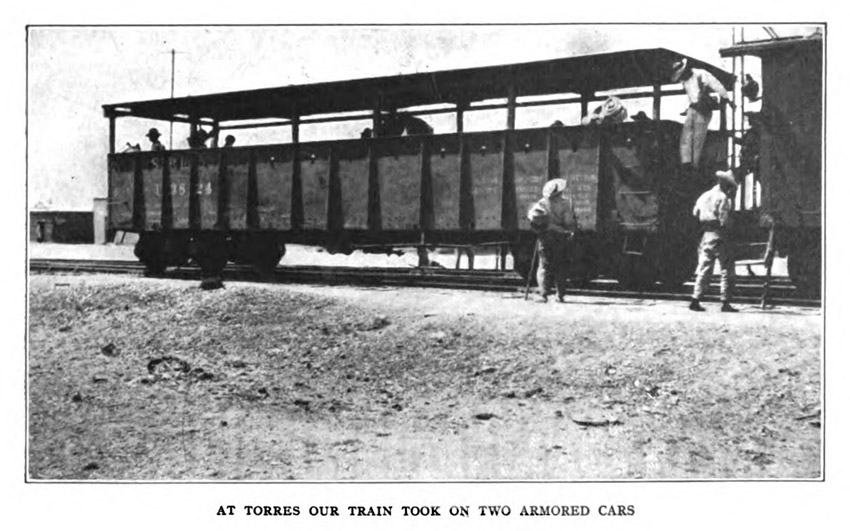
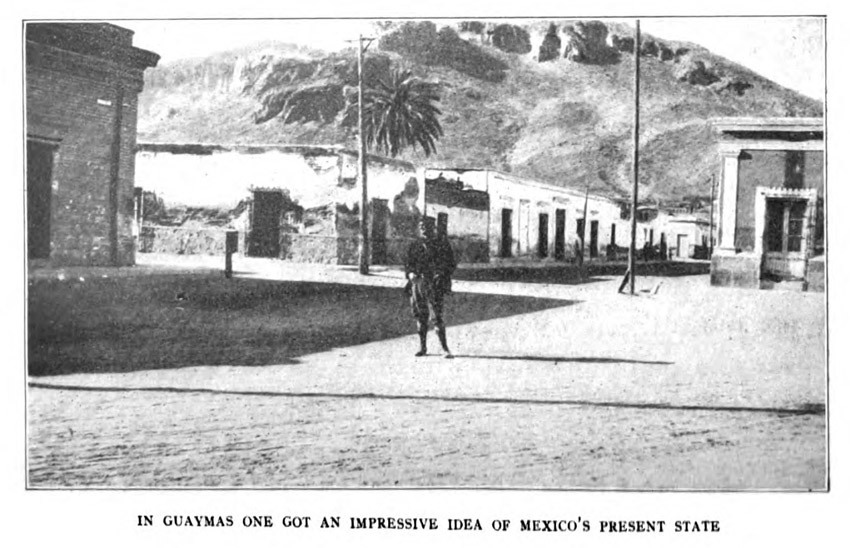
We laid in a large supply of boat hooks, for we reasoned, conservatively enough, that not all the mountain sheep we purposed shooting would fall upon the deck of the yacht. Some few would doubtless miss the boat or bounce overboard, and we did not wish to lose any specimens; hence the necessity of tools with which to retrieve them. After some debate, we decided not to pad the deck of our craft. What matter if some few horns were broken by the fall? Game was all too plentiful, anyhow, according to Salisbury. So plentiful was it, in fact, that we swelled our party to twice its intended size in order that no meat should spoil.
There was Pettis—he makes cannon and car wheels and various kinds of steel and iron fancy work; my brother Elmer, who, out of the fishing season, works at the law business; “Doc” Wilson, who conducts a sanatorium for the treatment of motor troubles, administers gas to and operates upon sick steamboats, launches, automobiles, and the like; and “Carrots,” alias McDowell. “Carrots” volunteered to sign on as cook, and we permitted him to do so because he declared he was a good shot.
At the last, just as the boat was about to hop off from San Pedro, on its twelve-hundred-mile hike to Guaymas, Crisp arrived out of breath and with the dust of the Hollywood studios still upon him. He wore a yachting cap from the property room, and he gabbled feverishly about shooting thirty scenes a day for five days and changing a seven-reel dramatic feature into a two-reel comedy in order to reach the dock on time.
Ed Salisbury we had promoted, by consent of all except himself, to navigator, and for the engine room we had Ed’s brother Bill—Bill also being née the navy. He had just received his discharge from the service after a trip through the Panama Canal in the bowels of a destroyer and was fed up on seagoing stuff. He couldn’t walk down an alley without bracing himself and hanging to window sills, but we persuaded him to go along for the rest and act as governess to the motor. We hope, in the course of five or six years, to live down the promises we made to Bill, and he expects, in the same length of time, to lose the flavor of cylinder oil and get the grease out of his pores. Neither, however, is in any way probable.
The owner of the yacht Par acted as general chaperon, and, lastly, there was Eddie, a Nicaraguan colored boy of indefinite age. Candor compels me to admit that without Eddie the whole trip would have flivved. Lacking him, we would have been unable to concentrate our attention upon the wide industrial problems we had set out to study; we would have been forced to heave in the anchor, make up the berths, wash down the decks, tidy up the gear, wait on table, row the small boat and run the yacht tender, prepare the vegetables, wash the dishes, and so forth. But Eddie relieved us of these minor annoyances, and, moreover, applied himself to a multitude of other tasks more trying. He did everything that in any degree savored of work, except run the engine, and by and large, watch by watch, he is the best crew I ever sailed with. Any boy who can successfully serve as the entire personnel of a ship with nine captains in authority over him is worthy of advancement. This we recognized, and so, whenever new responsibilities arose or new tasks became necessary, we unanimously elected Eddie to do them.
To yachtsmen cruising in west Mexican waters, gasoline is a problem, for it is scarce and poor and commands about the same price as the best grade of contraband alcoholic beverages. When our boat sailed, her tanks were full, her decks crowded with steel drums, and her cabins packed with case goods. She smelled like a dry-cleaning establishment and was anything but an ideal retreat for a bunch of tobacco fiends.
Pettis and I were considered of less value than our weight in gasoline; so we went by train to Guaymas, the most northerly town on the Gulf of California, picking up my brother en route.
The Southern Pacific of Mexico, a subsidiary of our Southern Pacific, at this time ran three passenger trains a week in and out of Mexico, connecting with the main system at Nogales, Arizona, a town built astride the international border, and this intermittent schedule served a double purpose: not only did it allow the border customs officials more time in which to harass, humiliate, and annoy travelers, but also it made life easier for the Yaqui Indians.
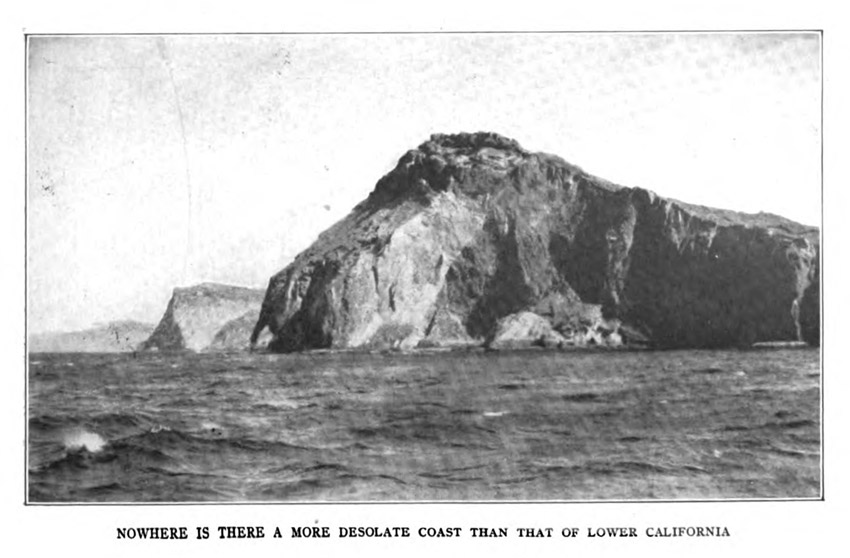
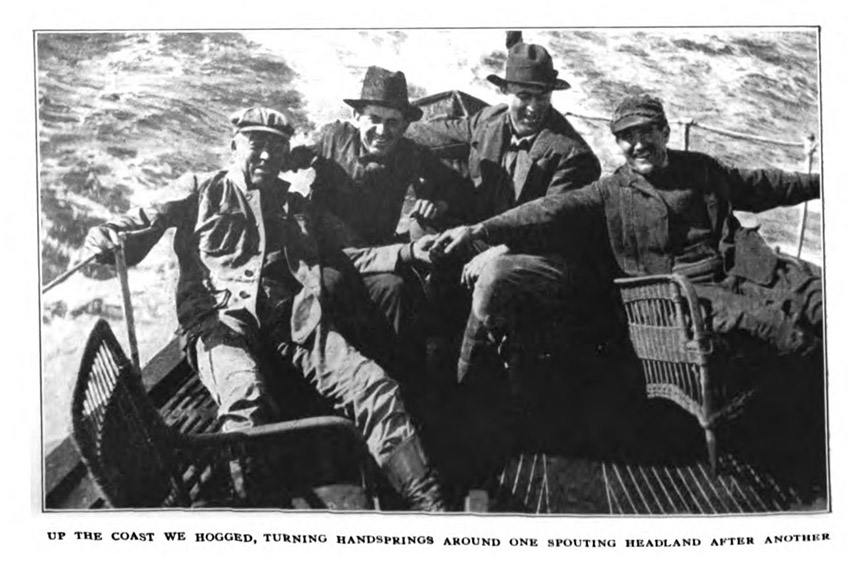
These Yaquis are a playful people, and they dearly love to hold up the Southern Pacific trains. That is one of their favorite sports and pastimes. The tribe has been at war for going on forty years, and it is not so numerous as it once was; naturally, therefore, it would work a hardship upon the survivors to run more trains than they can handle. Nor can a Yaqui do well without his accustomed sleep, so the trains were run only by day and laid up at night.
Let me not imply that two generations of habitual warfare with the Mexican government has resulted in reducing the strength of the tribe to any serious extent. Not so. There have been deaths among the Yaquis, to be sure—deaths from accident, old age, exposure, and general wear and tear. Probably, too, there has been a lot of acute indigestion and ptomaine poisoning, for one could hardly expect a party of Yaquis who had suddenly fallen heir to a whole trainload of canned goods to curb their appetites, especially when flushed and glowing from the exercise of chasing the train crew up the track or when weary from the butchering of passengers. Nothing induces such a healthy hunger as vigorous work in the open, and the fine, dry air of Sonora is in itself a tonic.
Outside of such fatalities as these, however, I could learn of little that had occurred to decimate the ranks of these warriors. Life for them appears to be an ideal arrangement, for when they tire of bloodshed, or become financially straitened, or wear out the rifling in their gun barrels, they may either join their peaceful brethren in the Mexican towns, there to rest, pitch quoits, and play cowboy pool until the call of the wild again summons them to the glad, free, careless life of the hills, or they may ride boldly north across the border, singing their folk songs and shooting at signboards, there to mingle with their Arizona brethren and to enjoy, so long as suits them, the blessings of Uncle Sam’s peace, protection, and religious training.
At Nogales, we obtained a wholly false idea of our international boundary. At that point, it is marked by a high, barbed-wire fence which separates the American from the Mexican town and runs up over the hills and out of sight. That fence gave us a feeling of territorial inviolability until we learned that a short distance beyond the suburbs it peters out. Without doubt, that bristling barbed wire serves a purpose; it is a real hindrance to the free passage back and forth across the border of Yaqui war parties, bandits, smugglers and the like, and makes necessary a detour of several miles. The going through the cactus is not very good, but frequent usage is vastly improving it. Why the Yaqui Chamber of Commerce does not affiliate with some of the prominent Mexican bandit marching clubs and lay a good macadam road around the end of the fence, I don’t know.
Seriously, the Yaqui situation in Sonora is amazing to anyone who is not used to it, and brings home a vivid realization of the narrow line dividing social and political order from chaos.
As one rushes through the Yaqui country at an average rate of nearly eighteen miles an hour, the effects of political ferment and social upheaval are apparent. We were looking into the latent opportunities of Mexico, and we found practically all industry in Sonora paralyzed by the conditions that exist there. It is a state rich in resources; not long ago its plains were alive with cattle, its valleys were occupied by ranches, its mines were yielding work and profit to many. To-day, one travels miles without seeing a herd of stock; vast reaches that were under ditch have grown up to brush; and mining, for the most part, is carried on in a desultory, furtive sort of way. On our train were a number of Americans with property interests on this coast. They were considerably discouraged, decidedly resentful, and a bit bewildered.
“We don’t know where we stand,” one of them told me. “We’re neither Mexicans nor Americans. Under the terms of the new Mexican Constitution, we foreigners can’t take title to lands situated within the frontier and coastal zones, and only by waiver of citizenship may we acquire property in the interior. It comes hard to renounce one’s citizenship, and yet our own government treats us like outlaws.
“This west coast is wonderful. We came here in time of peace, put in our labor and money, brought our families—it was our promised land. Then came the revolution and most of us had to get out with whatever we could lay our hands on. Some few Americans stuck and got through, but the rest of us are just beginning to come back. We don’t know how long we’ll be allowed to stay, and the uncertainty, the insecurity, is getting on our nerves. Those of us farther south are doing fairly well at present, but here in Sonora, of course, the Indians are in charge.”
“How many Yaquis are there?” I inquired.
“Probably not more than a thousand bad ones.”
“And they have paralyzed the entire state?” I was indeed amazed.
“The greater part of it. The government could clean them up in no time if it cared to, but it doesn’t. Why, if a Yaqui should run a nail in his foot, the local military commander would send regrets and hang crape on the barracks door. You see, without Yaquis there would be no soldiers; no soldiers, no generals; no generals, no graft. It’s a poor sort of war, but it is steady, and it pays the same wages as a good war. The situation works out about like this: When things get too quiet, the soldiers round up the peaceful Yaquis in some town, deport part of them, or possibly shoot a few. Naturally the ‘bronchos’ hear about it and retaliate by raiding a ranch or holding up a train, whereupon there is great excitement and a new campaign is started. It’s tough on ranchers and travelers, but it keeps the soldiers out in the open air. Yonder, by the way, is an American who went through the last outrage. He can tell you quite a story.”
The man indicated was not averse to talking, but the longer he discoursed upon the Yaqui subject, the more I realized that we had erred in coming to Guaymas by rail instead of by water. No matter how rough the Pacific and how wet a three-room yacht with kitchenette, neither could be as messy as a massacre.
“They killed about forty passengers that day,” my new acquaintance told me. “First they robbed us; then they stripped us of our clothes. They were taking me out to line me up with some others to be shot, but I jumped off the wrong side of the platform and made a dash for the brush. There was a lot of confusion and excitement, and I managed to keep hid out until they had cleaned up the train and ridden off. Then I climbed into the mail car and got something to cover my nakedness. I came into Empalme that night wearing a pair of socks and two mail sacks— one for a shirt and the other for a pair of kilts. Two Americans with me were killed—one of them while he lay wounded and begging for mercy. One woman managed to save herself by feigning death. The man seated next to her was killed at the first volley, but she dipped her hand in his blood and smeared herself with it. They stripped her dress off her without discovering the ruse.”
“What has been done about it?”
“ ‘Done’?” My informant was puzzled. “Oh, there was considerable excitement, and the troops went out for a while—”
“Didn’t our government take any action?” I ventured to inquire.
“Quit your kidding. This is Mexico, not Europe. That sort of thing has been going on down here for years. Those are the chances we have to take, the price we Americans pay for trying to make a living outside our own border.”
The so-called “danger zone” began at Torres and extended south to the Yaqui River. At the former point, our train took on two armored cars, equipped with machine guns and a crew of soldiers clad in pajamas. Behind a freight train, which acted as pilot, we continued our journey, beguiled, meanwhile, by stories of bloodcurdling atrocities calculated to put us fully at our ease.
But it turned out to be a dull trip, and we encountered nothing more dangerous than the native cooking which lay in wait at every stop. The country was inert, dead, but the inhabitants of the scattered villages appeared content despite their poor circumstances and obvious idleness. The countrymen and the boys were as dirty as one would expect in the midst of such poverty, but the women were surprisingly clean—a condition that we could not account for until we reasoned that they perform the homely household duties. The explanation is simple: they cannot roll tortillas on their naked knees and mix white flour into sticky pastries without losing some of the—let us say local color which renders them so picturesque.
In Guaymas, one got an impressive idea of Mexico’s present state. Here, as elsewhere, one encountered the trail of destruction left by the serpent of social unrest. For example, let me quote from a prospectus issued by a large land-development company operating near that city—true words when they were written not very long ago:
Mexico offers to the settler a delightful climate, fertile farms, none better in the world; a rapidly developing country where energy and ability reap their just reward; perfect security for person and property; transportation facilities of the first order. The titles to all land in the valley (Yaqui) are dear, and there have never been any lawsuits in connection therewith. The form and process of transfer of real estate in Mexico are much the same as in the United States. Small thievery is unknown—property interests are safe. Mexican taxes are never excessive. Mexican laws are just and equal, and are much better administered than in the United States.
Aside from the kind words about climate, the above statements make humorous reading these days, and therein lies the appalling lesson.
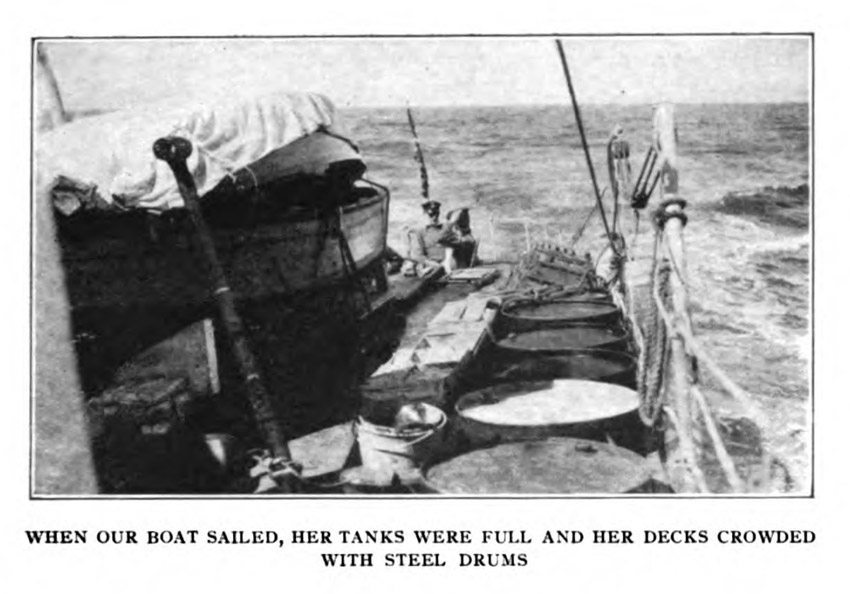
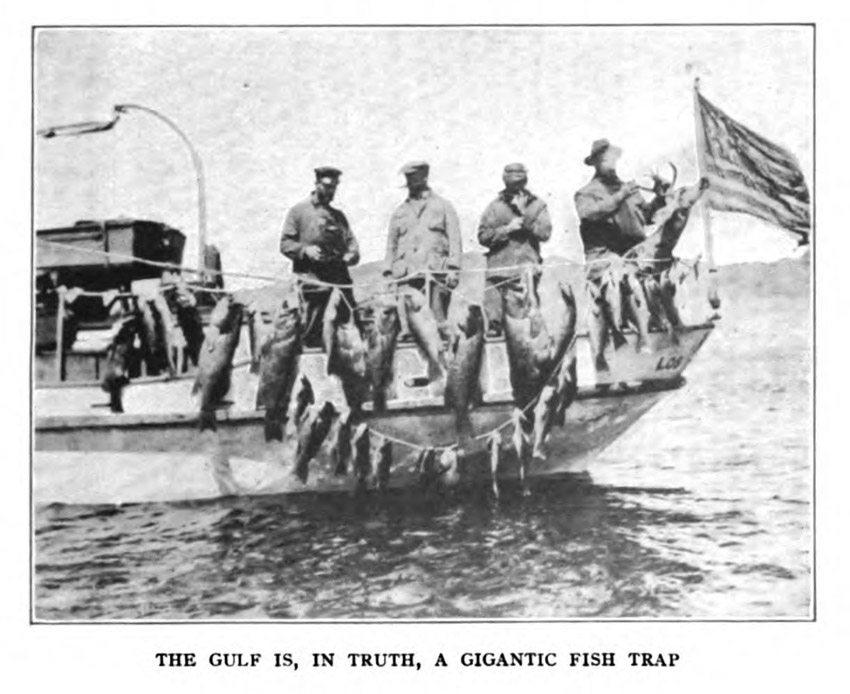
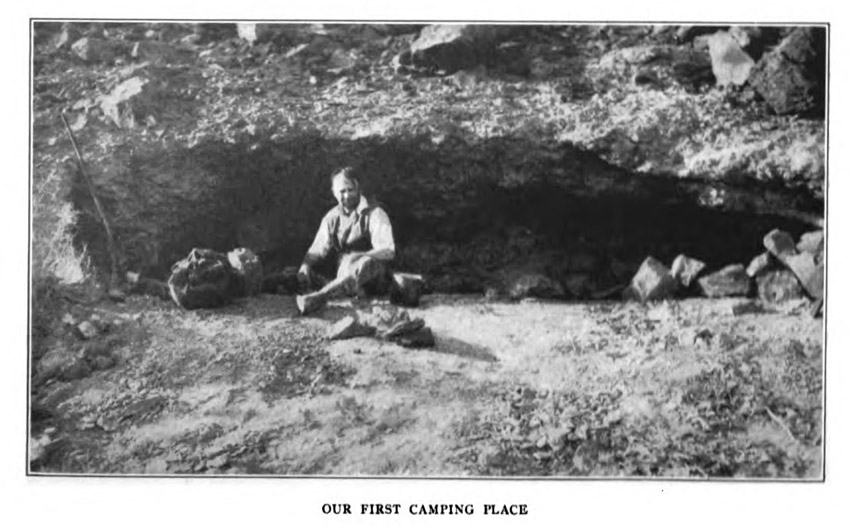
With the world on short rations, and the price of foodstuffs, even here in the United States, up to a mining-camp level, no region offers a greater example of wasted opportunity, of criminal extravagance, than this west coast of Mexico.
A marvelous climate, abundant water, a soil bursting with every growing thing, accessibility to the world’s markets, ample labor—all this the west coast has, and yet, for the most part, it lies fallow, weed-grown, with its farms deserted and its ditches caving in. Carranza said, “These foreigners must quit making money out of Mexico,” and that state of affairs has come to pass. But the Mexicans, too, have quit making money out of Mexico, for they have not the means with which to reap their own blessings. Nor, at this writing, are conditions improving to any visible extent, and so, while war-shocked peoples are bending to the task of increasing the earth’s productivity, one of the very richest of its gardens lies idle.
Guaymas was a busy town of fifteen thousand inhabitants before Madero’s day; its shops were stocked; its harbor was filled with ships from every land; trains were rolling northward heavy with freight; a boom had struck the west coast. Lands were being colonized; irrigation ditches were building; ranches were growing; mines were opening. To-day, Guaymas is one third its former size, its shops are empty, and its harbor is the same. Many of its prominent citizens are in exile; three trains a week serve the whole west coast. Even religion has been done away with and the churches are closed.
A citizen of Guaymas, a Mexican gentleman of education, of force, and of surprising energy, pointed out to me the hazy hills across the bay and said:
“Yonder I have thousands of acres of the richest land in the world, and although I can feast my eyes on it from here, I can’t get close enough to work it. Over beyond those mountains I have a big stock ranch that I haven’t seen for years. Fifteen thousand head of my cattle were run off or were slaughtered for their hides, and their carcasses left to rot. It is much the same elsewhere, and there are many others like me. We need your money and your help to bring Mexico back where she was.”
This man’s plight was due to local conditions—to those marauding redskins; but farther south, outside the Yaqui belt, affairs were in little better stead. Banditry in this state, loose government in that; a Bolshevist land policy resulting in idleness, chaos, graft; a general scarcity of capital, and, above all, a paralyzing sense of uncertainty as to what will happen next—that was the impression a casual visitor gained of the west coast, and it was the part of Mexico least ravaged by strife, most blessed with peace and security.
I do not pretend to speak with authority on the internal affairs of Mexico. It is a large subject, and too many men have pretended to understand it. But there are questions so plain, problems so elemental, that even a thirty-two-caliber brain can grasp them.
How can that country get back on her feet, the way she is going? Whence is to come the help she needs if she continues to antagonize those willing to assist her? How can we prove to her that we are not her enemies? How long will a world clamorous for peace, hungry for food, bankrupt of raw materials, permit one of its richest sections to be trod under the feet of rioters?
Self-determination of peoples, racial integrity, experiments in the various forms and theories of government—all these we Yankees are pledged to respect—and it is our wish to respect them. But nature demands an equilibrium. Chaos cannot continue to exist alongside of order. One part of the world will not long consent to go hungry the while another part fails to till its fields or refuses to sell its crops. One of the first tasks ahead of our statesmen, it seems to me, should be an earnest, honest effort to aid Mexico to find herself. If ever we can be brought to enunciate and adhere to a definite foreign policy, I believe we can make friends once more with the Mexicans and renew the neighborly relations that formerly existed, for the substantial, thinking men of that country are awake to the perils of present tendencies and would welcome our co-operation.
But to go on with this story, such as it is. The Par was several days late in arriving, and about the time we had given her up she crept into port and, with a weak bleat of relief from her police whistle, dropped anchor. Then out of her swarmed a bunch of bewhiskered beach combers, who fell to reviling the boat, the weather, the life of a yachtsman, and one another.
“She stood on her head all the way down the outside and on her tail all the way up the gulf,” Salisbury wailed. “She’s not a sub chaser; she’s a retriever. We’ve been up for air just three times on the whole jaunt, and the compass is out anywhere from twelve to eighty degrees. I had to take her by the horns and lead her from one landmark to another.”
“Had to pull down the engine and rebuild it in the middle of a storm,” some one said. It was Bill speaking, as we discovered when we took some sail cloth and paint remover and rubbed away part of his grime. “ ‘Come along for the rest,’ ” he quoted, hollowly, then gave a mirthless laugh. “Say! How do the trains run out of here?”
That was Bill’s last burst of merriment; thereafter he avoided speech or contact with the rest of us. He came up on deck every few days, to be sure, and stood out on the back porch of the Par, doubtless meditating mutinously upon the life of ease he had led in the depths of a destroyer, but whenever we discovered him so engaged we drove him back into the engine room.
Another tragedy had marred the southward trip. “Carrots,” it seemed, could not cook. Not even in the slightest could he cook. He had practiced a deep deception upon us—and he took no shame in it. On the contrary, he derived a selfish pleasure therefrom.
“This trip has saved me a lot of money,” he declared, gratefully, “and I’m glad I came. I was thinking about buying a yacht some day. Now I don’t want one.”
“We’ve got to hire a new galley slave,” Crisp declared. “Eddie can’t do everything.”
Eddie appeared at that moment, as smiling and as cheerful as ever. He was dressed in his other overalls and was going ashore to mingle with the youth and beauty of the town. Gradually it dawned upon me why everybody looked drawn and haggard—these men had completely exhausted themselves by their efforts at evading toil, and what few hours they had snatched for sleep had been troubled by the colored boy as he came and went about their tasks.
The state of Sonora is dry, and the evils of unrestrained prohibition were forcibly brought home to us while we were loading gasoline. The Mexican boatman whom we engaged to refill our tanks espied a demijohn upon the deck and, profiting by our inattention, undertook to quench a thirst of several years’ standing. He seized that jug and quaffed deeply, without so much as a Spanish, “Here’s how!” But his haste betrayed him, for the demijohn contained formaldehyde. We used everything on that bargeman from white of egg to the gasoline pump, but his stomach was weak and would retain neither. Whatever happens, that Mexican will never be haunted by moths, and he should keep indefinitely in any climate. As soon as he said he was better, we went away from there, fearing that he might recover sufficiently to call for the police.
We had in mind a mineral deposit across the gulf, so thither we betook ourselves, hanging like gorillas to such hooks and bolts and projections inside the yacht as had not been pulled off on the way down. It was an all-night run through a cross sea, but, despite our crazy compass, Salisbury hit our destination smack in the eye, and we hurriedly got out our fishing tackle to commence prospecting.
Fishermen thrive upon disappointments. A sportsman will travel thousands of miles to reach ideal fishing or hunting grounds; then the better the sport the fewer his thrills, and the sooner he tires of it. Some of my best trips have resulted in the least game, and so with this Mexican expedition. Not that we didn’t catch fish—we caught too many. That was our trouble; we soon found there was no dramatic suspense to the procedure. Wherever there was a rocky shore, there the best fish families of the neighborhood were lined up, waiting for us. A rusty spoon was as tasty to their palates as a brand-new nickel-plated striker or a hand-painted minnow designed to melt in the gills.
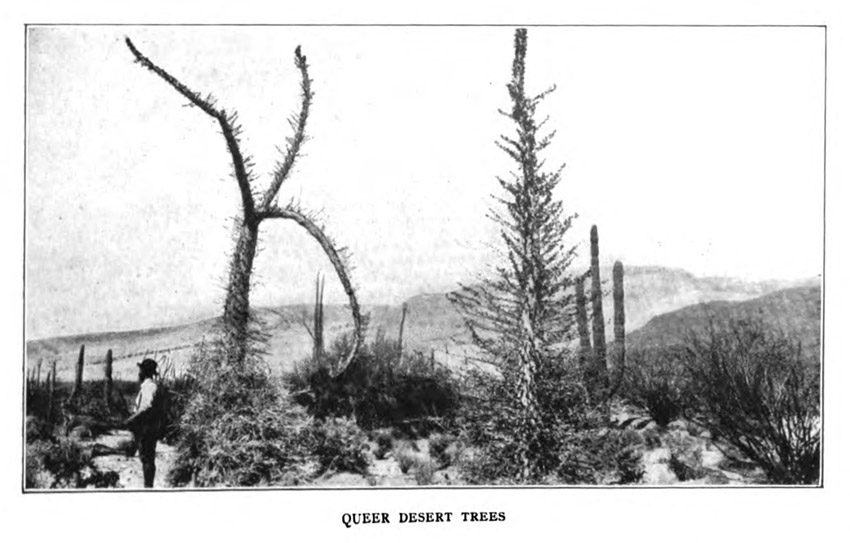
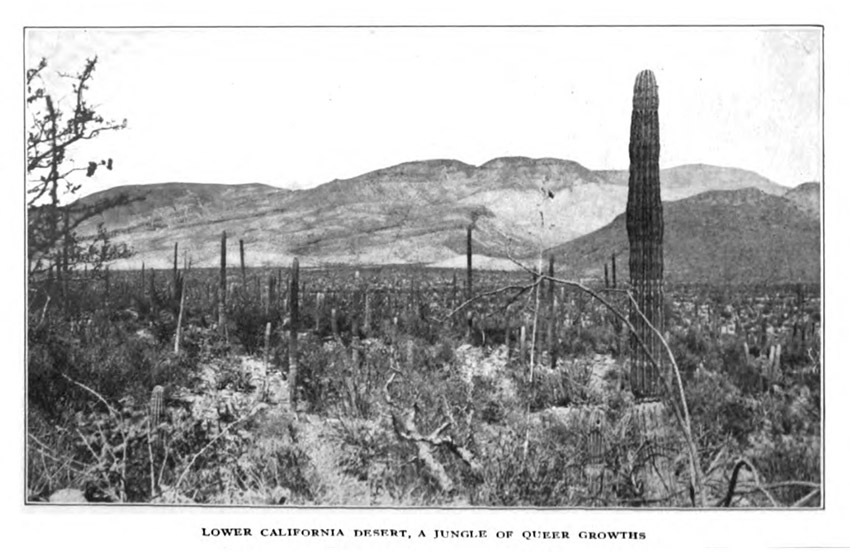
It was March; the water was cold; hence not all of the usual varieties were present, and we caught mainly cabrilla—a sort of rock cod that attains any size which happens to suit it. The gulf is, in truth, a gigantic fish trap, so placed as to pocket every kind of marine life that works up the coast, and, outside of salmon streams, I have never seen waters with more fish in them or a region better suited for fishing on a commercial scale. Practically all varieties are edible, and the supply is inexhaustible, but nothing is being done to exploit it, and any ambitious effort to do so, under present conditions, would almost certainly result in failure. Not even Mexico’s citizens dare risk any considerable investment of money or effort, and of course foreign capital is not welcome.
Nowhere is there a more desolate coast than that of Lower California, that narrow seven-hundred-mile Mexican tongue of land that extends southward from our California border. Naked headlands rise sheer from the sea; the country behind is a crumpled, waterless wilderness, hard-baked, thirsty, forbidding. But there is a lure about it.
We ran north up the gulf, closely skirting the shore, and every foam-girdled reef or frowning island challenged us, every bay invited us to tarry awhile and to explore, every winding valley was a road to adventure. Somewhere back in those arid regions, rumor had it, were old roads and crumbling ruins, a tribe of big, blond, blue-eyed people, descended from a shipwrecked crew, the women of which stood six feet high. On Angel de la Guardia Island were pieces of a high-perched, stone-paved highway, such as the Romans built, and a mythical city of round rock houses. In Guaymas, we had met an American who told us confidentially of finding an ancient Spanish mission in the dust of which lay a gigantic bell of solid silver. He was even then on his way out to get an acetylene torch with which to cut it into ingots. And there were the wild men of Tiburon beckoning to us. Oh, the salt was in our nostrils and we had never been anything except buccaneers!
We pulled into a curving beach where the book told us there was a fresh-water lagoon, wild game, and sea fowl. While Elmer got out his stoutest tackle, praying that it would soon be broken, the rest of us went ashore with our guns. The lagoon was there, and dusk found us crouching behind improvised blinds on its edge.
First came the plover and the curlew, mewing mournfully, and we limbered up on them; then, as the sun hid behind the peaks, the ducks began to bore in. They came like bullets—widgeon, gadwall, bluebill, sprig—and the darker it grew the swifter they came, rocketing out of the gloom until we were snap-shooting at blurs against a dying sky and marking the dead birds by the splash. At our backs the sea whispered lazily; now and then, through the straining silence, came the sound of whales blowing—a vast, hollow, whistling echo, like the exhaust of some slow-turning engine more mighty than man had ever dreamed of. Believe me, it was some evening.
March is stormy on the gulf. The winds pour down its seven-hundred-mile length as if they had nothing else to do, and a small boat needs skillful handling. We were in a bad anchorage, and before morning we were driven out. Up the coast we hogged, turning handsprings around one spouting headland after another in search of a hiding place. We nosed in finally under the partial shelter of a bold cape, but inasmuch as the Par was rolling drunkenly in the ground swell, we spilled ourselves ashore and went looking for antelope.
I have never bagged an antelope, but I am told they can be coaxed within range by the waving of a red handkerchief. I do not affect red handkerchiefs, but inasmuch as Eddie had been too busy to shave the members of our party, Carrots had sprung a beard of most extraordinary hue; so I took him with me, it being my idea, upon locating a band of pronghorns, to lie down at ease in the shade and have Carrots show his head above the brush and comb his vermilion whiskers. We had no opportunity of trying this artifice, but I pass on the idea for what it is worth.
Los Angeles Bay, halfway up the inner coast of the peninsula, was a welcome refuge from that angry norther, and thither we crept, keeping our eyes open, en route, for some oil seepages that Salisbury had in mind. We found them, and we would have landed in better weather, for undoubtedly petroleum was bubbling up into the sea. We saw enough to stimulate our active curiosity and to make us think that some day this region will witness boring activities, but actual exploration was out of the question.
Overboard went the skiff and the speed boat when we finally came to anchor, and we landed to arrange a trip into the mountains for big-horn sheep. The population of Los Angeles Bay consists of two families, and their houses nestle close to a spring that supplies the only drinking water within many miles. Both families are always out of provisions. Señor McDonough is the leading citizen, but he doesn’t pronounce it that way. He is a real Mexican, and he calls himself “Maddone.”
Maddone was away, but the other half of the adult male population trooped down to the beach, and to him we made known our desires. We needed burros to convey us into the local Alps, and we were in a hurry to get them. He agreed that time was the essence of this undertaking, and promised to hasten forthwith, or even sooner, to the vague rancho of a vaguer friend, where there were beasts of burden by the thousand, or, at least, by the hundred. To be conservative, there were not less than a dozen. Anyhow, he was a man of energy; delay irked him, and he rested only in vigorous action. His sandals were winged; he chafed to be gone—but, first, a few hasty details were to be arranged.
For one thing, he must partake of his comida—possibly we could speed the moment of his departure by lending him some coffee and flour and sugar and fish lines and clothing? Any contribution, in fact, from a case of Rhine wine to a Norfolk suit would be gratefully acknowledged and receive a good home. He was particularly in need of a phonograph and some new records. However, that was up to us; as for him, he would snatch a small bite and then be off at amazing speed. We would probably kill more mountain sheep than any like number of white men, and we were such nice, generous people that undoubtedly their horns would be tremendous. He anticipated a wonderful outing, and God had sent us at the precise moment when his family was out of coffee, lard, frijoles, cigars—
We loaded him down, urged him to grab a cold snack and dash away. He promised. This was at noon. The slow-sinking sun had hidden her face before he divorced himself from the shade of his cabin. It was still too hot to travel, he assured us, but, once the cool of evening had fully settled, then indeed we would be astounded at his pep. The miles were as inches to him; perspiration streamed from his pores in torrents. Quick action, promptitude, reliability—those were his middle names. Prepare to receive him at dawn.
Elmer had gone out in the skiff with Eddie, but when darkness fell and there was no sign of them, we hung out the lights and blew the fog horn. It had turned dead calm; the bay was like a sheet of metal, and the towering mountains that ringed it about dwarfed it to the size of a pond. Now, my brother takes his fishing seriously; he has played tarpon on light tackle until they fainted from lack of sleep, or until acute and malignant anæmia rendered them nerveless. Nevertheless, I knew Eddie to be a grossly material young colored boy addicted to growing pains and recurrent pangs of hunger, so, as the evening wore on and our signals brought no answer, we became concerned. This calm could not last long; there are heavy tide-rips and hidden rocks along this coast, and even a moderate breeze in a bay this size would raise a sea too heavy for a tiny skiff with a four-inch freeboard. I remembered capsizing a boat once in an effort to land a big fish; these waters were deep and cold; the desolation of the place was oppressive.
We finally hooked up a headlight and an armful of dry batteries; then Wilson and I set out in the launch. This was the first day the little speed boat had been in the water; she spat and shuddered at the taste of our Mexican gasoline, but finally she began to plane, and we skimmed off into the darkness, swinging the light in circles. We ran blindly, of course, for we had not the slightest idea in which direction the skiff had gone.
After a few miles we shut off and yelled, but there was not even an echo. That silence simply swallowed our shouts. We repeated this performance several times; then we broke down.

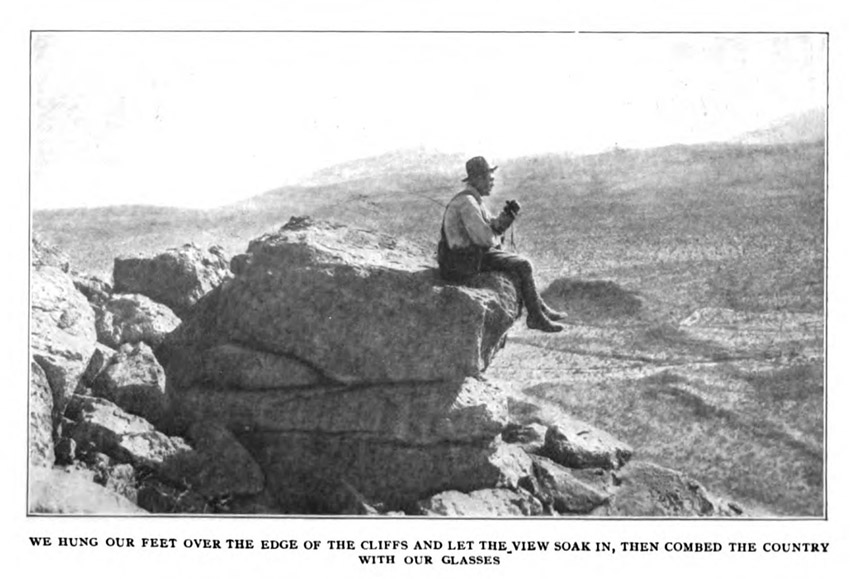
All speed boats break down when most needed—the speedier they are the more complete the collapse. I have owned several, and to me their habits are so well known that I am never surprised, never resentful. I endure their behavior with Christian fortitude, expect the worst, and am seldom disappointed. The finest and the most expensive speed boat I owned I sold to the government for one dollar, to me in hand paid, receipt whereof is hereby gratefully acknowledged. Some war-time necessity made the transaction possible, but, in view of the small amount of money involved, the government insisted upon regarding that beautiful mahogany-and-brass extravagance as a gift. I did not. I preferred to look upon it as an outright sale at a satisfactory price. Not long ago, I heard the disquieting rumor that naval craft presented to the government during the war are to be returned to the donors. For fear it might be true I sold my country place at a loss and moved away from where I then lived—I moved inland. Until I learn definitely that the navy intends to keep that boat I purpose changing my address without notice and as often as necessary.
But the middle of Los Angeles Bay in the middle of the night is one of the lonesomest places I ever broke down in. I cared even less for it when I discovered that our only tools were a monkey wrench, an oar, two pocket knives, and a pipe cleaner. However, Doc was optimistic; he declared that one monkey wrench was as good as two, and we had twice as many knives as we could possibly use. He said it was nothing but a broken shaft coupling, and he could fix it in no time if he had the boat in his shop. Anyhow, she stepped some—didn’t she?—as long as the thing held out.
It was very cold out there and I was wearing a hen-skin suit; a school of whales were playing near by, and the hollow sound of their tremendous blowings emphasized the general lack of coziness.
Eventually we got the coupling to hold and ran on to the scowling shore opposite. Along this we cruised until we had no more than enough gasoline for the return trip. Back we skimmed, trying to reassure ourselves that the missing men would be waiting for us at the Par.
It was nearly midnight when we picked up the dull spark of the yacht’s light. As we swept up to it, we shouted:
“Have they come in?”
“Not yet,” somebody answered.
Under the circumstances, we dared not risk moving the Par; so there was nothing left for us to do except replenish our supply of gasoline, change into warmer clothes, and spend the night in a blind search. Nobody had much to say.
We were ready to set out again when somebody cried:
“Hark!”
For some time we could hear nothing; there was not a breath stirring; the desert shore was as mute as the motionless bay. Then we fancied we heard what might be the thump of oarlocks. We yelled in chorus. After a long wait there came back a faint, whispered, “Halloa!” and we relieved ourselves with the profanities that befit an occasion of this sort.
Elmer and Eddie had run out to the harbor entrance—in this timberless country of high headlands distances are amazingly foreshortened—and had given the cabrilla a bad half hour or so, when, in the midst of the fun, the kicker gave a few despairing coughs, its tongue dropped back, and it died in their arms. They had selected the wrong mountain for a landmark and had been rowing since mid-afternoon. They didn’t mind that so much; what made them sore was for us to have moved the yacht, blown out all her lights, and conversed in whispers. Humor was all right in its place, but if we thought that was funny, we were crazy. Meanwhile, for the love of Heaven, wouldn’t somebody suggest a bite to eat?
“Better get some sleep,” Salisbury warned the rest of us, “for that winged Mexican will be back at daylight with his panting burros, and it’s a long hike up to the sheep country.”
That Mexican bore the name of Macario, which we fatuously believed to be the Spanish equivalent of Mercury, but there was a catch in it somewhere. Through a long forenoon we fried ourselves on a hot deck and waited for him. During the cool of the previous evening the mountains back of the bay had looked invitingly near and not too high, but in the pitiless heat of that glaring forenoon they retreated and reared themselves skyward to such an extent that Salisbury conceived a brilliant idea. Why not split the party, leave some here to try for sheep, while the others ran up the coast seventy-five miles to another bay where the chart indicated that the hills had been stunted in their early years? Up there were both sheep and antelope in abundance. Salisbury was sure of it.
Now, I hate brilliant ideas; I detest people who have them. Having been on other trips with Ed, I know him for what he is—a windlass hunter. He wears out an anchor hoisting it before it has hit bottom; so, therefore, I declared I was cut to measure for the spot I was then in, and Wilson took the same stand.
When we voiced our intention of taking Eddie along as interpreter, Ed fought as a lioness fights for her cub, but we prevailed. We threw some grub together, went ashore, and the yacht sailed north.
Up at Macario’s house were two somnolent burros, also some native-made aparejos, rawhide rope, and the like. Upon one animal we lashed our food and bedding; upon the other we loaded a cylindrical steel tank containing enough water for several days.
It sounds easy to tie one hundred and fifty pounds of water upon the spine of a docile burro, even without the aid of a pack saddle. So it is. But to tie it there without even driving a nail into the animal or screwing in a few clothes hooks, and have it remain tied after the burro moves—that is another matter. There are probably half a dozen simple, easy cowboy “hitches” that will do the trick; they are simple, that is, if one carries a cowboy in one’s baggage, but to the inept they are as mysterious, as elusive as the Aurora Borealis.
We rubbed practically all the plush off the abdomen of that quadruped; we pulled and hauled until we wore his tread clear down to the fabric. We wrapped him round and round with rawhide rope and pieces of string and galluses and bale wire; then we cross-hauled and cinched him up until he bulged dangerously at both ends. But he could teach tricks to Houdini the Handcuff King. Before he had walked a quarter of a mile he had loosened our knots and the steel cylinder had slipped until he carried it as a kangaroo carries its young. By the time we had unlashed and reloaded it, we were so thirsty that we had to uncork the tank and drink. It became a nice problem whether we would get out of sight of the spring before our water was exhausted. Finally, we invented a hitch of our own, braced ourselves, and heaved in on the corset strings of that burro until he was a perfect thirty-six. We all but vivisected him, but, believe me, we anchored that tank. He would have worn it to his grave.
It was well on toward evening when we met Macario and eight dust-coated desert mocking-birds straggling through the cactus. With them was a lean six-foot Maduro brigand, wearing the mustache of a walrus and the name of Angel. At sight of our pack animals, his and Macario’s eyes protruded like those of our unhappy water carrier; with exclamations of wonderment and admiration they unwrapped the animal as if he were a broken leg and gently massaged his vital organs back into place. Then they showed us how they could secure a steel tank in place with a couple of simple turns.
They had brought with them a collection of antique saddles, or the skeletons thereof, and, selecting the stoutest animal in the group, they indicated that I was to climb into the middle of him. For a six-foot man to get on a burro is about as perilous as mounting a sawbuck; it strains nothing but the rider’s self-respect. I like burros; I had vowed that I would rather walk across the peninsula than inflict my avoirdupois upon a brute too small to carry a tune, but after ten miles afoot in that desert I would have sat on a ground-squirrel. However, my relief was short-lived. My steed creaked in every joint; he sighed mournfully; then he lay down, leaving me standing astride of him like the Colossus of Rhodes. I coaxed him to rise, mounted again; and again he abased himself in an attitude of prayer. We repeated this performance several times, but the oftener he rehearsed the more perfect he became; so I shifted to a lop-eared old goat as dusty as a Pullman seat. The joints of this burro were too stiff to bend, and so, eventually, we went away from there, riding with our knees under our chins so that our feet would not drag.
Evening brought a sunset such as I have never seen. Masses of storm clouds had piled over the ragged Cordillera, and the dying sun beyond ignited them. The fire spread until the heavens were gloriously ablaze. The heat of the day had diminished, and twilight softened, beautified the harsh, hateful outlines of the desert; the place became peopled with shapes and shadows; it throbbed with mystery and suggestion. The storm came eventually—a cataclysmic war on high, resulting in a Mexican cloudburst. Six drops of rain fell; then the moon broke through.
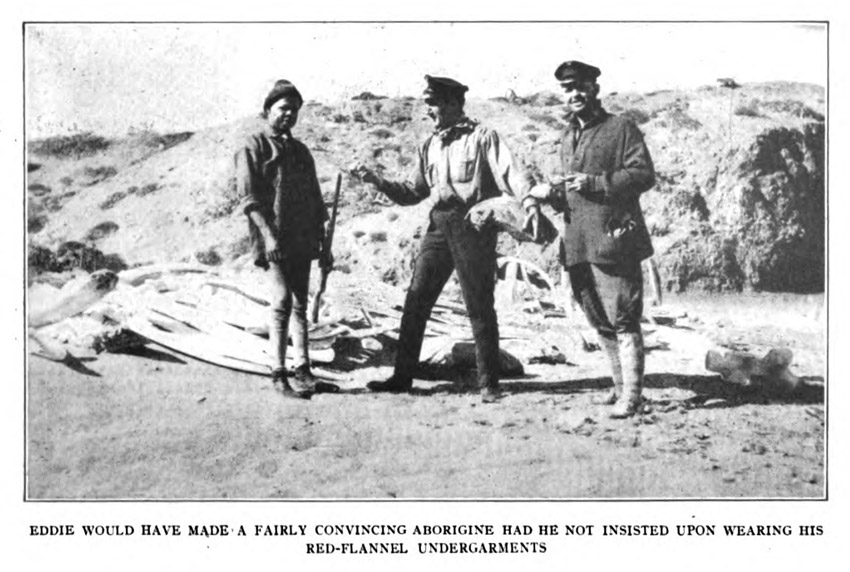
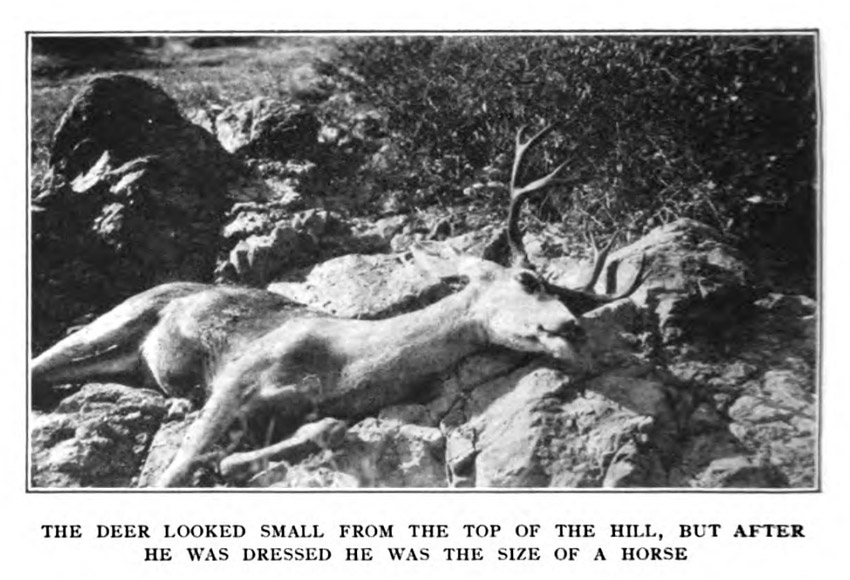
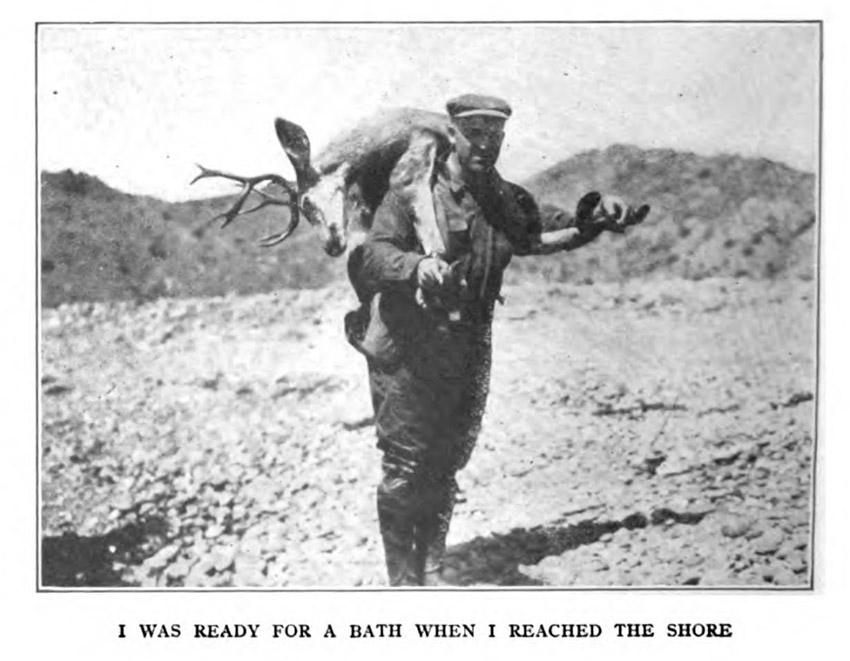
Steadily, silently we rode; we were tired, hungry. The occasional flare of a match beneath wide straw sombreros illumined the lean, swarthy faces of our guides. Up a long hogback we went, alongside a deep gorge, then into a black cañon, the perpendicular walls of which crowded so close that we could touch them on either side. Out of this and into another valley. It was a relief to slip off of those desert Fords and plod through the ankle-deep sand. Macario had armed himself with a stick, and with it he beat clouds of choking dust from the laggard animals; but they appeared to enjoy it. Whenever one found a dead bush, particularly dry and brittle, he ate it with meditative relish, the while Macario yelled hoarse profanities and dislocated his shoulders by flailing the nearest portion of the burro’s anatomy.
The vegetation had changed here. The desert was forested with twisted growths, doubly distorted by the moon. Leafless trunks towered on every hand like the stubs left in the track of a forest fire.
About midnight we drew up to the foot of a barren ridge and crept into a tiny cavern, perhaps three feet high at the entrance and five feet deep. Amid sighs and groans, we fitted the mellow portions of our bodies over the protuberances in the rocky floor and turned our backs to the cold wind. We were dry and dusty; our skins cracked; we grated when we rubbed; there was sand in our garments and grit in our teeth, but Angel had seen a flock of sheep crossing the valley at this place not a week before, and we were content.
“That gang on the boat will be sore when we come back all worn out with sheep,” Wilson chattered.
“Sure! When you go for game, you have to work for it,” I agreed.
I snuggled closer to Wilson, and thereby crowded him farther out into the arctic night wind. Our cave was moulting. At our every move, the low roof showered us with dirt; but we spat it out and agreed that sheep hunting in this country was almost too enjoyable to be interesting.
There was a meeting of the Coyote Choral Club about daylight; so we got up, not greatly fatigued by our night’s rest, and were away at sunup. Although we saw no sheep, it turned out to be a most interesting day, for our surroundings were unreal, and climate, geology, vegetation were such as to shatter our preconceived notions of deserts. To begin with, this waterless region rustled with bird and animal life—quail, doves, rabbits, coyotes. Deer were plentiful, and there were antelope, too. The soil was a wavering network of various sorts of tracks. The born hunter derives more enjoyment from a new country, from the observation and study of animal habits, than from the chase itself. If he be a naturalist at heart, thirst, fatigue, blistered feet become pleasures.
Most amazing of all was the vegetation. Our way led us through a veritable jungle, sprung from a soil as dry as gunpowder. Every plant, every bush, every trunk bristled with thorns and spikes and hooks and daggers—why, I don’t know, for nobody could possibly want to do them violence. There were high trees shaped like huge, elongated pineapples, which bore foolish finger-length branches and leaves smaller than clover; others that writhed and twisted spirally or had lop ears and elephants’ trunks; cacti from the size of sea anemones up to giant Jewish candlesticks with forty-foot branches; trees that sat on top of the ground like gourds, or squatted on flat rocks and dropped legs down into the sand; century plants with hothouse blooms held high on military lances; fragrant herbs that Angel told us were food and medicine. It was a wonderland of curiosities and contradictions. For instance, I cut a branch for a staff, but it ran blood all over my hands. I cut another, and it exuded milk. The third gave forth honey instead of sap.
With sweat pouring from us, now that the sun was back on the job, we toiled up a four-thousand-foot spur of the main range. Near the top we ran upon a sloping meadow, a lush and lovely beauty spot, carpeted with strange red and blue and yellow flowers, the perfume of which was heavenly.
Sheep “signs” were plentiful all up and down the ridge; we hung our feet over the edge of the cliffs and let the view soak in, then combed the country with our glasses.
Near by, we came upon a city of cave dwellings in very good repair. The whole face of a long bluff was perforated with entrances, lending it a Swiss-cheese effect, and opening from the main chambers, in some instances, were smaller compartments which had doubtless served the original homesteaders as china cabinets, coat closets, and butlers’ pantries. Nature had fashioned the caves, but the living-room ceilings had been done over; they were crudely smoothed off as if by bone instruments—perhaps the heads of the short-waisted inhabitants. So I deemed likely when I stood up in one.
Not all the isthmus of Lower California is a desert such as we were in. Far from it. Much of the land on the Pacific side, and especially that in the northerly section, is like that of our southern California, and with development would rival in richness the vaunted habitat of the Native Son. Its isolation from the mother country—the long, narrow gulf completely separating the two—has resulted in a peculiar state of political affairs; it is to all intents and purposes independent. Cantu, the present governor, is a forceful, energetic person. He is popular, and he maintains a considerable army upon steady pay. He and his party, if there is such a thing, make their own laws, levy and collect their own taxes, and thumb their noses at the Carranza government, daring them to do something about it. Since Mexico lacks a navy, and it is a long, dry walk around the head of the gulf, the bluff holds.
Governor Cantu is generally liked by Americans, and is credited with progressive ideas for the development of his state. He maintains internal order, and considerable American capital is invested near the border.
One American, however, told me an experience which, if true, reflects no credit upon the present state government. During the war, he learned there were vast herds of wild burros in Lower California, and obtained a concession to build and operate a slaughterhouse and reduction works for the purpose of meeting the shortage of oils and fats. The hides were to be saved and the carcasses reduced to fertilizer. As a tax, he agreed to pay fifty cents for every animal killed. After he had built his plant and operated it a short time, the tax was arbitrarily raised to three dollars and fifty cents per head, and he had to shut down.
There is also a story of a Russian colony which took up land and planted wheat with the understanding that the government—I was told this meant the governor himself— would build a mill to grind the grain. This was done, but at a price of a dollar a bushel, which broke the community flat.
Such methods, whether true of Lower California or not, are certainly not uncommon in other Mexican states and largely explain the stagnation of business at this writing. It is the more regrettable because, prior to the Madero experiment in political science and the subsequent chaos, foreign capital was as safe in Mexico as were foreign lives. The lot of the peons was unhappy, pitiful; nevertheless, the country was developing, advancing, and that very outside capital which is now discouraged was doing much to improve the condition of the poor.
While on this subject, it is interesting and instructive to note the circle through which the Mexican experiments have revolved. As everyone knows, much of Mexico’s lands were held in large parcels by the wealthy class. When the revolution triumphed, the reformers said:
“Enough of the old system. It is unjust, malicious. We will expropriate these lands and sell or give them away in small pieces.” So they went at it.
But did the land-hungry small investor buy? He did not. He said, very reasonably, too:
“Why should I pay my good money? You took this land, without due process of law, from its original owners, who held it under sacred government guaranty. What is to prevent you from some day taking it away from me?”
In view of this absurd attitude of mind, arguments, further guaranties, availed nothing; so it was decided that the state should work the lands, for revenues had to be raised somehow.
Here comes the lesson in socialism—a lesson that our own restless element would do well to ponder over, for it applies to one country, one people, as well as to another. When Mexico tried to work her own lands, she failed, as she was bound to do. Either she could not get the labor or such labor as she did get was lazy, inefficient, or dishonest. Anyhow, the scheme blew up and left the government more than ever perplexed as to means of meeting the “overhead.” That need remained; it grew steadily.
There was but one other course to follow, viz., increase taxes. That Mexico did. She boosted them with a vengeance. But the idealist has a hard row to hoe; the obvious and the practical forever obtrude themselves and spoil the reformer’s work just when he rolls up his sleeves, spits on his hands, and is about to show what he can do. In this instance, the property owners sat back in their traces and refused to pull the load.
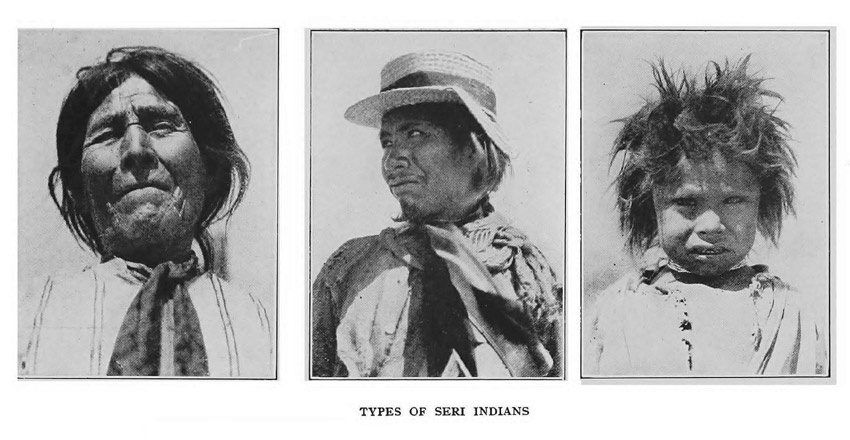

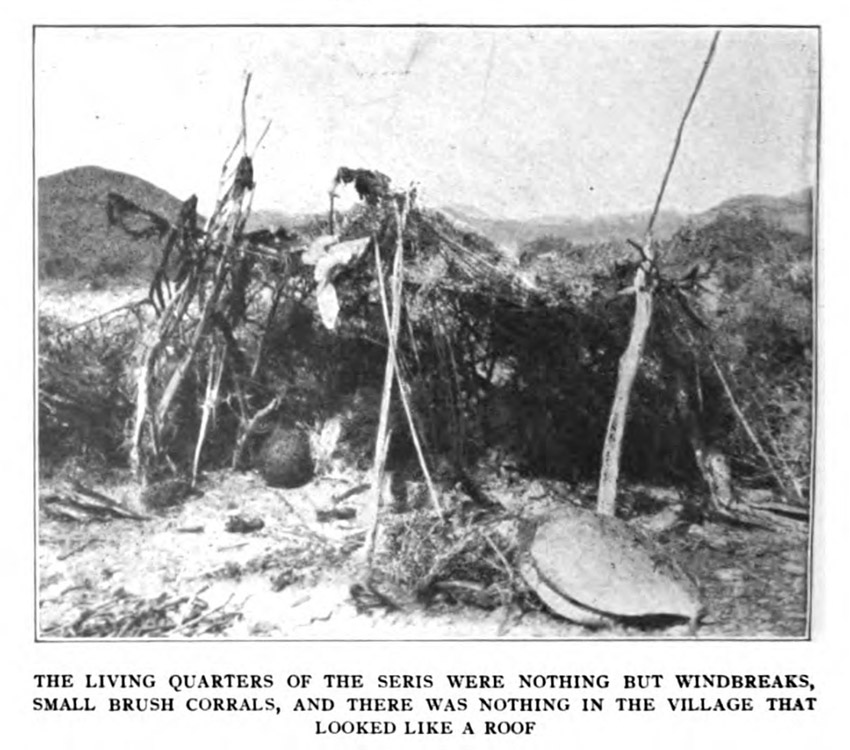
“Take our land,” said they. “We can’t exist under such a burden.”
But land was the last thing the government wanted. It began to compromise and, under threat of walking out, the property owners paid what they thought was right or could afford. This, of course, opened the way to unlimited graft, and was seized upon.
Having failed in these radical experiments, Mexico is now talking about restoring the seized lands to the original owners and reinstating them upon a productive basis, so that business and the flow of revenue will be resumed. When she does that, the circle will have been completed.
Doc and I hunted hard for those desert sheep, and I’ve no doubt we would have landed some had it not been for the fact that Carrots had tucked into our grub sack several cans of assorted fish. That tinned sea food spoiled the party. We were on short water rations, anyhow; whenever one of us glued his parched lips to a canteen, the others looked on like starving Armenians and prayed that he would break his arm—but when necessity forced us to partake of that salt-water product, our smoldering insides burst into flame. Mere ordinary, perishing thirst became a delightful memory; we quit looking for game and went hunting green maguey plants and the juicier varieties of cactus, such as the deer quench their thirst with.
Some of those cacti bore crops of what resembled huge luscious watermelons, others had canteloupes sitting on their tops, and of course that made it nice.
We breathed dust; we slept in the sand like lizards; we scrubbed our dishes in it until the grub pile disappeared; then we saddled up and hiked back for the coast. Even the animals speeded up.
It is not an unmitigated delight to ride a burro when it is in a hurry. Without warning, it bursts into a trot for a few mincing strides, then it slips into reverse, stops as if petrified and you kiss it between the ears.
We arrived at the bay late at night in the midst of a roaring sand storm, and made out the yacht veering drunkenly about at her anchorage as the gale boiled over the mountains and blew her this way and that. Carrots put off in the skiff to pick us up, but a gust caught him and spun him out into the gloom. We rid our mouths of burro hair and dust, and answered his mournful cries for help. It did not seem right, after all we had endured, that we should be deprived of Carrots and denied our vengeance for those cans of briny fish. When the wind shifted and whirled him into sight, we waded out to meet him, but before we could entwine our hungry fingers in his vermilion beard another squall bore him gyrating out into the bay. This time he broke an oar. It was too dark to see to shoot him, so we sat down and wept. We were strong men, but thought of this meeting had been like wine to us; we had reached the breaking point.
When he finally managed to scull in to the beach his arms were paralyzed; he could not even raise his hands in supplication, and—well, we lacked the heart to do away with him.
If in my story I appear to digress at times, if I deal idly in passing with things Mexican from big game to botany, from politics to canned fish, it is because the trip itself was a digression, an experiment in applied idleness, and one incident, one place, was about as diverting to us as another.
Before recrossing the gulf, a word more regarding that queer, little-known peninsula of Lower California which we were leaving. It is one of the last frontiers. It is a region at once amazingly fertile and as sterile as the moon, a land both rich in resource and readily accessible, and yet almost unpeopled and untouched. Mexico will not consent to sell it to us—talk along that line offends every instinct of the Mexican. Strategically, it would be a tremendous asset to the United States, and it would probably yield many products of great value, but further discussion of a purchase can serve only to inflame and antagonize—and international antagonisms we can very well do without for a while.
Angel de la Guardia Island lay just abreast of our anchorage, a vast, mountainous mass, as bare and infertile as the head of a sledge hammer, but we lacked time in which to explore it for that old paved road and the city of stone houses. Instead, we took advantage of the first decent day to run back across the gulf.
The gulf, at this point, is narrow and has been left in a wretched state of disrepair. It is all cluttered up with reefs and islets; vast piles of loose building material lie around, half or wholly submerged, and affording a menace to traffic. Worst of all, there is not even a red lantern out at night to warn a yacht of some detour.
We did not tell our pilot whither we were bound, else he would have gone to board with Maddone, for Tiburon is not a popular point of call, and local boatmen avoid it like the “flu.”
When he finally discovered that we were headed for the stamping grounds of the notorious Seris, he surrendered the wheel and disclaimed further responsibility for anything except his own safety. That he proposed to safeguard. He complained that Tiburon was his idea of no place to be after dark, and assured us that even the rent collector passed it up and the cops ignored it. In comparison with its inhabitants, the Yaquis were lovable, orderly people, and the electric chair was too good for any Seri. If we chose to go ashore there, we would part as friends, and there would be no hard feelings, but he would appreciate it if we would show him how to start the engine, as it was a long row home.
Salisbury had long since “sold” us this Seri proposition with his tales of their uncouth habits; it required no such boosting as this to further prejudice us in their favor. We had no particular fear of them, especially Crisp and I, for to anybody engaged in the motion-picture business, lack of refinement is nothing unusual. As a matter of fact, we had decided, if in truth these savages were cannibals, to purchase, hire, rent, lease, or steal a brace of the hungriest, bloodthirstiest man-eaters and take them back to Los Angeles with us. Crisp wanted his for an assistant director, and I proposed to feed mine on scenario writers. The eating of human flesh, the gnawing of human bones, is a reprehensible habit, no doubt, and should not be generally encouraged, but if it must be practiced, where better than in and around a studio?
But from our first examination of Tiburon Island, we began to doubt that these Seris were what they had been painted. The soil was poor, too poor to raise any kind of garden truck, and we reasoned that if, indeed, they were cannibals, it was purely because they were forced to subsist upon canned goods for want of fresh vegetables. Salisbury was positive, however—he knew them. He told about an expedition of newspaper men that had landed here years before and had disappeared, leaving nothing but well-picked femurs and tibias to indicate the manner of their taking-off. The pilot recounted the tale of some storm-bound fishermen who had met a similar fate but a short time before this. Crisp and I, therefore, did not despair.
But there were no Seris where we first went ashore. Doubtless the scarcity of visitors had forced them to move about in search of other fresh meat.
Before leaving home we had promised our wives that we would call upon these wild people, and, in order that we might prove that we had carried out our intention and had not spent our outing lolling in white flannels beneath the palms of some señorita-infested watering place, we made up Eddie and posed him beside the bleached carcass of a whale. It was a good idea, and a good background, and Eddie would have made a fairly convincing aborigine had he not insisted upon wearing his red-flannel undergarments. The resulting photograph might have got by at that, had we needed it, but, fortunately, we did not.
This was the spot where Salisbury had killed his seven deer with one round from his six-shooter; so we went hunting, despite the protests of our pilot. In fervent Spanish, he assured us that the place reeked of redskins, that hidden, hostile eyes were no doubt fixed upon us at that very moment, that unseen lips were smacking in moist anticipation of the fancy cuts and crown roasts into which we would subdivide. Our knowledge of the language was imperfect, but, with a fervor equal to his, we responded:
“Muy guano!” which we took to be the Spanish equivalent of “very good.”
Tiburon is a sure cure for buck fever. Never have I seen a deer country like it, except perhaps the plateau north of the Grand Cañon. The island where we landed was broken into many low hills separated by dry watercourses, with just sufficient brush in the arroyos to afford cover. The slopes were open, and they were crisscrossed by a very network of game trails worn deep into the flinty soil. Those trails led everywhere. It seemed impossible to walk a half mile without starting something, but it was not. Either the game lay close or at this season it was farther inland, but even so it was not long before the entertainment began.
Elmer and I topped a steep ridge, and as we stepped to the edge of the bluff a sudden movement below halted us. Out from the right and considerably below us burst a buck that looked as if he had a rocking-chair on his head. He was perhaps two hundred and fifty yards distant, and he made a spectacle. Nature’s knack for protective coloring is well illustrated in these burro-deer; in repose, they blend perfectly into the background. It is only while in motion that the eye readily picks them up, and this deer was certainly in motion. No deer of my acquaintance ever displayed more motion in the same length of time. He was headed across stage, but it was clear shooting, and I completely ruined his whole evening. I shot four times, and was rather surprised to find, when we got down to him, that I had hit him four times, twice within a hand’s breadth of the heart. It was lucky shooting, downhill at that distance and at his rate of speed.
He had looked small from the top of the hill, but after he was dressed, ready to pack out, he was the size of a horse.
Far be it from me to dispute Salisbury’s statement that some Tiburon deer will “dress” four hundred pounds. The head of this one, now that it is mounted, is so heavy I can’t get a spike strong enough to hang it on my wall.
After working another section, where we killed a couple more, we set out to find the Seri village.
These Seris were once a powerful tribe. Mexican history refers to battles between them and the Yaquis in which as many as ten thousand warriors on each side participated. But the Seris were defeated; they dwindled and decayed, and were finally pushed off the mainland to this island of ill repute, where the remnants of the tribe now live. In view of their diminishing numbers, we expected to find a village of physical wrecks, a handful of decrepits. But we were mistaken.
We skirted the island until, with the glasses, we made out a weather-beaten boat drawn up on the shore. Running closer in, we studied the place, but could detect no indication of a village or any sign of life. Salisbury, however, was positive.
“They’re probably hiding out,” said he.
Our pilot agreed. He hazarded the opinion that the merry villagers were doubtless out in the brush, hastily splitting kindling and filing their teeth in preparation for our landing.
Not until we came to anchor did we see a movement; then a solitary figure appeared. Soon another and another joined it, until there were half a dozen. Eventually they entered their boat and paddled out toward us. They were shy, distrustful at first, but when they recognized Salisbury they cackled like guinea fowl and closed in.
One’s first impression of these people is that they carry picturesqueness to the point of vice; not even in Greenwich Village can one find such extremes of eccentricity in dress and deportment. But as for being decrepit—Dempsey and Babe Ruth and Zbyszko are similar wrecks. They are so big they run six to the dozen; they have teeth like quartz mills, and enough hair to stuff a mattress.
They had brought along a woman and a baby, for fear, I suppose, that we might not treat them gently, but we felt no desire to play rough with those boys. They had on their sport clothes—all that was mortal of some garments Salisbury declared he had given them several years before—and were ready to indulge in any game we suggested, from pillow fighting to mayhem.
Ed beamed amiably upon them; he gesticulated hysterically and spilled disreputable Spanish, and they came back at him in kind. He was their friend, he said; he was glad to see them and to be once more in the bosom of the tribe. He had been long away, but his heart had hungered for Tiburon, and he had seen no people in any part of the world for whom he could cherish the same love and affection. Emotion choked him; he pressed the chief’s hand and smiled moistly into his eyes; he admired the baby and threatened to kiss the mother. Joy so heartfelt as his was touching; his voice wavered, broke. He turned to us, saying:
“Don’t let the damn thieves aboard or they’ll cut our throats.”
He had brought them gifts—oh, riches unimaginable!—the gleanings of his industrious voyages to far countries—not pungent spices and precious oils from the Indies, perhaps, but something better. Look! A half dozen standing collars, size seventeen and a half, and not badly soiled except along the edges; a straw hat with half a brim, and neckties of purest silk with bouillon polka dots. The chief annexed these offerings and grinned so pleasantly that our Mexican pilot shuddered and backed into the whistle cord.
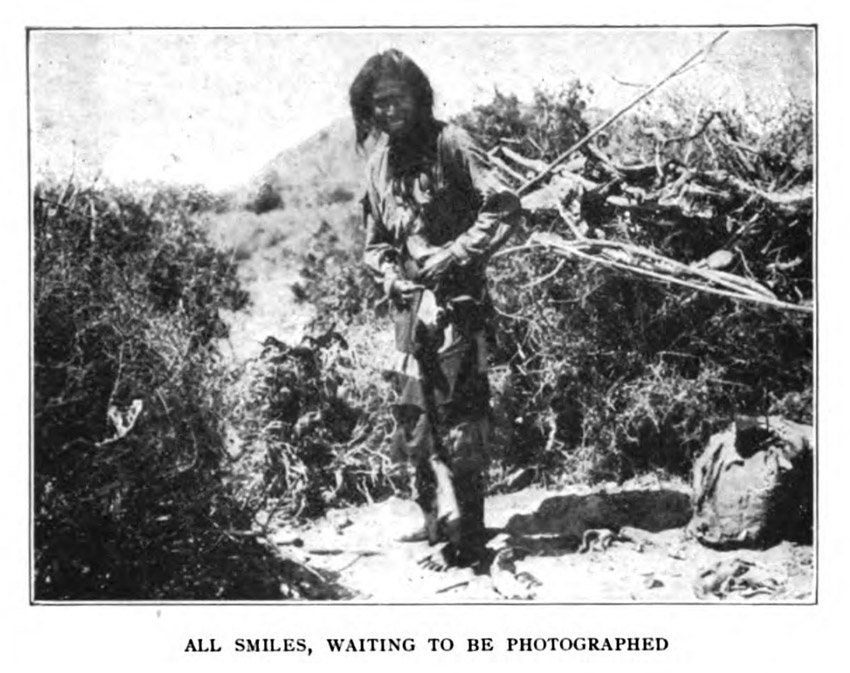

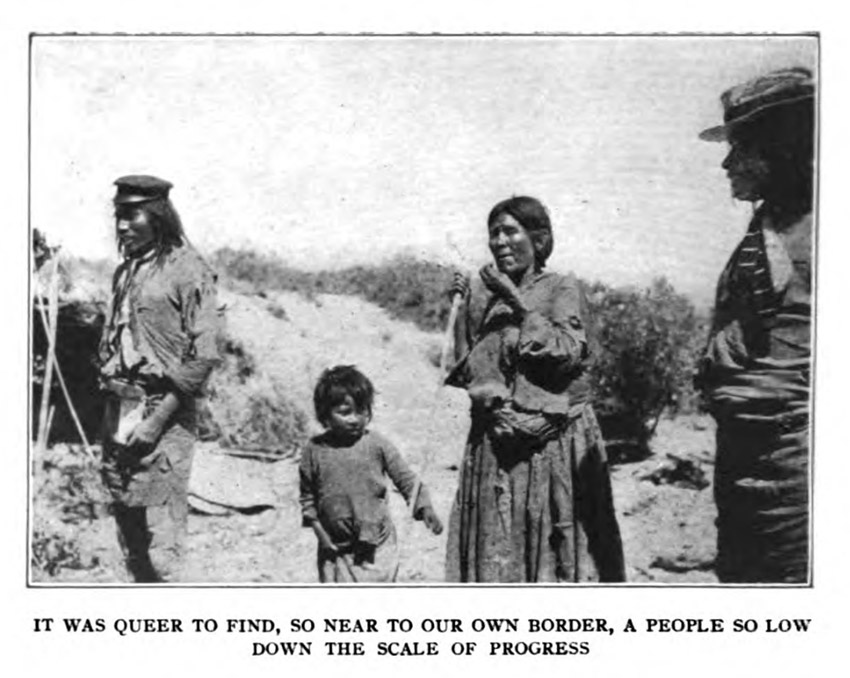
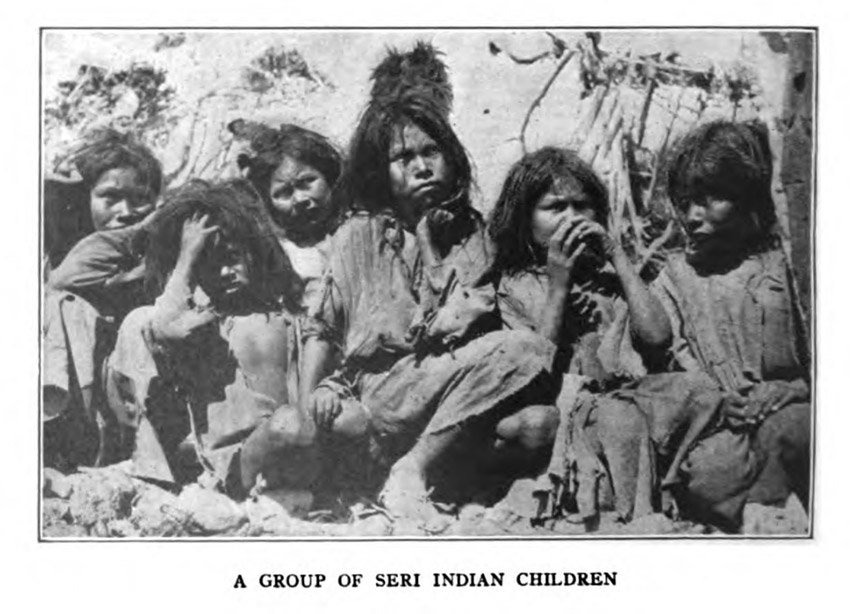
We showered presents upon our visitors, and practically everything we gave them they either ate or put on. When we signified that we were going ashore for a more intimate powwow, they shouted vociferously and stirred the water to foam in their eagerness to go and prepare for us.
Prompted by affection and respect, our native navigator made one last appeal. These were bad people, he declared. They would probably make drum heads of our hides, and how would we like to be served up with dumplings and have our jewelry worn by people like these? As individuals we meant nothing to him, but his friends in Guaymas would be bound to talk if he returned alone.
There were perhaps twenty Seris in sight when we put off in the skiff, and they came leaping across the rocky beach to welcome us. They dashed into the water, seized the boat and ran it ashore, then examined us with much interest. Meanwhile, over the brush-tops in all directions black heads with hair like horse tails were lifted; more tattered figures appeared and surrounded us.
Not all of them were as friendly as the first few. Some were merely sullen; others were almost openly hostile. I undertook to photograph one pair, but they pulled a couple of knives as long as a ship, so I canceled that sitting. More than once some coarse-fibered villager got insulting, despite the fact that there were ladies present. But we were armed and watchful, and on the whole they treated us as well as I would feel inclined to treat them if they descended upon my house in a body. Salisbury had assured us that they possessed no firearms; nevertheless, in exploring their living quarters we discovered that they were quite as well armed as we.
Those living quarters were nothing but windbreaks, small brush corrals, and there was nothing in the village that looked like a roof. As for food, the tribe lives altogether on shore dinners, with some occasional venison. It is probable that they cook some of their food, though not all, and meal time among them would not be pleasant for a civilized person. But as for being cannibals—the word is, of course, only a figure of speech. They are thoroughly lawless, and the stories of their evil deeds are probably true; doubtless they are as dishonest as some of our own citizens, but, all in all, they do not greatly differ from some of the foreigners in the crowded quarters of our great cities, and they smell very much the same.
It was queer to find, so near to our own border, a people so low down the scale of progress. They do not even appear to possess any of the customary Indian skill at handiwork. There were no baskets, no pottery, no cloth, no evidence of any sort of industry. Nevertheless, they were healthy, strapping, energetic individuals, and illustrated the agreeable theory that work is a luxury pure and simple. Doubtless the blood will run out before long, for there are but two villages left, and they number not more than two hundred souls.
In such a community as this it does not take long to see the sights. When they had taken all the gifts we offered and we had taken all the pictures we cared for, the afternoon began to drag, We did manage to get a little thrill after all of our party save Wilson, Crisp, and I had returned to the Par. While we three were waiting for the skiff to come back we noticed two or three of the more disorderly young bloods arming themselves. Covertly we watched them removing their hidden rifles and loading them; then, when they started toward the brush back of the village, we called the chief’s attention and told him by gesture and by facial contortions that this was no nice way to speed the departing guests. We were willing to speed, but whither? Our protests precipitated a scene. The chief managed to disarm one brave, but the others evaded him and made their get-away. When we discovered that the women and children were likewise disappearing, leaving us alone on the open beach, it seemed to us that we bulked as big and as conspicuous as three dead mules on a hot road, and we could not understand why the skiff was so slow in returning.
Salisbury, we discovered later, had been watching the scene through the glasses and had sounded a call to arms; but we were a quarter of a mile away and our attention was distracted.
Probably the whole thing was just an aborigine’s idea of a practical joke, but, be that as it may, I have no desire to again visit the Seris. I have had so much practice that I can tell nearly every time when I’m not wanted. A nice time was had by all, to be sure; but in view of the chill with which our actual departure was enveloped, I have lost interest in the spiritual progress or material good of those Indians. I hope Salisbury’s collars chafe them.
Salisbury’s sheep country lay to the north of Tiburon, but we had cruised seven hundred miles since leaving Guaymas and our gasoline was short. Another norther was blowing, too, and, inasmuch as some of our party had to get home, we reluctantly headed back.
As I write this there are items in the daily press about Mexico—a revival of resentment at fresh outrages in the Tampico and other districts, renewed mutterings about intervention. I cannot believe, in view of our past policy, that the United States will intervene—not, at least, with armed troops. I may be wrong—frequently I am. Even before this sees print, something may happen to draw our military forces across the border. But it is unlikely. It is doubtful, moreover, if that is the best way to pacify Mexico. Bullets would do it, but dollars would do it equally well, perhaps better. Mexico needs money. She is financially discredited; her obligations are unpaid; her industries are starving; she is bled white. She needs new blood, new life. I believe a half dozen of our strong bankers could restore law and order below the Rio Grande more quickly and more lastingly than an equal number of veteran overseas divisions. Given money to work with and given honest, wise men to handle the spending of that money, she can pacify her own rebellious elements, subdue her outlaws and Indians, and enjoy a general housecleaning. Whether she would tolerate American supervision of that sort, whether she would permit outsiders to step in and apply honest efficiency methods in her departments, is another matter. After talking with thoughtful students of the subject, I know there are some who believe she would—and if matters don’t mend she may have no choice. The idea is worth thinking about.
When she does find herself, when she becomes once more a safe and agreeable place in which to live and to do business, she will witness a boom like those of our early Western days, only magnified a hundredfold. She will once more become a land of promise and of plenty, for she is blessed with unrivaled riches and opportunities ample for her own and other peoples. God speed the day, for the world is waiting.

This site is full of FREE ebooks - Project Gutenberg Australia